855-997-4652 Login Try a Free Class

100+ Spanish Travel Vocabulary Words for Latin America
If you plan to visit Latin America on vacation, knowing Spanish travel vocabulary is essential to make your experience safe, smooth, and pleasant.
Latin American Spanish is rich and diverse. While there’s a lot of regionalismo (regional vocabulary) in Latin America, many words are considered neutral, meaning almost everyone understands them, and they make communication easier.
Read this blog post to discover a ton of Spanish travel vocabulary words to use on your next visit and learn to talk about your vacation in Spanish like a pro!
Important Spanish Travel Vocabulary
Looking for a trusted source for words to use on your next visit to the beautiful lands of Latin America? This vocabulary lesson is divided into categories to give you easy access to the basic Spanish travel vocabulary words you need to know.
Documentos Para Viajar (Travel Documentation)
In order to travel, you need some important documentation to assure your safety and access to the place you want to go. In some countries, you simply need a passport to enter, while in others require a visa to gain access.
To learn what these documents, preparations, and requirements are called in Spanish, check out the following vocabulary list:
Instalaciones de Viaje (Traveling Facilities)
Now that you have all your paperwork in order, it’s time to learn about the places you’ll pass through while traveling to your destination!
Transporte (Transport)
There are several ways you can reach your destiny while traveling in Latin America. The mode of transportation may be terrestre (terrestrial), marítimo (marine), or aéreo (aerial).
Example Sentences
Want to know how to use these words to talk about your experience while traveling or asking about them in Spanish? Here are some examples!
El tuc-tuc es un medio de transporte barato. The auto rickshaw is a cheap mode of transportation.
Cuando estés en Buenos Aires es buena idea que uses el metro. When you are in Buenos Aires, it is a good idea to use the subway.
Del aeropuerto nos llevaron en bus al muelle donde abordamos el crucero. From the airport, they took us by bus to the dock where we boarded the cruise ship.
El Uber nos cobró más barato que un taxi. The Uber charged us less than a taxi.
¡Paseamos por el Lago de Atitlán en una lancha que iba muy rápido! We rode around Lake Atitlan in a boat that went very fast!
¿Cuánto cuesta el pasaje? How much is the ticket?
Por favor, den lugar a que entre más pasajeros. Please allow more passengers to enter.
Asegurate de tomar el bus en el horario que funciona. Be sure to take the bus in the schedule it works.
¿Me daría jalón? Can I catch a ride with you?
No se pare en el bote cuando este se esté moviendo. Don’t stand up in the boat while it is moving around.
Aborde el tren de forma rápida. Board the train quickly.
Practice makes perfect, and a great way to review and practice what you’re learning is through worksheets! Download this PDF with a fun travel vocabulary crossword about transport to solidify your newly acquired knowledge!
Download FREE Travel Vocabulary Words Crossword Puzzle!
Type your name and email below to get a free crossword puzzle about travel vocabulary words to practice your new vocabulary!
Alojamiento (Lodging)
Now that you know what you need in preparation to travel, and how you are getting to your destination, it’s time to think about el alojamiento , or lodging.
Lugares turísticos (Tourist Sites)
Once you are settled into a place to stay, check out the lugares turísticos (tourist sites) you want to visit. The following Spanish travel vocabulary list includes some general places that you can find throughout Latin America when you visit.
Verbs
You can’t travel to Latin America without knowing Spanish travel verbs. They’re one of the most important elements of Spanish travel vocabulary when talking about your vacation in Spanish!
Me encantó relajarme en el hotel. I loved relaxing at the hotel.
Al momento de registrarme me dieron mi llave de habitación. At the check-in they gave me my room key.
Me gustó ir a parrandear con mis amigos. I liked to go to parties with my friends.
Es recomendable reservar una mesa en el restaurante del hotel. It is recommended to reserve a table at the hotel restaurant.
Alquilar un auto siempre es buena idea si te gusta moverte con libertad. Renting a car is a good idea if you like to move freely.
Common Phrases to Make Travel Easier
It never hurts to know some basic Spanish travel phrases to add to your vocabulary.
En el aeropuerto – At the Airport
Su pasaporte y boleto, por favor. Your passport and boarding pass, please.
¿A dónde se dirige? Where are you going?
¿Cuál es el motivo de su visita? What is the reason for your visit?
¿Dónde está la puerta de abordaje? Where is the boarding gate?
Por favor, tome su equipaje de la cinta. Please take your luggage from the carousel.
En el hotel – At the Hotel
¡Hola! ¿Podría ayudarme a registrarme? Hi! Can you help me with the check-in?
Servicio a la habitación, por favor. Room service, please.
¿Puede darme otra toalla? Can you give me another towel?
¿Se puede usar la piscina? Can I use the pool?
¿Podría llamarme a un taxi? Can you call me a cab?
En un restaurante – In a Restaurant
¿Podría traerme la carta? Could you please bring me the menu?
Me gustaría tomar… I would like to drink…
¿Quieres algo para comer? Do you want something to eat?
¿Tiene comida vegana? Do you have vegan food?
Disculpe, soy alérgica/o a ________. ¿La comida incluye ese ingrediente? Excuse me, I am allergic to _______. Does the food include this ingredient?
De Vacaciones – On Vacation
Disculpe, ¿qué tan lejos está la playa? Excuse me, how far is the beach?
¿Cuanto es el tipo de cambio hoy? How much is the exchange rate today?
¿Puedo cargar mi teléfono aquí? Can I charge my phone here?
¿Usted habla inglés? Do you speak English?
Lo siento, no hablo español . Sorry, I don´t speak Spanish
¿Aceptan dolares? Do you accept dollars?
¿Cuanto cuesta? How much is it?
¿Cuanto es lo menos? What is your best price?
Spanish Travel Vocabulary Quiz
Let’s practice what we learned today! Choose the correct answer to the following questions:
1. Where do you take the airplane?
2. what should you do to have money for the place you visit, 3. you can use them to ask for a favor, 4. you need this to enter some countries, 5. what is the name of the places you and other tourists visit, 6. you board them when going on vacation at the sea, 7. is recommended you get a copy of these in your luggage in case you miss them, 8. you can go to this place in case of an emergency or sickness., 9. you need to do this to assure the host you are going to stay in their hotel., 10. is a place where you pay to sleep and have breakfast., practice your spanish travel vocabulary.
Is never too early or late to learn Spanish vocabulary words to travel around Latin America and communicate freely with the locals. Sign up for a free class to practice your travel phrases with a certified, native Spanish-speaking professional who can help you prepare for the best trip of your life. Visit the breathtaking places throughout Latin America and share memories with your loved ones! What are you waiting for?
Ready to learn more Spanish vocabulary? Check these out!
- Earth Day Projects for Kids + Spanish Earth Day Vocabulary
- How to Talk About the Temperature in Spanish: Fahrenheit, Celcius, and Descriptions
- Car Parts Spanish Vocabulary List: Learn Using Pictures
- Top 15 New Year’s Resolutions in Spanish
- Talk About Hurricanes And The Weather in Spanish
- Spanish Words with Multiple Meanings in Latin America
- World Mental Health Day: A Vocabulary Guide for Mental Health Workers
- Expressing Appreciation in Spanish on World Teachers’ Day
- Recent Posts
- An Easy Vocabulary Guide to Describe the Post Office in Spanish - February 10, 2023
- Guatemala’s Biggest, Most Colorful Market: Chichicastenango - December 28, 2022
- 8 Sad Spanish Songs for When Your Heart Is Broken - December 6, 2022
Related Posts
45+ mission trip spanish phrases you need to know, 44 essential spanish quotes and proverbs to fuel your motivation, spanish body parts: vocabulary, idioms, and culture, spanish 101: greetings and farewells, leave a comment cancel reply.
Your email address will not be published. Required fields are marked *
- Skip to primary navigation
- Skip to main content
- Skip to primary sidebar
- Skip to footer
StoryLearning
Learn A Language Through Stories
67 Essential Spanish Travel Phrases Every Traveller Needs To Know
Spain. Mexico. Argentina. Peru. Colombia.
If you're learning Spanish , the mere the mention of these countries can leave you daydreaming about your next trip abroad.
And although there are many incredible things to do and see in Spanish-speaking countries, what really makes these places special are the local people.
So before you pack your bags and jump on a plane, why not learn a little Spanish to help you make the most of your trip?
In this post, you’ll learn 67 Spanish phrases for travel that can help you survive in the language during your trip abroad. And who knows, they might even help you make a few new friends too!
To make it easier for you, I’ve divided the phrases up into different categories:
Table of Contents
Take the time to learn a few of these key Spanish travel phrases and you’ll be able to mix with the locals, get by in various situations and have a much more enjoyable and authentic experience during your trip.
By the way, if you want to learn Spanish in time for your trip, my top recommendation for language learners is my Uncovered courses, which teach you through StoryLearning®. Click here to find out more and try out the method for free.
Press play on the video below to learn Spanish travel phrases thanks to a story. Otherwise, keep scrolling to discover all 67 Spanish travel words and expressions.
First Things First: Greetings To Use On Arrival
Knowing how to greet people is the most basic thing you can learn in a foreign language. And yet its importance shouldn't be underestimated.
Even if you aren’t fluent enough to hold a long conversation, a simple ¡Hola! ¿Qué tal? (Hello, how are you?) can make all the difference.
You'll be able to use these expressions as soon as you arrive at your destination, whether it's at the airport, the train or bus station, or the hotel.
People appreciate it if you make an effort to speak their language when you visit their country, even if it’s only a few words.
Spanish-speaking countries are especially polite and greeting people correctly will go a long way towards endearing you to the locals, be they friends, people you meet in shops or on the street.
- ( BWAY-nos DEE-as)
- (BWAY-nas TAR-des)
- (BWAY-nas NOH-chays)
- (KOH-moh eh-STAH)
- (KOH-moh eh-STAHS)
- (bee-EN GRA-thee-as [Spain] / GRA-see-as [Latin America])
- (KOH-moh te YA-mas?)
- (May YA-moh… )
- (MOO-choh GOO-stoh)
And of course, let’s not forget common courtesy!
- (por fa-BOR)
- (GRA-thee-as [Spain] / GRA-see-as [Latin America])
If you get stuck in your Spanish conversation, you can always fall back on these next two phrases to get you out of trouble.
- (yo no en-tee-EN-doh)
- (Ab-la in-GLAYS)
Get What You Want On Your Trip With The Verb Querer
Once you’ve finished greeting someone, you’ll need to be able to move on to the crux of your conversation and to do that you’ll need to learn a couple of common verbs.
There are hundreds of Spanish verbs to learn and, to make your life more difficult, these verbs conjugate (change form).
This means learning a verb is never as simple as learning one word; you have to learn multiple different forms.
Having said that, you might be surprised by how far you can get only knowing one simple verb: I want .
It may not make you the most sophisticated Spanish speaker but 9 times out of 10 it will get you what you, well, want .
The verb in question is querer (to want) and in the first person form, it becomes quiero (I want).
Let’s take a look at how you can use it:
- (yo kee-EH-ro oon me-NOO)
- (YO kee-EH-ro oon taxi)
- (yo kee-EH-ro OO-na ser-BAY-za)
If you’d like to be a bit more polite (which is usually a good idea), you can also use:
- (kee-see-EH-ra…)
Asking For & Understanding Directions On Your Trip
Whether you’re looking for the toilet in a restaurant or trying to find a hotel to stay at, you’ll inevitably need to ask for directions at some point during your trip.
The simplest way to ask where something is, is to use ¿Dónde está? followed by the noun you are looking for:
- (DON-day es-TAH el BAH-nyo?)
- (DON-day es-TAH el BAN-koh?)
- (DON-day es-TAH la KA-yay de al-cal-AH?)
When travelling in a foreign country, if you're asking someone on the street for directions, don’t forget your manners! To get someone’s attention, start by saying:
- (Dis-KUL-pay)
- (Con per-MEE-soh / Per-DOH-nah-may)
- (eh- stoy per-DEE-doh)
Asking for directions is one thing but it’s pretty pointless if you don’t know how to understand the directions that are given to you!
Memorise these phrases to help you understand what the friendly locals are trying to tell you when you ask for their help:
- (A la de-RE-cha)
- (A la iz-kee-ER-da)
- (De-RE-cho)
- (En la es-KEE-nah)
- (a OO-na KWAD-rah)
Getting Around Spanish-Speaking Countries
If you’re not keen on walking everywhere, you'll need to be able to find out about local transport options to find your way around wherever you are.
Here are a few simple phrases you can use to locate a bus, train or taxi and get to wherever you need to go:
- (DON-day PWAY-doh en-kon-TRAR oon taxi?)
- (DON-day eh-STAH la pa-RAH-dah de ow-to-BOOS mas ser-KA-nah?)
- (DON-day eh-STAH la es-tah-see-ON de ferro-carr-EEL mas ser-KA-nah?)
- (KWAN-to KWES-ta oon bee-YET-ay PA-ra …)
- (oon bee-YET-ay PA-ra … por fa-BOR)
At A Restaurant On Your Travels
Each Spanish-speaking country has its own unique flavours and cuisine for you to try when you travel!
Food is definitely one of the big attractions to cities like San Sebastian in Spain and Buenos Aires in Argentina , so you'll need to make sure you have a basic grasp of food vocabulary ahead of your journey!
To start with, you need to be prepared to hear and understand certain questions in restaurants, such as:
- (kee-EH-res AL-go PA-ra koh-MER?)
- (kee-EH-res AL-go PA-ra beh-BER?)
- (KAY kee-EH-res koh-MER?)
When you read the menu, you'll see the available food grouped into different categories, just like in an English menu:
- (oo-na en-TRA-da)
- (oon PLA-toh prin-si-PAL)
- (oon POS-tray)
- (OO-na beh-BEE-da)
When you're ready to order, use either quiero (I want) or quisiera (I would like) with the items on the menu to tell the waiter what you'd like. For example, quiero…
- (OO-na SOH-pah)
- (OO-na en-sa-LA-da)
- (el POY-oh)
- (la CAR-nay)
- (oon AG-wa)
- (oon BEE-noh TIN-toh / BLAN-koh)
- (OO-na ser-BAY-sa)
- (oon ka-FAY)
So, for example, to order that ice-cold beer you're looking forward to at the end of a long day, you'd say quiero una cerveza.
If you're not sure what to try, you can always ask your waiter for a recommendation:
- (kay may re-kom-ee-EN-dah?)
In most restaurants in Spanish-speaking countries, the staff will be more than happy to suggest a particularly tasty local dish for you to try.
If you're a vegetarian or you have dietary complications, these next two phrases are essential:
- (soy be-he-tah-ree-AH-noh/nah)
- (TEN-go al-ER-hee-ah a las noo-EH-ses)
Finally, let's learn a couple of quick phrases you can use to ask about prices and pay the bill.
- (KWAN-to KWES-ta? )
- (la KWEN-ta por fa-BOR)
Key Spanish Question Words For Your Trip
Over the course of your journey, you'll almost certainly find yourself asking lots and lots of questions.
You might not have a huge Spanish vocabulary to draw on, but if you know the basic question words, you'll be able to get by in almost any common situation you might find yourself in.
Here are some key Spanish question words you need to know:
- (KWAN-doh?)
- (A kay AW-ra?)
- (KWAN-toh?)
- (KWAN-tohs)
- (kah-dah KWAN-toh?)
- (por KWAN-toh tee-EM-poh)
Once you’ve got these question words in your memory bank you’ll start noticing the patterns in Spanish grammar which will help you to move away from the basic Spanish phrases every tourist is using.
As you learn new words on your trip, you'll be able to combine them with these question words to start forming your own sentences and questions!
Get Ready For Adventure With These Spanish Travel Phrases!
Take the time to memorise these key Spanish travel phrases and you'll have everything you need to get the most out of your journey.
With just a few words of Spanish, I'm sure you'll meet lots of amazing people and have plenty of life-changing experiences along the way.
Who knows, perhaps spending some time visiting a Spanish-speaking country will motivate you to strive for fluency?
If this article has inspired you to both travel and to learn Spanish, then I've got something to get you started on your Spanish learning journey.
I'm a big believer in the power of story to enable you to learn a language. That's why I've created an entire beginner course dedicated to learning Spanish by immersing yourself in an engaging story.
It's my Spanish Uncovered course, and it's designed to take you from beginner to B1 Intermediate level.
Click here for more information on the course, test it out for free and to find out how it'll help you.
Language Courses
- Language Blog
- Testimonials
- Meet Our Team
- Media & Press
Download this article as a FREE PDF ?
What is your current level in Swedish?
Perfect! You’ve now got access to my most effective [level] Swedish tips…
Where shall I send the tips and your PDF?
We will protect your data in accordance with our data policy.
What is your current level in Danish?
Perfect! You’ve now got access to my most effective [level] Danish tips…
NOT INTERESTED?
What can we do better? If I could make something to help you right now, w hat would it be?
Which language are you learning?
What is your current level in [language] ?
Perfect! You’ve now got access to my most effective [level] [language] tips, PLUS your free StoryLearning Kit…
Where shall I send them?
Download this article as a FREE PDF?
Great! Where shall I send my best online teaching tips and your PDF?
Download this article as a FREE PDF ?
What is your current level in Arabic?
Perfect! You’ve now got access to my most effective [level] Arabic tips…
FREE StoryLearning Kit!
Join my email newsletter and get FREE access to your StoryLearning Kit — discover how to learn languages through the power of story!
Download a FREE Story in Japanese!
Enter your email address below to get a FREE short story in Japanese and start learning Japanese quickly and naturally with my StoryLearning® method!
What is your current level in Japanese?
Perfect! You’ve now got access to the Japanese StoryLearning® Pack …
Where shall I send your download link?
Download Your FREE Natural Japanese Grammar Pack
Enter your email address below to get free access to my Natural Japanese Grammar Pack and learn to internalise Japanese grammar quickly and naturally through stories.
Perfect! You’ve now got access to the Natural Japanese Grammar Pack …
What is your current level in Portuguese?
Perfect! You’ve now got access to the Natural Portuguese Grammar Pack …
What is your current level in German?
Perfect! You’ve now got access to the Natural German Grammar Pack …
Train as an Online Language Teacher and Earn from Home
The next cohort of my Certificate of Online Language Teaching will open soon. Join the waiting list, and we’ll notify you as soon as enrolment is open!
Perfect! You’ve now got access to my most effective [level] Portuguese tips…
What is your current level in Turkish?
Perfect! You’ve now got access to my most effective [level] Turkish tips…
What is your current level in French?
Perfect! You’ve now got access to the French Vocab Power Pack …
What is your current level in Italian?
Perfect! You’ve now got access to the Italian Vocab Power Pack …
Perfect! You’ve now got access to the German Vocab Power Pack …
Perfect! You’ve now got access to the Japanese Vocab Power Pack …
Download Your FREE Japanese Vocab Power Pack
Enter your email address below to get free access to my Japanese Vocab Power Pack and learn essential Japanese words and phrases quickly and naturally. (ALL levels!)
Download Your FREE German Vocab Power Pack

Enter your email address below to get free access to my German Vocab Power Pack and learn essential German words and phrases quickly and naturally. (ALL levels!)
Download Your FREE Italian Vocab Power Pack
Enter your email address below to get free access to my Italian Vocab Power Pack and learn essential Italian words and phrases quickly and naturally. (ALL levels!)
Download Your FREE French Vocab Power Pack
Enter your email address below to get free access to my French Vocab Power Pack and learn essential French words and phrases quickly and naturally. (ALL levels!)
Perfect! You’ve now got access to the Portuguese StoryLearning® Pack …
What is your current level in Russian?
Perfect! You’ve now got access to the Natural Russian Grammar Pack …
Perfect! You’ve now got access to the Russian StoryLearning® Pack …
Perfect! You’ve now got access to the Italian StoryLearning® Pack …
Perfect! You’ve now got access to the Natural Italian Grammar Pack …
Perfect! You’ve now got access to the French StoryLearning® Pack …
Perfect! You’ve now got access to the Natural French Grammar Pack …
What is your current level in Spanish?
Perfect! You’ve now got access to the Spanish Vocab Power Pack …
Perfect! You’ve now got access to the Natural Spanish Grammar Pack …
Perfect! You’ve now got access to the Spanish StoryLearning® Pack …
Where shall I send them?
What is your current level in Korean?
Perfect! You’ve now got access to my most effective [level] Korean tips…
Perfect! You’ve now got access to my most effective [level] Russian tips…
Perfect! You’ve now got access to my most effective [level] Japanese tips…
What is your current level in Chinese?
Perfect! You’ve now got access to my most effective [level] Chinese tips…
Perfect! You’ve now got access to my most effective [level] Spanish tips…
Perfect! You’ve now got access to my most effective [level] Italian tips…
Perfect! You’ve now got access to my most effective [level] French tips…
Perfect! You’ve now got access to my most effective [level] German tips…
Download Your FREE Natural Portuguese Grammar Pack
Enter your email address below to get free access to my Natural Portuguese Grammar Pack and learn to internalise Portuguese grammar quickly and naturally through stories.
Download Your FREE Natural Russian Grammar Pack
Enter your email address below to get free access to my Natural Russian Grammar Pack and learn to internalise Russian grammar quickly and naturally through stories.
Download Your FREE Natural German Grammar Pack
Enter your email address below to get free access to my Natural German Grammar Pack and learn to internalise German grammar quickly and naturally through stories.
Download Your FREE Natural French Grammar Pack
Enter your email address below to get free access to my Natural French Grammar Pack and learn to internalise French grammar quickly and naturally through stories.
Download Your FREE Natural Italian Grammar Pack
Enter your email address below to get free access to my Natural Italian Grammar Pack and learn to internalise Italian grammar quickly and naturally through stories.
Download a FREE Story in Portuguese!

Enter your email address below to get a FREE short story in Brazilian Portuguese and start learning Portuguese quickly and naturally with my StoryLearning® method!
Download a FREE Story in Russian!
Enter your email address below to get a FREE short story in Russian and start learning Russian quickly and naturally with my StoryLearning® method!
Download a FREE Story in German!
Enter your email address below to get a FREE short story in German and start learning German quickly and naturally with my StoryLearning® method!
Perfect! You’ve now got access to the German StoryLearning® Pack …
Download a FREE Story in Italian!
Enter your email address below to get a FREE short story in Italian and start learning Italian quickly and naturally with my StoryLearning® method!
Download a FREE Story in French!

Enter your email address below to get a FREE short story in French and start learning French quickly and naturally with my StoryLearning® method!
Download a FREE Story in Spanish!
Enter your email address below to get a FREE short story in Spanish and start learning Spanish quickly and naturally with my StoryLearning® method!
FREE Download:
The rules of language learning.

Enter your email address below to get free access to my Rules of Language Learning and discover 25 “rules” to learn a new language quickly and naturally through stories.
What can we do better ? If I could make something to help you right now, w hat would it be?
What is your current level in [language]?
Perfect! You’ve now got access to my most effective [level] [language] tips…
Download Your FREE Spanish Vocab Power Pack

Enter your email address below to get free access to my Spanish Vocab Power Pack and learn essential Spanish words and phrases quickly and naturally. (ALL levels!)
Download Your FREE Natural Spanish Grammar Pack
Enter your email address below to get free access to my Natural Spanish Grammar Pack and learn to internalise Spanish grammar quickly and naturally through stories.
Free Step-By-Step Guide:
How to generate a full-time income from home with your English… even with ZERO previous teaching experience.
What is your current level in Thai?
Perfect! You’ve now got access to my most effective [level] Thai tips…
What is your current level in Cantonese?
Perfect! You’ve now got access to my most effective [level] Cantonese tips…
Steal My Method?
I’ve written some simple emails explaining the techniques I’ve used to learn 8 languages…
I want to be skipped!
I’m the lead capture, man!
Join 84,574 other language learners getting StoryLearning tips by email…
“After I started to use your ideas, I learn better, for longer, with more passion. Thanks for the life-change!” – Dallas Nesbit
Perfect! You’ve now got access to my most effective [level] [language] tips…
Perfect! You’ve now got access to my most effective [level] [language] tips…
Join 122,238 other language learners getting StoryLearning tips by email…
Find the perfect language course for you.
Looking for world-class training material to help you make a breakthrough in your language learning?
Click ‘start now’ and complete this short survey to find the perfect course for you!
Do you like the idea of learning through story?
Do you want…?

Spanish School in Mexico City

Spanish Travel Vocabulary: +50 Essential Words and Phrases for Your Next Trip
Are you planning a trip to a Spanish-speaking country like Mexico? Whether it’s for business or pleasure, knowing some basic Spanish travel vocabulary can go a long way in making your trip more enjoyable. From ordering food to asking for directions, having a few key phrases in your back pocket can help you navigate your way through any situation where you might need to speak Spanish.
Table of Contents
One of the most important phrases to know when traveling in a Spanish-speaking country is “¿Dónde está…?” This means “Where is…?” and can be used to ask for directions to a specific location, such as a restaurant, museum, or hotel. Another useful phrase is “Quiero reservar una habitación” which means “I want to book a room.” This can come in handy when you arrive at your destination and need to find accommodations.

Other essential Spanish travel vocabulary includes ordering food and drinks at restaurants or coffeshops. “La cuenta, por favor” means “The bill, please” and is a polite way to ask for your check at a restaurant. “Una cerveza, por favor” means “A beer, please” and is a simple way to order a drink. With a few basic phrases under your belt, you’ll be able to communicate more effectively and make the most of your trip to a Spanish-speaking country.
Basic Spanish Greetings
Hola and buenos días.
If you want to greet someone in Spanish , the most basic way to do it is by saying “Hola” or “Buenos Días”. “Hola” is equivalent to “Hello” in English, and “Buenos Días” means “Good Morning”. You can use these greetings at any time of the day, but “Buenos Días” is only appropriate to use in the morning.

Mucho Gusto and ¿Cómo Te Llamas?
When meeting someone new, it’s polite to introduce yourself and ask for their name. In Spanish, you can say “Mucho Gusto” which means “Nice to meet you”. After that, you can ask “¿Cómo te llamas?” which means “What’s your name?”.
¿Cómo Estás? and ¿Cómo Está?
If you want to ask someone how they are doing, you can say “¿Cómo estás?” if you are talking to someone familiar or “¿Cómo está?” if you are talking to someone more formal or older than you. Both of these phrases mean “How are you?”.
Remember that in Spanish, it’s common to use greetings and small talk before getting into the main topic of the conversation. Using these basic greetings can help you make a good first impression and show that you are friendly and polite.
- Use “Hola” or “Buenos Días” to greet someone.
- Say “Mucho Gusto” to introduce yourself.
- Ask “¿Cómo te llamas?” to ask for someone’s name.
- Use “¿Cómo estás?” or “¿Cómo está?” to ask how someone is doing.
Essential Spanish Travel Phrases
When traveling to a Spanish-speaking country, it’s always helpful to know some basic phrases to make your trip smoother. Here are some essential Spanish travel phrases to get you started.
Por Favor and Gracias
“Por favor” means “please” and “gracias” means “thank you.” These two phrases are essential when interacting with locals in Spanish-speaking countries. Here are some examples of when to use them:
- When ordering food: “Quisiera una mesa para dos, por favor” (I would like a table for two, please).
- When asking for directions: “¿Podría decirme cómo llegar al museo, por favor?” (Could you tell me how to get to the museum, please?).
- When receiving help: “¡Muchas gracias por su ayuda!” (Thank you very much for your help!).

Estoy Perdido and ¿Habla Inglés?
“Estoy perdido” means “I am lost” and “¿Habla Inglés?” means “Do you speak English?” These phrases can be especially useful when navigating a new city or asking for directions. Here are some examples:
- “Perdón, estoy perdido. ¿Podría ayudarme a encontrar la calle X?” (Excuse me, I am lost. Could you help me find X street?)
- “¿Habla Inglés? No hablo mucho español” (Do you speak English? I don’t speak much Spanish).
Quisiera and Aquí
“Quisiera” means “I would like” and “aquí” means “here.” These phrases can be useful when ordering food or making purchases. Here are some examples:
- “Quisiera un café con leche, por favor” (I would like a latte, please).
- “¿Tiene este suéter en mi talla? Quisiera probármelo” (Do you have this sweater in my size? I would like to try it on).
- “¿Cuánto cuesta este recuerdo aquí?” (How much does this souvenir cost here?).
By learning these essential Spanish travel phrases, you’ll be able to communicate more effectively with locals and make the most of your trip.
Spanish Vocabulary for Transportation
When traveling to a Spanish-speaking country, it’s important to know some basic transportation vocabulary to get around easily. Here are some common Spanish words and phrases related to transportation.
Airport and Airplane
If you’re flying to your destination, you’ll want to know some airport and airplane vocabulary.

- El aeropuerto – airport
- El avión – airplane
- El vuelo – flight
- La terminal – terminal
- El mostrador de facturación – check-in counter
- La puerta de embarque – boarding gate
- El equipaje – luggage
- La maleta – suitcase
- El control de seguridad – security checkpoint
Train and Bus
If you’re traveling by train or bus, you’ll need to know some vocabulary related to stations and schedules.

- El tren – train
- El autobús – bus
- La estación – station
- El horario – schedule
- El billete – ticket
- El andén – platform
- El tren de cercanías – commuter train
- El autobús urbano – city bus
Taxi and Uber
If you prefer to take a taxi or Uber , here are some useful words and phrases.

- El taxi – taxi
- El conductor – driver
- La tarifa – fare
- El taxímetro – meter
- La dirección – address
- El destino – destination
- El punto de recogida – pick-up point
- El número de teléfono del taxi – taxi phone number
Remember, knowing some basic Spanish transportation vocabulary can make your trip much easier and less stressful. So, whether you’re taking a plane, train, bus, taxi, or Uber, be sure to brush up on your vocabulary before you go.
Spanish Travel Vocabulary for Accommodation
Hotel and hostel.
If you’re planning a trip to Latam, you’ll need to know some basic Spanish vocabulary for accommodation. Whether you’re staying in a hotel or a hostel, it’s important to be able to communicate with the staff. Here are some key phrases to help you out:

If you’re staying in a hostel, you’ll want to know some additional vocabulary:
Inn and Room
If you’re looking for a more traditional Spanish accommodation experience, you might want to stay in an inn. Here are some phrases that will be helpful when communicating with the staff:
No matter where you stay, it’s always a good idea to learn some basic Spanish phrases to help you communicate with the locals. With these vocabulary words, you’ll be able to navigate the Spanish accommodation scene with ease.
Spanish Vocabulary for Dining
When traveling to a Spanish-speaking country, it’s important to know some basic Spanish vocabulary for dining. Here are some essential words and phrases that will help you navigate menus and order food with ease.

Restaurant and Menu
- Restaurante – restaurant
- Menú – menu
- Carta – menu (also means “letter” or “card”)
- Plato del día – dish of the day
- Especialidades de la casa – house specialties
- Entradas – appetizers
- Platos principales – main courses
- Postres – desserts
- Cuenta – bill
When you enter a restaurant, it’s common to be greeted with “¡Buenas tardes!” (good afternoon) or “¡Buenas noches!” (good evening). If you’re not sure what to order, you can ask the waiter or waitress “¿Qué me recomienda?” (What do you recommend?) or “¿Cuál es el plato del día?” (What’s the dish of the day?).
Beer and Breakfast

- Cerveza – beer
- Tinto de verano – summer red wine (a popular Spanish drink)
- Café – coffee
- Té – tea
- Zumo – juice
- Pan tostado – toast
- Huevos revueltos – scrambled eggs
- Tortilla española – Spanish omelet (made with potatoes and onions)
- Churros con chocolate – fried dough pastry with chocolate sauce (a popular breakfast treat)
In Spain, it’s common to have a light breakfast of coffee and toast or a more substantial breakfast of eggs or a Spanish omelet. Churros con chocolate is a popular breakfast treat that’s also enjoyed as a snack or dessert. In Mexico you can order some “chilaquiles” with eggs.
Now that you have some basic Spanish vocabulary for dining, you can confidently order food and drinks at restaurants in Spanish-speaking countries. ¡Buen provecho! (Enjoy your meal!)
Spanish Vocabulary for Shopping
When traveling to a Spanish-speaking country, it’s important to know some basic vocabulary for shopping. Here are some useful words and phrases to help you navigate your way through the mall, market, supermarket, and bank.

Mall and Market
- Centro comercial – Mall
- Tienda – Store
- Escaparate – Shop window
- Vitrina – Display case
- Comprar – To buy
- Vender – To sell
- Regatear – To haggle
- Precio – Price
When shopping at a market, it’s common to negotiate the price of goods. Don’t be afraid to haggle, but remember to be respectful and polite.
Supermarket and Bank
- Supermercado – Supermarket
- Carrito de compras – Shopping cart
- Caja – Checkout
- Banco – Bank
- Cajero automático – ATM
- Dinero – Money
- Cambio – Exchange rate
When shopping at a supermarket, be sure to bring your own shopping bags or be prepared to pay for them. When visiting a bank, you may need to provide identification and wait in line. ATMs are widely available, but be aware of potential fees for using them.
Remember to always be polite and respectful when shopping, and don’t be afraid to ask for help if you need it. With these basic vocabulary words, you’ll be able to navigate your way through the shops and markets of any Spanish-speaking country.
Spanish Vocabulary for Sightseeing
When traveling to a Spanish-speaking country, it’s important to know some basic vocabulary for sightseeing. This will help you navigate through different attractions with ease and communicate effectively with locals. Here are some useful Spanish words and phrases to enhance your sightseeing experience.
Museum and Park
If you’re planning to visit a museum or park in Mexico, these are some words you should know:

When you’re at a museum, you might want to ask for a map or inquire about the exhibits. Here are some useful phrases:
- ¿Dónde está el mapa? (Where is the map?)
- ¿Cuánto cuesta la entrada? (How much is the entrance fee?)
- ¿Cuál es la exposición principal? (What is the main exhibition?)
At a park, you might want to know about the different activities available. Here are some phrases you can use:
- ¿Hay un área de picnic? (Is there a picnic area?)
- ¿Dónde puedo alquilar una bicicleta? (Where can I rent a bike?)
- ¿Cuándo cierra el parque? (What time does the park close?)
Tour and Places
When you’re on a tour or visiting different places, these are some words you should know:
If you’re on a tour, you might want to know about the different stops or landmarks. Here are some useful phrases:

- ¿Cuál es la próxima parada? (What is the next stop?)
- ¿Cuánto tiempo estaremos aquí? (How long will we be here?)
- ¿Puedo tomar fotos? (Can I take pictures?)
When you’re visiting different places, you might want to ask for directions or recommendations. Here are some phrases you can use:
- ¿Cómo llego a la playa? (How do I get to the beach?)
- ¿Cuál es el mejor restaurante en la ciudad? (What is the best restaurant in the city?)
- ¿Hay algún lugar que deba visitar? (Is there any place I should visit?)
By knowing these basic Spanish words and phrases, you’ll be able to enjoy your sightseeing experience in a Spanish-speaking country to the fullest.
Spanish Vocabulary for Emergencies
When traveling to a foreign country, it’s always a good idea to familiarize yourself with some basic vocabulary for emergencies. In Spain, knowing some key phrases can help you navigate unexpected situations with ease. Here are some important words and phrases to keep in mind:

Customs and Baggage
If you have any issues with your baggage or need to go through customs, these phrases may come in handy:
- La aduana – Customs
- El equipaje – Baggage
- ¿Dónde está la aduana? – Where is customs?
- ¿Dónde puedo recoger mi equipaje? – Where can I pick up my baggage?
- Tengo una reclamación de equipaje – I have a baggage claim
Passport and Boarding Gate
When it comes to your passport and boarding gate, it’s important to know the right vocabulary:
- El pasaporte – Passport
- La puerta de embarque – Boarding gate
- ¿Dónde está la puerta de embarque? – Where is the boarding gate?
- ¿Puedo ver su pasaporte, por favor? – Can I see your passport, please?
- Tengo un problema con mi pasaporte – I have a problem with my passport
By familiarizing yourself with these key phrases, you can feel more confident and prepared in case of an emergency while traveling in Spain. Remember to stay calm and polite, and don’t hesitate to ask for help if you need it.
Learning Spanish for Travel
If you’re planning to travel to a Spanish-speaking country, it’s a great idea to learn some basic Spanish phrases and vocabulary. Not only will it help you communicate with locals, but it will also enhance your overall travel experience. Here are some resources to help you learn Spanish for travel:
PDF and Download
One of the easiest ways to learn Spanish for travel is through downloadable PDFs. These resources are often free or low-cost and can be accessed from anywhere. Some popular options include:
- Lonely Planet Spanish Phrasebook
- Spanish for Dummies Cheat Sheet
- FluentU’s Spanish Travel Vocabulary PDF
These PDFs typically include common phrases and vocabulary for travel situations such as ordering food, asking for directions, and checking into a hotel.
Video and Test
Another way to learn Spanish for travel is through videos and tests. Videos can help you with pronunciation and understanding context, while tests can help you gauge your progress and identify areas where you need improvement. Some popular options include:
- Speak Like a Mexican Youtube Channel
- SpanishPod101’s Travel Spanish Video Lessons
- Babbel’s Spanish for Travel Quiz
These resources are often interactive and engaging, making learning Spanish for travel fun and enjoyable.
Overall, learning Spanish for travel can greatly enhance your travel experience. Whether you choose to learn through PDFs or videos, the key is to practice consistently and have fun with it. With some basic Spanish vocabulary under your belt, you’ll be able to navigate Spanish-speaking countries with ease.
Traveling in Spanish-Speaking Countries
When traveling to a Spanish-speaking country, it’s important to have some basic vocabulary to help you communicate with locals and navigate your way around. Here are some essential phrases to know when traveling to Spain and Mexico, as well as Argentina and Peru.
Spain and Mexico
If you’re planning a trip to Spain or Mexico, here are some helpful phrases to know:
- Hola – Hello
- Adiós – Goodbye
- Por favor – Please
- Gracias – Thank you
- De nada – You’re welcome
- Sí – Yes
- No – No
- Habla inglés? – Do you speak English?
- Dónde está…? – Where is…?
- Cuánto cuesta? – How much does it cost?

In Spain, it’s common to use the formal “usted” instead of “tú” when addressing someone you don’t know well. In Mexico, “tú” is more commonly used.
Argentina and Peru
If you’re traveling to Argentina or Peru, here are some phrases that will come in handy:
- Chau – Goodbye
In Argentina, it’s common to use the informal “vos” instead of “tú” when addressing someone you know well. In Peru, “tú” is more commonly used.
Remember to always be polite and respectful when speaking with locals, and don’t be afraid to ask for help or clarification if you need it. With these basic phrases, you’ll be able to navigate your way around Spanish-speaking countries with ease.
About The Author
Ricardo Hernández
Related posts.

Tip in Mexico | How Much to Tip? 10%-15%?

Learn Spanish for beginners during your commute

Congratulations in spanish – Feliz año 2023
Leave a comment cancel reply.
Your email address will not be published. Required fields are marked *
Please enter an answer in digits: one × five =
COMBI Courses
- Tutor Lessons

Learn Spanish Online
- Private Lessons
- Private Tutor Lessons
- Conversation Lessons
- Spanish for Kids
- Exam Preparation
- Corporate Training
- FREE Level 1 Course
- Level 2–24 Courses
- Resource Sheets
- Beginners Course
- E-Mail Mini Courses
- Learner Blog
- Interactive Games
take our level test to determine your current knowledge of Spanish :

Let's Speak Spanish
- Our Teachers
- 24 Level System To Spanish Fluency®
- Student Reviews

Meet Our Teachers

Spanish for Travel – Learn Essential Spanish Vocabulary and Short Phrases for Your Next Trip

This post includes:
- Spanish travel phrases cheat sheet as PDF download
- Audio to correct your pronunciation
- Exercises to practice, 3 infographics, 2 podcast episodes, and an explanation video
- A recommendation for the best travel apps to make the most of your trip to Spain
Table of Contents
Introduction.
1.1 Essential Spanish conversational phrases
- Means of transportation 2.1 At the airport 2.2 Baggage related phrases 2.3 Buying tickets 2.4 At the train or the bus station
- At the car rental 3.1 Types of cars 3.2 Prices 3.3 Car information 3.4 Returning the car and emergency situations 3.5 Useful verbs
At the restaurant
At the hotel.
- Basic Spanish directions 6.1 Asking for directions 6.2 Receiving directions
- Essential phrases in Spanish for emergencies
- The most commonly used verbs
- Best apps for traveling in Spain
Looking to spice up your Spanish skills? From must-know verbs for your travels to nifty phrases that’ll make locals swoon, we’ve got you covered.
With our helpful Spanish phrases and words , you’ll be like a linguistic chameleon, seamlessly blending in wherever you go. Whether you’re exploring the vibrant streets of Mexico, basking in the Spanish sun, or even just soaking up the lively atmosphere of Miami, these phrases will be your secret weapon.
Here’s the secret sauce: ¡practice makes perfecto! Use these words and phrases until they flow effortlessly from your tongue until ordering tapas feels as natural as breathing.
Let’s dive into our blog and unlock the language of adventure! ¡Vamos!
Essential Spanish Conversational Phrases
A big part of traveling abroad is meeting new people. It doesn’t matter where you meet them, it only matters what you say to them. To have a broader picture check out our blog post about Greetings, Common Phrases and Most Common Questions in Spanish . The blog post was prepared for you by our experienced Spanish teachers.
[mp3j track=”https://letsspeakspanish.com/wp-content/uploads/2021/11/audio-blogpost-travel-1.mp3″ title=”” ind=”n” volslider=”n” flow=”y”] Hola, ¿qué tal? – Hello, how are you?
[mp3j track=”https://letsspeakspanish.com/wp-content/uploads/2021/11/audio-blogpost-travel-2.mp3″ title=”” ind=”n” volslider=”n” flow=”y”] Estoy bien, gracias. – I’m fine, thank you.
[mp3j track=”https://letsspeakspanish.com/wp-content/uploads/2021/11/audio-travel-blog-3.mp3″ title=”” ind=”n” volslider=”n” flow=”y”] No estoy muy bien. / No estoy bien. – I’m not too well. / I’m not well.
[mp3j track=”https://letsspeakspanish.com/wp-content/uploads/2022/03/Spanish-travel-2.mp3″ title=”” ind=”n” volslider=”n” flow=”y”] Buenos días. Buenas tardes. Buenas noches. – Good morning. Good afternoon. Good evening./Good night.
[mp3j track=”https://letsspeakspanish.com/wp-content/uploads/2021/11/audio-travel-4.mp3″ title=”” ind=”n” volslider=”n” flow=”y”] Adiós. Buenas noches. – Goodbye. Good night.
[mp3j track=”https://letsspeakspanish.com/wp-content/uploads/2021/11/audio-travel-6.mp3″ title=”” ind=”n” volslider=”n” flow=”y”] ¿Hablas inglés? – Do you speak English?
[mp3j track=”https://letsspeakspanish.com/wp-content/uploads/2021/11/audio-travel-7.mp3″ title=”” ind=”n” volslider=”n” flow=”y”] ¿Puedes ayudarme? – Can you help me?
[mp3j track=”https://letsspeakspanish.com/wp-content/uploads/2021/11/audio-travel-8.mp3″ title=”” ind=”n” volslider=”n” flow=”y”] ¿Puedes hablar más despacio? No entiendo. – Can you speak slower? I don’t understand.
[mp3j track=”https://letsspeakspanish.com/wp-content/uploads/2021/11/audio-travel-9.mp3″ title=”” ind=”n” volslider=”n” flow=”y”] Hasta mañana. / Hasta luego. / Hasta pronto. – See you tomorrow. / See you later. / See you soon.
[mp3j track=”https://letsspeakspanish.com/wp-content/uploads/2023/06/Disculpa-perdona.mp3″ title=”” ind=”n” volslider=”n” flow=”y”] Disculpa/Perdona. Por favor. Gracias. De nada. – Excuse me. Please. Thank you. You’re welcome.
[mp3j track=”https://letsspeakspanish.com/wp-content/uploads/2021/11/audio-travel-11.mp3″ title=”” ind=”n” volslider=”n” flow=”y”] Sí, por favor. No, gracias. – Yes, please. No, thanks.
[mp3j track=”https://letsspeakspanish.com/wp-content/uploads/2023/06/¿Como-te-llamas_-Me-llamo.mp3″ title=”” ind=”n” volslider=”n” flow=”y”] ¿Cómo te llamas? Me llamo _____ – What’s your name? My name is _____
[mp3j track=”https://letsspeakspanish.com/wp-content/uploads/2023/06/¿Donde-vives_-Vivo-en-____.mp3″ title=”” ind=”n” volslider=”n” flow=”y”] ¿Dónde vives? Vivo en ____. – Where do you live? I live in ______.
[mp3j track=”https://letsspeakspanish.com/wp-content/uploads/2021/11/audio-ttravel-14.mp3″ title=”” ind=”n” volslider=”n” flow=”y”] Encantado de conocerte. ¿De dónde eres? – Nice to meet you. Where are you from?
[mp3j track=”https://letsspeakspanish.com/wp-content/uploads/2021/11/audio-travel-15.mp3″ title=”” ind=”n” volslider=”n” flow=”y”] Soy de _______. – I’m from _________.
[mp3j track=”https://letsspeakspanish.com/wp-content/uploads/2023/06/¿Cual-es-tu-profesion_-Soy-.mp3″ title=”” ind=”n” volslider=”n” flow=”y”] ¿Cuál es tu profesión? Soy ______. – What’s your job? I’m a(n) _______.
[mp3j track=”https://letsspeakspanish.com/wp-content/uploads/2021/11/audio-travel-17.mp3″ title=”” ind=”n” volslider=”n” flow=”y”] ¿Cuál es tu número de teléfono? Mi número de teléfono es _____ Llámame. Este es mi número de teléfono. – What’s your phone number? My phone number is… Call me. This is my phone number.
[mp3j track=”https://letsspeakspanish.com/wp-content/uploads/2023/06/correo-electronico.mp3″ title=”” ind=”n” volslider=”n” flow=”y”] ¿Cuál es tu dirección de correo electrónico? Mi dirección de correo electrónico es_____. Envíame un correo electrónico. Esta es mi dirección de correo electrónico. – What’s your email address? My email address is… Email me. Here’s my email address.
The first step of traveling is planning. It can be fun but also quite stressful. It’s up to you to decide. In our podcast we talk about planning vacations in Spanish. You can listen to it on different platforms!
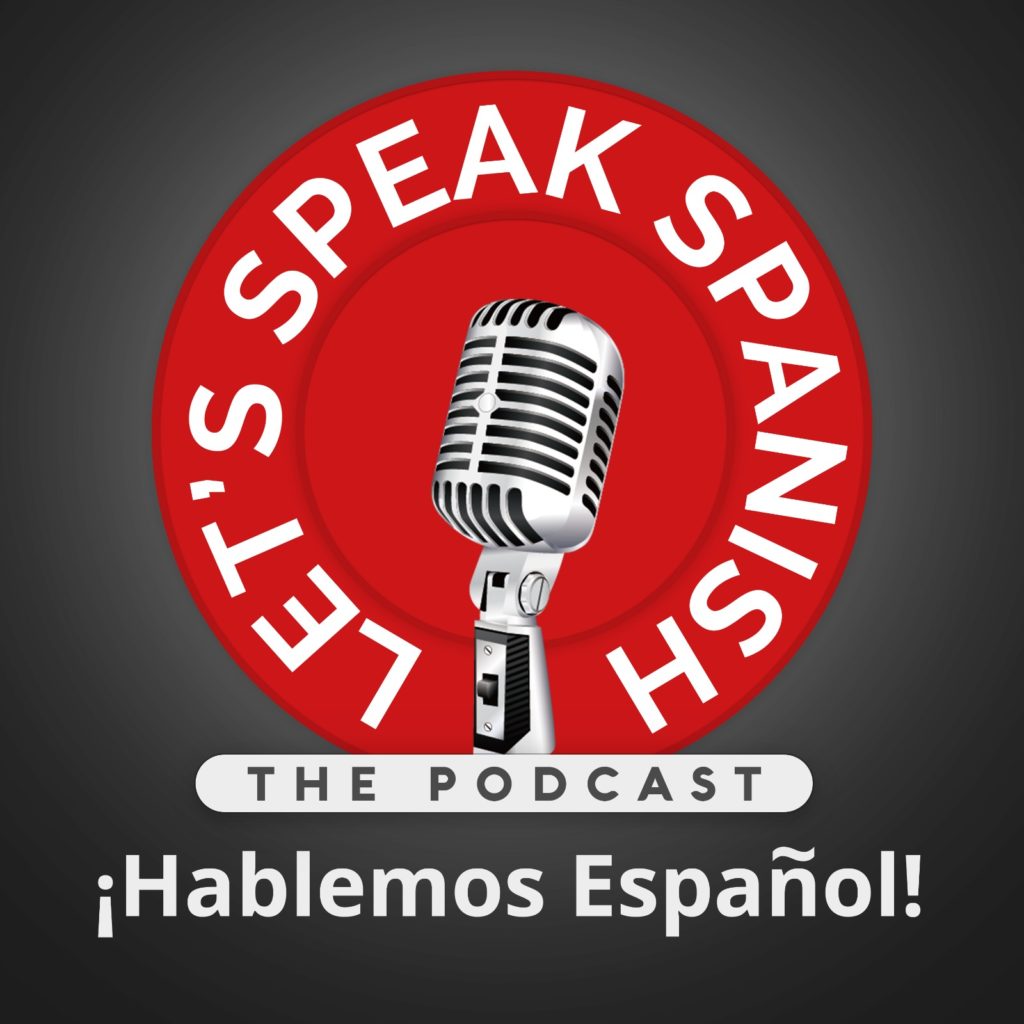
Planning Vacations in Spanish: Listen to Our Podcast!
Means of transportation.
First, we need to get started with the transport vocabulary . Have a look at the infographic you’ll find bellow.
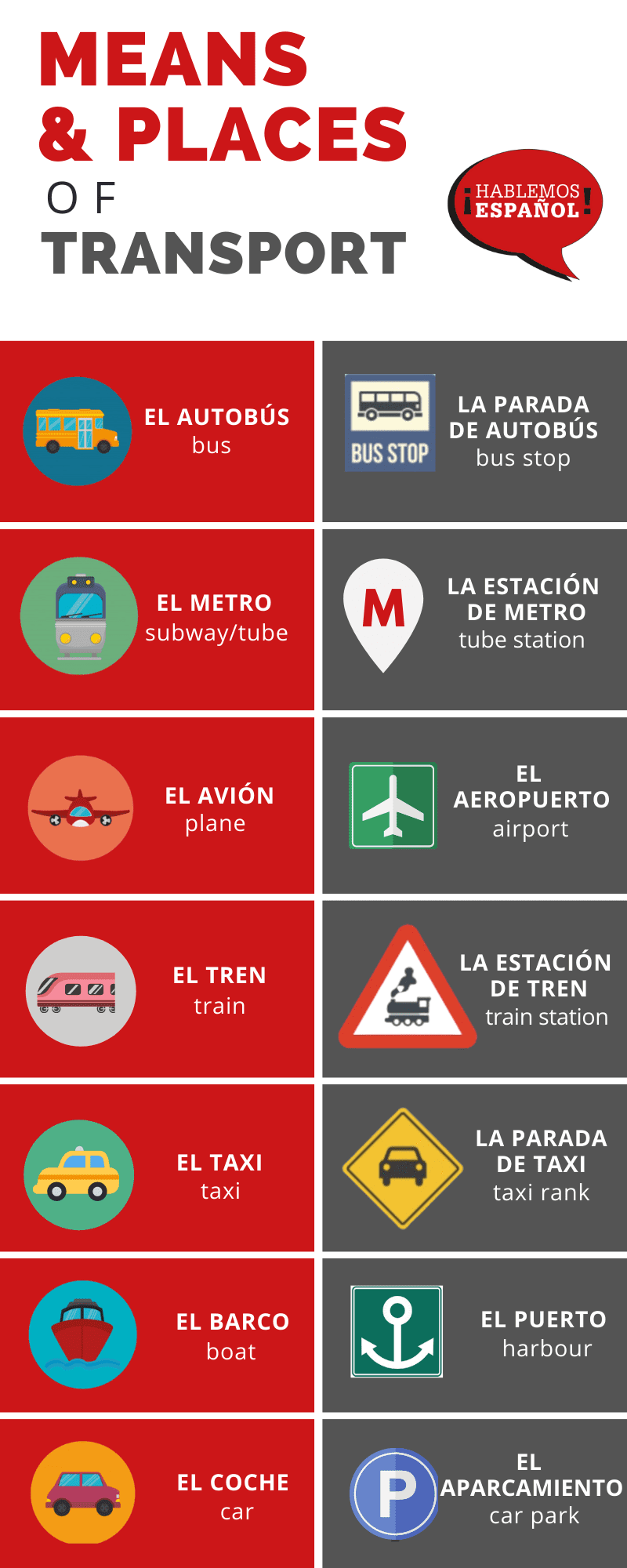
At the Airport
If you are taking your first flight to Spain , you should be prepared for all the different dialects and accents you will hear and see on your trip. To smooth your experience, we provide you with a list of common words and phrases used at the airport in Spanish .
[mp3j track=”https://letsspeakspanish.com/wp-content/uploads/2021/12/travel-airport-1.mp3″ title=”” ind=”n” volslider=”n” flow=”y”] ¿Dónde está el mostrador de facturación? – Where is the check-in counter?
[mp3j track=”https://letsspeakspanish.com/wp-content/uploads/2021/12/travel-airport-2.mp3″ title=”” ind=”n” volslider=”n” flow=”y”] ¿Dónde está el control de seguridad? – Where is the security checkpoint?
[mp3j track=”https://letsspeakspanish.com/wp-content/uploads/2021/12/travel-airport-3.mp3″ title=”” ind=”n” volslider=”n” flow=”y”] ¿Dónde está el autobús de enlace que lleva al hotel? – Where is the hotel shuttle bus?
[mp3j track=”https://letsspeakspanish.com/wp-content/uploads/2021/12/travel-airport-4.mp3″ title=”” ind=”n” volslider=”n” flow=”y”] ¿Dónde está la aduana? – Where are the customs?
[mp3j track=”https://letsspeakspanish.com/wp-content/uploads/2021/12/travel-airport-5.mp3″ title=”” ind=”n” volslider=”n” flow=”y”] ¿Dónde está la parada de autobús? – Where is the bus stop?
[mp3j track=”https://letsspeakspanish.com/wp-content/uploads/2021/12/travel-airport-6.mp3″ title=”” ind=”n” volslider=”n” flow=”y”] ¿Dónde está la terminal? – Where is the terminal?
[mp3j track=”https://letsspeakspanish.com/wp-content/uploads/2022/03/Travel-for-spanish-blog.mp3″ title=”” ind=”n” volslider=”n” flow=”y”] ¿Dónde está el baño/servicio/aseo ? – Where is the toilet?
[mp3j track=”https://letsspeakspanish.com/wp-content/uploads/2023/06/¿A-que-hora-sale-el-avion_.mp3″ title=”” ind=”n” volslider=”n” flow=”y”] ¿A qué hora sale el avión? – What time does the plane leave?
[mp3j track=”https://letsspeakspanish.com/wp-content/uploads/2021/12/travel-airport-9.mp3″ title=”” ind=”n” volslider=”n” flow=”y”] ¿A qué hora llega el vuelo? – What time does the flight arrive?
[mp3j track=”https://letsspeakspanish.com/wp-content/uploads/2021/12/travel-airport-10.mp3″ title=”” ind=”n” volslider=”n” flow=”y”] ¿Cuál es el número de vuelo? – What is the flight number?
[mp3j track=”https://letsspeakspanish.com/wp-content/uploads/2021/12/travel-airport-11.mp3″ title=”” ind=”n” volslider=”n” flow=”y”] ¿Cuál es el teléfono de la compañía aérea? – What is the airline’s phone number?
Baggage Related Phrases
Buying tickets.
Here you have some essential phrases and vocabulary to buy tickets in Spanish. We know how stressful is to purchase tickets for buses, trains, airplanes or any event that you want to attend. But don’t panic! We are here to make your life easier.
[mp3j track=”https://letsspeakspanish.com/wp-content/uploads/2023/06/¿Hablas-ingles_.mp3″ title=”” ind=”n” volslider=”n” flow=”y”] ¿Hablas inglés? – Do you speak English?
[mp3j track=”https://letsspeakspanish.com/wp-content/uploads/2021/12/travel-tickets-2.mp3″ title=”” ind=”n” volslider=”n” flow=”y”] ( Quería) un billete a Barcelona. – I want a ticket to Barcelona.
[mp3j track=”https://letsspeakspanish.com/wp-content/uploads/2021/12/travel-tickets-3.mp3″ title=”” ind=”n” volslider=”n” flow=”y”] Un billete de ida a Santiago, por favor. – One way ticket to Santiago, please.
[mp3j track=”https://letsspeakspanish.com/wp-content/uploads/2021/12/travel-tickets-4.mp3″ title=”” ind=”n” volslider=”n” flow=”y”] ¿Cuánto cuesta el billete? – How much does the ticket cost?
[mp3j track=”https://letsspeakspanish.com/wp-content/uploads/2021/12/travel-tickets-5.mp3″ title=”” ind=”n” volslider=”n” flow=”y”] ¿Cuándo sale el avión/autobús/tren? – When does the plane/bus/train leave?
[mp3j track=”https://letsspeakspanish.com/wp-content/uploads/2021/12/travel-tickets-6.mp3″ title=”” ind=”n” volslider=”n” flow=”y”] ¿Cuándo llega el avión/autobús/tren? – When does the plane/bus/train arrive?
At the Train or the Bus Station
[mp3j track=”https://letsspeakspanish.com/wp-content/uploads/2021/12/travel-at-train-1.mp3″ title=”” ind=”n” volslider=”n” flow=”y”] ¿Cuánto cuesta el billete? – How much does the ticket cost?
[mp3j track=”https://letsspeakspanish.com/wp-content/uploads/2021/12/travel-at-train-2.mp3″ title=”” ind=”n” volslider=”n” flow=”y”] Un billete de ida a Valencia, por favor. – One way ticket to Valencia, please.
[mp3j track=”https://letsspeakspanish.com/wp-content/uploads/2021/12/travel-at-train-3.mp3″ title=”” ind=”n” volslider=”n” flow=”y”] ¿A qué hora sale el tren para ___? – What time does the train to … leave?
[mp3j track=”https://letsspeakspanish.com/wp-content/uploads/2021/12/travel-at-train-4.mp3″ title=”” ind=”n” volslider=”n” flow=”y”] ¿Dónde está la parada del autobús número 11? – Where is the stop for bus number 11?
[mp3j track=”https://letsspeakspanish.com/wp-content/uploads/2021/12/travel-at-train-5.mp3″ title=”” ind=”n” volslider=”n” flow=”y”] ¿Cuándo llega el tren de ____? – When does the train from … arrive?
[mp3j track=”https://letsspeakspanish.com/wp-content/uploads/2021/12/travel-at-train-6.mp3″ title=”” ind=”n” volslider=”n” flow=”y”] ¿Cuál es la próxima parada? – What is the next stop?
[mp3j track=”https://letsspeakspanish.com/wp-content/uploads/2021/12/travel-at-train-7.mp3″ title=”” ind=”n” volslider=”n” flow=”y”] ¿Cuántas paradas más hay hasta ____? – How many more stops until…?
[mp3j track=”https://letsspeakspanish.com/wp-content/uploads/2021/12/travel-at-train-8.mp3″ title=”” ind=”n” volslider=”n” flow=”y”] ¿Cuánto dura el viaje? – How long is the journey?
While traveling in Spanish-speaking countries it’s necessary to know the numbers and dates . Even if you know how to ask “ How much does it cost? ” – it doesn’t mean that you will understand the answer (yes, I’ve been there).
For this reason, we have created a complete post for Numbers in Spanish . If you have difficulties with long numbers or find yourself frustrated with 5, 15, 50, and 500, then you should definitely check it out.
At the Car Rental
- Client : Buenos días. Quiero alquilar un coche. - Good afternoon. I would like to rent a car.
- Renter : Hola. ¿Tiene una reserva? - Do you have a reservation?
- Client : Sí/no tengo una reserva. - Yes, I have/No, I don’t have a reservation
- Renter : ¿Para cuántos días / cuántas semanas? - For how many days/weeks?
- Client : Para ____ días/semanas. - For ____ days/weeks.
Did you know that the word ‘car’ in Spanish can be said in many different ways depending on the country you’re in? Here you have a few examples.
Types of Cars:
Car information:.
[mp3j track=”https://letsspeakspanish.com/wp-content/uploads/2021/12/travel-at-car-4.mp3″ title=”” ind=”n” volslider=”n” flow=”y” ¿El coche es manual o automático? – Is the car manual or automatic?
[mp3j track=”https://letsspeakspanish.com/wp-content/uploads/2023/06/¿El-coche-tiene-aire-acondicionado_.mp3″ title=”” ind=”n” volslider=”n” flow=”y”] ¿El coche tiene aire acondicionado? – Does the car have air conditioning?
[mp3j track=”https://letsspeakspanish.com/wp-content/uploads/2021/12/travel-at-car-6.mp3″ title=”” ind=”n” volslider=”n” flow=”y”] ¿Dónde está la rueda de repuesto? – Where is the spare tire?
[mp3j track=”https://letsspeakspanish.com/wp-content/uploads/2021/12/travel-at-car-7.mp3″ title=”” ind=”n” volslider=”n” flow=”y”] ¿Qué tipo de gasolina utiliza? – What kind of fuel does it take?
[mp3j track=”https://letsspeakspanish.com/wp-content/uploads/2023/06/¿Cuantos-litros-por-kilometro-consume-este-coche_.mp3″ title=”” ind=”n” volslider=”n” flow=”y”] ¿Cuántos litros por kilómetro consume este coche? – How many miles/kilometers does this car get to the gallon/liter.
[mp3j track=”https://letsspeakspanish.com/wp-content/uploads/2023/06/¿El-precio-incluye-el-seguro-y-el-kilometraje_.mp3″ title=”” ind=”n” volslider=”n” flow=”y”] ¿ El precio incluye el seguro y el kilometraje? – Does that price include insurance and mileage?
Returning the Car and Emergency Situations:
[mp3j track=”https://letsspeakspanish.com/wp-content/uploads/2023/06/devolver-el-coche.mp3″ title=”” ind=”n” volslider=”n” flow=”y”] ¿Dónde y cuándo tengo que devolver el coche? – Where and when do I have to return the car.
[mp3j track=”https://letsspeakspanish.com/wp-content/uploads/2023/06/devolver-el-coche-con-el-deposito-lleno.mp3″ title=”” ind=”n” volslider=”n” flow=”y”] ¿Tengo que devolver el coche con el depósito lleno? – Do I have to return the car with a full gas tank?
[mp3j track=”https://letsspeakspanish.com/wp-content/uploads/2023/06/llamar-en-caso-de-accidente-o-averia.mp3″ title=”” ind=”n” volslider=”n” flow=”y”] ¿A qué número tengo que llamar en caso de accidente o avería? – Is there anyone I can call in case of accident or breakdown
Useful Verbs:
Do you know how to order in a restaurant in Spanish? What would you say if the waiter only spoke Spanish? Or if he did not understand your language or was rude? Usually the waiters (camareros) don’t speak English or they don’t speak the language very well. So, we advise you to take a closer look at the Basic Spanish Vocabulary for Restaurants . There you will find basic and important vocabulary.
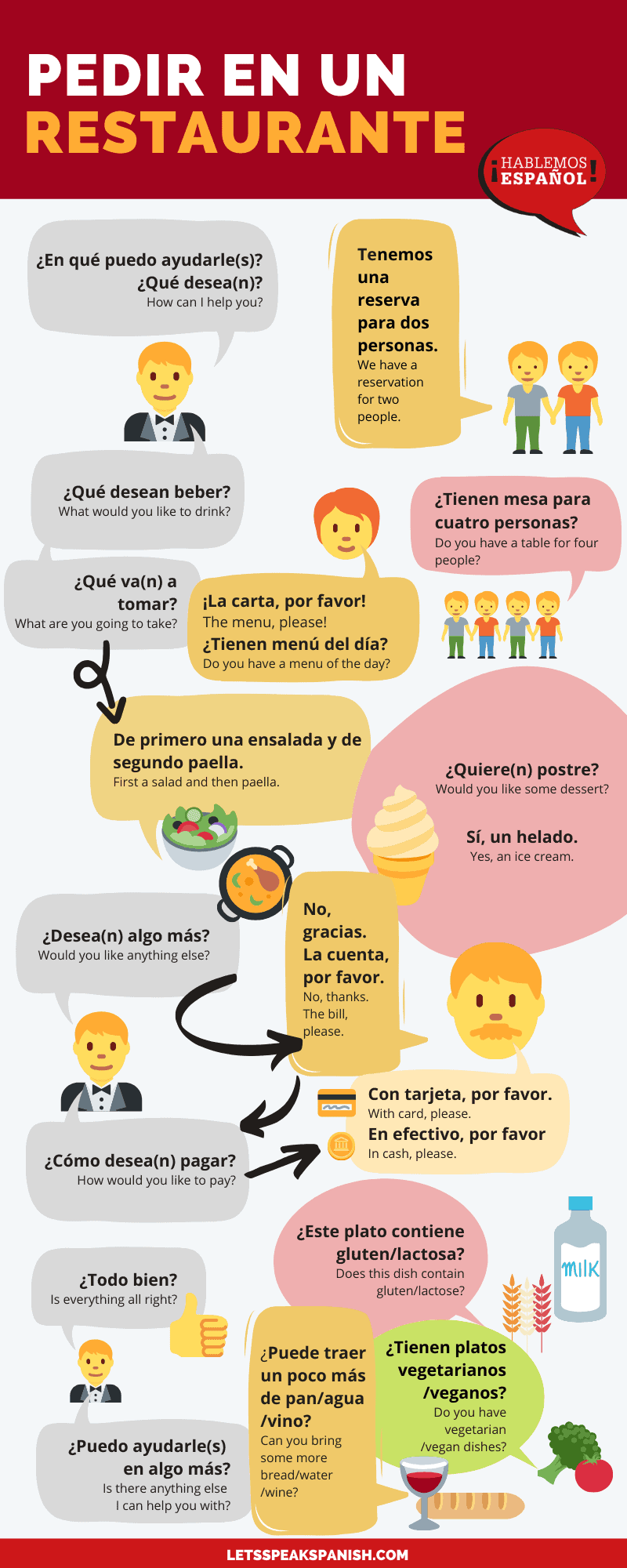
If you want to book your accommodation the old fashioned way, with a phone conversation, you can use these phrases. Keep in mind that you can write down all your requests in the reservation form on the hotel’s website.
Here you will find useful phrases for booking a room in Spanish .
The phrases you might use while checking-in :
[mp3j track=”https://letsspeakspanish.com/wp-content/uploads/2022/03/Hotel-1.mp3″ title=”” ind=”n” volslider=”n” flow=”y”] Hola, tengo una habitación reservada. – Hi, I have a reserved room.
[mp3j track=”https://letsspeakspanish.com/wp-content/uploads/2022/03/Hotel-2.mp3″ title=”” ind=”n” volslider=”n” flow=”y”] Me gustaría hacer el check-in. – I’d like to do the check-in.
[mp3j track=”https://letsspeakspanish.com/wp-content/uploads/2022/03/Hotel-3.mp3″ title=”” ind=”n” volslider=”n” flow=”y”] ¿Está lista la habitación? – Is the room ready?
[mp3j track=”https://letsspeakspanish.com/wp-content/uploads/2022/03/Hotel-4.mp3″ title=”” ind=”n” volslider=”n” flow=”y”] ¿Dónde puedo dejar mis maletas? – Where can I leave my luggage?
[mp3j track=”https://letsspeakspanish.com/wp-content/uploads/2022/03/Hotel-5.mp3″ title=”” ind=”n” volslider=”n” flow=”y”] ¿Dónde puedo aparcar el coche? – Where can I park my car?
[mp3j track=”https://letsspeakspanish.com/wp-content/uploads/2022/03/Hotel-6-2.mp3″ title=”” ind=”n” volslider=”n” flow=”y”] ¿En qué planta/piso está la habitación? – On which floor is the room?
[mp3j track=”https://letsspeakspanish.com/wp-content/uploads/2022/03/Hotel-7.mp3″ title=”” ind=”n” volslider=”n” flow=”y”] ¿A qué hora es el desayuno? – What time is breakfast?
[mp3j track=”https://letsspeakspanish.com/wp-content/uploads/2022/03/Hotel-8.mp3″ title=”” ind=”n” volslider=”n” flow=”y”] ¿Cuál es el horario de la piscina? – What are the swimming pool hours?
[mp3j track=”https://letsspeakspanish.com/wp-content/uploads/2023/06/Quiero-pagar-la-habitacion.mp3″ title=”” ind=”n” volslider=”n” flow=”y”] Quiero pagar la habitación. – I’d like to do the payment for the room.
[mp3j track=”https://letsspeakspanish.com/wp-content/uploads/2022/03/Hotel-10.mp3″ title=”” ind=”n” volslider=”n” flow=”y”] ¿Puedo pagar con tarjeta? – Can I pay by card?
[mp3j track=”https://letsspeakspanish.com/wp-content/uploads/2022/03/spanish-efectivo.mp3″ title=”” ind=”n” volslider=”n” flow=”y”] ¿Puedo pagar en efectivo? – Can I pay in cash?
[mp3j track=”https://letsspeakspanish.com/wp-content/uploads/2022/03/Hotel-12.mp3″ title=”” ind=”n” volslider=”n” flow=”y”] ¿Puede llamar un taxi, por favor? – Can you please call me a taxi?
For booking a hotel room, describing a place or an object in Spanish, we created a podcast episode that you can listen to and enhance your vocabulary and grammar skills.
On Vacation in Spain: Listen to Our Podcast!
Basic spanish directions.
This section will help you navigate through the streets of Mexico City, Barcelona or a little village of Peru.
Check out our detailed blog post about Useful Spanish Directions!

Asking for directions:
[mp3j track=”https://letsspeakspanish.com/wp-content/uploads/2023/06/Disculpa_Perdona-¿la-plaza-Mayor_.mp3″ title=”” ind=”n” volslider=”n” flow=”y”] Disculpa/Perdona, ¿la plaza Mayor?
[mp3j track=”https://letsspeakspanish.com/wp-content/uploads/2023/06/Busco-la-estacion-de-metro-mas-cercana.mp3″ title=”” ind=”n” volslider=”n” flow=”y”] Busco la estación de metro más cercana. – I’m looking for the closest metro station.
[mp3j track=”https://letsspeakspanish.com/wp-content/uploads/2022/03/Directions-3-2.mp3″ title=”” ind=”n” volslider=”n” flow=”y”] Estoy buscando un cajero automático. – I’m looking for an ATM.
[mp3j track=”https://letsspeakspanish.com/wp-content/uploads/2022/03/Directions-4-2.mp3″ title=”” ind=”n” volslider=”n” flow=”y”] ¿Dónde está el Museo de Arte Moderno? – Where is the Museum of Modern Art?
[mp3j track=”https://letsspeakspanish.com/wp-content/uploads/2022/03/Directions-5-.mp3″ title=”” ind=”n” volslider=”n” flow=”y”] ¿Hay un hospital cerca de aquí/por aquí cerca? – Is there a hospital around here?
Receiving directions:

Remember! If you don’t understand something, ask the person to repeat: ¿Cómo? (How?) . Usually Spanish people speak fast so you might need to slow them down a bit – just say: ¡Despacio, por favor! Slowly, please!
Essential Phrases in Spanish for Emergencies
Hopefully, you won’t need this part of our blog post, but it’s important that you know some basic phrases in case you need help!
[mp3j track=”https://letsspeakspanish.com/wp-content/uploads/2022/03/Emergencies-1.mp3″ title=”” ind=”n” volslider=”n” flow=”y”] ¿Puedes ayudarme? – Can you help me?
[mp3j track=”https://letsspeakspanish.com/wp-content/uploads/2022/03/Emergencies-2.mp3″ title=”” ind=”n” volslider=”n” flow=”y”] Necesito ayuda . – I need help.
[mp3j track=”https://letsspeakspanish.com/wp-content/uploads/2022/03/Emergencies-3.mp3″ title=”” ind=”n” volslider=”n” flow=”y”] Estoy perdido . – I’m lost.
[mp3j track=”https://letsspeakspanish.com/wp-content/uploads/2023/06/¡Llama-a-la-policia-.mp3″ title=”” ind=”n” volslider=”n” flow=”y”] ¡Llama a la policía! – Call the police!
[mp3j track=”https://letsspeakspanish.com/wp-content/uploads/2023/06/¡Llama-a-una-ambulancia.mp3″ title=”” ind=”n” volslider=”n” flow=”y”] ¡Llama a una ambulancia! – Call an ambulance!
[mp3j track=”https://letsspeakspanish.com/wp-content/uploads/2022/03/Emergencies-6.mp3″ title=”” ind=”n” volslider=”n” flow=”y”] ¡Ten cuidado! – Be careful!
[mp3j track=”https://letsspeakspanish.com/wp-content/uploads/2022/03/Emergencies-7.mp3″ title=”” ind=”n” volslider=”n” flow=”y”] Ha habido un accidente. – There’s been an accident.
[mp3j track=”https://letsspeakspanish.com/wp-content/uploads/2023/06/¡Por-favor-rapido.mp3″ title=”” ind=”n” volslider=”n” flow=”y”] ¡Por favor, rápido! – Please hurry!
[mp3j track=”https://letsspeakspanish.com/wp-content/uploads/2022/03/Emergencies-9.mp3″ title=”” ind=”n” volslider=”n” flow=”y”] ¿Estás bien? – Are you OK?
[mp3j track=”https://letsspeakspanish.com/wp-content/uploads/2022/03/Emergencies-10.mp3″ title=”” ind=”n” volslider=”n” flow=”y”] Me han robado. – I’ve been robbed.
[mp3j track=”https://letsspeakspanish.com/wp-content/uploads/2022/03/Emergencies-11-.mp3″ title=”” ind=”n” volslider=”n” flow=”y”] Me han atacado. – I’ve been attacked.
The Most Commonly Used Verbs
In this part you can refresh or learn new Spanish verbs for traveling .
Best Apps for Traveling in Spain

1. Maps.me – a perfect alternative to any online maps. Before going to your destination, download an offline map and you will never get lost. You can also search for restaurants, supermarkets, and cultural landmarks without being connected to the internet.

2. Cabify – it’s like Uber but a Spanish version.

3. Triposo – a different kind of a TripAdvisor. It’s more user friendly and it has a lot of information about any destination. Create bucket lists and add favorite places. You can also find mini-guides gathered by the community.

4. Spanish Dict – although Google Translate is an excellent tool, we suggest this app for traveling through Spanish-speaking countries.

5. El Tenedor (The Fork) – the app has information about over 30,000 restaurants in Spain. You can discover what is around your location, choose the preferred cuisine and book a table. You can see the full menu in an app, which is handy. The app also offers discounts and some great deals.

6. Idealista – website and app for finding accommodation for longer periods. It offers apartments and houses to rent or buy.

7. Wallapop – similar to eBay, but in Spain. You can sell or buy stuff through the website or the app.
We hope this blog post answered many of your questions. Now, you’re ready for your adventure in Spain or South America. If you’re interested in more educational blog posts, visit our Learner’s Blog or check the FREE options to learn Spanish.

Would you like to take your Spanish to the next level?
Whether you’re a complete beginner or you’re an advanced student, with us you’ll reach the next level of Spanish quickly and easily. With 24 Levels to Spanish fluency, the next level is always close by, so you will never lose motivation.
You can choose between:
COMBI Spanish Self-Study Course
Live lesson with one of our tutors.
In both cases, you’ll learn Spanish using our successful 24 Level System to Spanish Fluency® and our unique Spanish teaching methods.
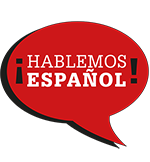
[email protected]
- 24 Level System to Spanish Fluency®
- Pricing & Booking
- Spanish Test
- COMBI Course

© 2024 FU International Academy
- Privacy Policy
- Terms and Conditions
- Legal Notice
Illustration by Natasha Remarchuk de Icons8

- Conversational Spanish
- Level 2-24 Courses
- Email Mini Courses
- Wall of Love
- More Networks
Not sure which program to pick? Compare programs
105 Spanish Travel Phrases To Know For Your Next Trip

Get our free email course, Shortcut to Conversational.
Have conversations faster, understand people when they speak fast, and other tested tips to learn faster.
Traveling to a Spanish speaking country without knowing at least a few Spanish travel phrases is a bad idea.
Even the simplest of situations can become an ordeal, whether it’s understanding directions, ordering food in a restaurant, or if worse comes to worst, handling an emergency situation.
That’s not to say that you won’t have a good trip – just that it’s more likely to come with added stress when you can’t speak the local language.
On the flip side, you don’t need to speak perfectly fluent Spanish in order to communicate.
Learning even a couple of basic Spanish travel phrases and words will go a long way in preparing you for most scenarios you’ll encounter when traveling.
Not to mention automatically be treated better by the locals who’ll appreciate the effort you’re making to speak their language.
Plus, nobody wants to be “that tourist ” who makes zero effort to speak Spanish, and is resigned to speaking painfully slow English and using excessive pointing as a last resort to be understood.
We put together a list of useful Spanish travel phrases and vocabulary for people who find themselves in a Spanish speaking environment and quickly need to learn survival Spanish.
Below, you’ll find vocab and native audio pronunciations for:
- Basic phrases
Getting around
- Understanding directions
- Ordering food in a restuarant
- Dealing with an emergency
- Question words
- Telling the time

Basic Spanish Phrases
Hola – Hello
Buenos días – Good day/Good morning
Buenas tardes – Good afternoon
Buenas noches – Goodnight
¿Cómo estás? – How are you?
Por favor – Please
Gracias – Thank you
Me llamo… – My name is…
¿Habla inglés? – Do you speak English?
No hablo español – I don’t speak Spanish
¿Cómo se llama? – What is your name?
Disculpe – Excuse me/I’m sorry
No sé – I don’t know
¿Cómo se dice? – How do you say this?
No entiendo – I don’t understand
¿Qué hora es? – What time is it?
Hable más lento – Speak slowly
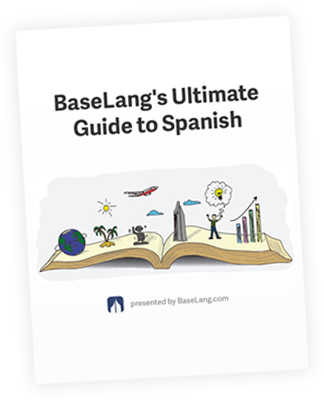
Download the expanded guide to read later
This page gives you a great overview of the most important concepts and strategies, but for the full, expanded guide, click the button below:
These are likely to be your go-to Spanish travel phrases when getting around. Even when you don’t know the Spanish for the subject, these phrases can be combined with gentle pointing, and still come across as very polite.
Me gustaría – I would like
Quiero – I want
Necesito – I need
¿Dónde queda? – Where is?
¿Cuánto cuesta?– How much does it cost?
¿Qué precio tiene? – How much does it cost?
¿Tiene..? – Do you have..?
Yo tengo- I have
Yo no tengo – I don’t have
Qué significa (subject)…? – What does…(subject).. mean?
¿Como llego a..? – How do I get to…?
You’ll want explore your new surroundings, so best to memorize the Spanish for some key places.
El aeropuerto – Airport
El banco – Bank
La biblioteca – Library
La cafetería – Café
El hotel – Hotel
El terminal – Terminal
La estación de bomberos – Firestation
La estación de ferrocarril – Railway station
El estadio – stadium
La farmacia – Pharmacy
La gasolinera – Petrol station
El hospital – Hospital
La librería – Bookshop
El mercado – Market
El museo – Museum
La parada – Bus stop
La policía – Police station
El restaurante – Restaurant
La tienda – Shop, store.
El Centro Comercial – shopping centre
Understanding Directions in Spanish
Understanding directions in a different language is always a challenge, but knowing a couple of these key phrases will help you if the situation calls for it. Either that, or you’ll end up with a general idea of where you need to go.
¿Entiende? – Do you understand?
A la derecha – To the right
A la izquierda – To the left
Derecho – Straight ahead
En la esquina – At the corner
A una cuadra – One block away
Hacia el Norte/Sur/Este/Oeste – To the North/South/East/West
Small talk is an essential part of everyday life, and Spanish speaking countries are no different.
Use these Spanish phrases to break the ice when you meet a local.
¿Cómo te va? – How’s it going?
¿Cómo te ha ido? – How’ve you been?
Estoy bien ¡Gracias! – I’m fine, thanks
¿Y tú? – And you?
Bien/Más o menos. – Good/So-so
¿Qué tal? – How are you?
¿Qué pasa? – What’s happening?
¿Qué haces? – What are you doing?
Ordering Food In Spanish
For obvious reasons, it’s always a good idea to be polite to your waiter in a restaurant.
¿Me trae…? – Could I have …?
¿Cuál es el menú de hoy? – What is today’s menu?
¿Qué me recomienda? – What do you recommend?
¿Acepta tarjeta de crédito? – Do you accept credit card?
La cuenta, por favor – Check, please
Soy alérgico – I’m allergic
Soy vegetariano – I’m vegetarian
Emergency Spanish
Knowing a couple of key emergency phrases will make things much easier if worst case scenario happens, and you find yourself in trouble.
¿Puede ayudarme? – Can you help me?
Necesito ayuda – I need help
¡Ayuda! – Help!
Estoy perdido – I’m lost
¡Llame a la policia! – Call the police!
¡Llame una ambulancia! – Call an ambulance!
Quiz: Places, Directions, and Emergency
Before we move on, why don’t you see how much you remember from these three sections by watching this quiz video. You’ll be shown a selection of Spanish travel phrases and given a few moments to think of its English equivalent before we reveal the translation. Good luck!

Question Words In Spanish
Just like the “Getting Around” phrases, these Spanish question words will be useful even when you don’t know how to say the subject of the sentence in Spanish.
¿Qué…? – what?
¿Cómo…? – how?
¿Cuándo…? – when?
¿Dónde…? – where?
¿Quién…? – who?
¿Por qué…? – why?
¿Cuál? – which?
¿Qué quieres hacer hoy? – What do you want to do today?
¿Como te sientes? – How are you feeling?
¿Cuándo vienes de nuevo? – When are you coming back?
¿Dónde está el museo? – Where is the museum?
¿Quién es? – Who is it?
¿Por qué quiere visitar este país? – Why do you want to visit this country?
¿Cuál prefieres? – Which one do you prefer?
Telling The Time
While almost everyone who travels has a smartphone these days, it’s still useful to know how to ask a stranger for the time, even if it’s only a tactic to break the ice and start a proper conversation.
¿Puede decirme la hora? – Can you tell me what time is it?
…En punto – O’ clock
…Y media/Y treinta – …And a half
…Y un cuarto/Y quince – …Plus fifteen/quarter past
Faltan … para las … – It’s … until …
Medianoche – Midnight
Mediodía – Noon
Son las doce y treinta – It’s 12.30pm
Es la una y un cuarto – It’s 1.15pm
Faltan diez para las tres – It’s 2.50pm
Son las nueve de la mañana – It’s nine in the morning
Son las tres en punto – It’s three o’clock sharp.
Falta un cuarto para el mediodía – It’s quarter to midday
Related: If you want to learn more than these basics, then read our in-depth guide on how to tell the time in Spanish.
And that’s it.
Memorize these Spanish travel phrases before visiting a Spanish-speaking country for more comfortable, stress-free interactions in Spanish.
If you are serious about learning Spanish, then I recommend reading our 119-page Ultimate Guide to Spanish , which includes 10 principles behind learning Spanish fast, strategies to learn vocabulary and grammar, achieve perfect pronunciation and much more.
You can download the entire guide, for free, right below
Get our FREE 7-day email course, Shortcut to Conversational
The exact strategies you need to become conversational in Spanish this year. Join the course now, before we come to our senses and charge for it!

Break-up lines in Spanish: 20 phrases for ending a relationship

Camping in Spanish: Essential vocab for your outdoor adventure

Spanish Captions for Instagram: Level up your content en español
This blog is presented by BaseLang: Unlimited Spanish Tutoring for $179 a Month. Learn more here.
Your First Week Is Just $1.
After that, it’s just $179/mo for unlimited one-on-one tutoring.
Remember, the worst case scenario is you get a few free classes, don’t like it, and end up with an extra $20 in the bank.
Subscribe to BaseLang Bites
Supercharge your Spanish with our short weekly email, with bite-sized lessons and tips 🚀
BIENVIENDOS A BASELANG BITES!
Keep an eye out for the first lesson coming to your inbox shortly 🙌

Download BaseLang's Ultimate Guide to Spanish!
Get Access Now!
Sign up today so you can get instant access to this product bundle!

A Useful Guide to Spanish Travel Phrases

Written by Diana Luciana
August 25, 2022.
Are you planning a long-awaited trip to a Spanish-speaking country? 🌎
Your trip can be so much more fun and meaningful if you know how to say travel in Spanish, and communicate with the locals—how many times have you missed out on a secret spot because you didn’t speak the language?—and find your way around with this guide to Spanish travel phrases and words. From getting to the airport to ordering food in Spanish at the restaurant, we got you covered.
How do you say travel in Spanish?
We put together a list of essential Spanish travel phrases, need-to-know vocabulary, and tips for traveling in Spanish. Keep in mind that you don’t need to speak Spanish fluently to get the most out of your trip and have meaningful interactions. A basic travel Spanish vocabulary will get you a long way, and the locals would definitely appreciate the effort. And when you don’t understand or aren’t sure of what’s being said, simply ask ¿Habla inglés? (Do you speak English?)
Key phrases in Spanish for travelers
Here are some key Spanish phrases and greetings you should know. You can use them in any situation (asking for directions in Spanish, asking questions in Spanish, meeting new people in Spanish, and so on.) It’s a mini Spanish 101 lesson:
Spanish greetings
- Buenos días — Good morning
- Buenas tardes — Good afternoon
- Buenas noches — Good evening
- ¿Cómo te llamas? — What’s your name?
- Me llamo… — My name is…
- Mucho gusto. Encantado — It’s a pleasure to meet you.
- ¿Cómo te va? / ¿Qué tal? / ¿Qué hay? — How’s it going?
- ¿Cómo estás? — How are you?
- Bien, gracias / Muy bien, gracia s — Good, thank you / Very well, thank you
- Por favor — Please
- Perdón / Lo siento — Sorry
- ¿Habla inglés? — Do you speak English?
- No hablo español. — I don’t speak Spanish.
- No entiendo bien el español. — I don’t understand Spanish well.
- ¿Tiene…? — Do you have…?
- ¿Entiende? — Do you understand?
- Yo entiendo / yo no entiendo — I understand / I don’t understand
- Hágame el favor de hablar más despacio. — Speak more slowly, please.
- Escríbalo, por favor. — Write it down, please.
Essential Spanish
- ¿Dónde está…? ¿Dónde están…? — Where is…? Where are…?
- ¿Por dónde se va a…? / ¿Cómo puedo llegar a…? — How do you go to…?
- ¿Dónde estamos aquí en el mapa? — Where are we on the map?
- ¿Está lejos? ¿Está por aquí? — Is it far away? Is it near here?
- Busco… — I’m looking for…
- ¿Me podría ayudar? — Can you help me?
- Estoy perdido (for men) / perdida (for women) . — I’m lost.
- ¿Hay alguien que hable inglés? — Is there anyone who speaks English?
- Disculpe / Con permiso / Perdóname — Excuse me
- ¿Quién? — Who?
- ¿Qué? — What?
- ¿Cuándo? — When?
- ¿Cómo? — How?
- ¿Cuánto? — How much?
- ¿Cuántos? — How many?
- ¿Por qué? — Why?
- ¿A qué hora? — What time?
- ¿Por cuánto tiempo? — How long?
- ¿Cada cuánto? — How often?
- Yo quiero / yo no quiero — I want / I don’t want
- Yo tengo / yo no tengo — I have / I don’t have
How to say airport in Spanish
Imagine yourself getting off the plane ( el avión )—new place, new language, new everything—ready to start your vacation. Even though English is widely spoken, knowing the basic Spanish travel vocabulary for airports and planes will make your trip easier. And you will start your vacation on the right foot, confident that you can find your way in any situation.
Essential travel vocabulary in Spanish for when you are at the airport ( el aeropuerto ):
Spanish travel vocabulary
Airport-specific vocabulary in Spanish
- la aduana — customs
- la aerolínea / la linea aerea — airline
- el asiento — seat
- el auxiliar de vuelo, la azafata — flight attendant
- el baño — bathroom
- el boleto — ticket
- confirmar una reservación — to confirm a reservation
- el destino — destination
- el equipaje — luggage
- el horario, el itinerario — schedule
- la maleta — suitcase
- el pasajero, la pasajera — passenger
- el pasaporte — passport
- el regreso — return
- la salida — departure, exit
- la tarifa — price
- la tienda libre de impuestos — duty-free shop
- el viaje — journey, trip
- el vuelo — flight, wing
Spanish travel phrases
Useful phrases at the airport in Spanish
- ¿Cuándo sale el avión? — When does the plane leave?
- Mi vuelo es a las … en punto. — My flight is at … o’clock.
- ¿A qué hora es el embarque? — What time is boarding?
- ¿Cuándo llega el avión? — When does the plane arrive?
- Quisiera cambiar mi reserva / asiento. — I would like to change my reservation / seat.
- Querría anular mi reserva. — I would like to cancel my reservation.
- Necesitamos ayuda para subir al avión. — We need help to get on the plane.
- ¿Podría elegir mi asiento? — Could I choose my seat?
- Este es mi equipaje de mano . — This is my carry-on luggage.
- ¿Se ha cancelado el vuelo? — Has the flight been canceled?
- ¿Dónde está la terminal internacional / a puerta de embarque ? — Where is the international terminal / boarding gate?
- ¿Dónde puedo cambiar dinero? — Where is there a currency exchange desk?
- ¿Dónde está el baño? — Where is the bathroom?
How to ask for directions in Spanish
You are finally in the city, ready to explore! Next on the list is learning how to ask for directions in Spanish. In this section, we’ll also cover the topic of transportation and finding a hotel in Spanish, and show you the most common travel phrases. Let’s delve into it:
- ¿Dónde está la estación de ferrocarril? — Where is the railway station?
- ¿A qué hora sale el tren? — What time does the train leave?
- ¿A qué hora sale el próximo tren? — What time does the next train leave?
- ¿De qué plataforma sale? — Which platform does it leave from?
- ¿Dónde puedo tomar un taxi / un autobús? (Latin America) / ¿Dónde puedo coger un taxi / un autobús? (Spain) — Where can I catch a taxi / a bus?
- ¿Tiene un pase de un día? — Do you have a one-day pass?
- ¿Cuánto cuesta un billete al aeropuerto? — How much is a ticket to the airport?
- ¿Cómo llego a…? — How do I get to … ?
- Gira a la izquierda/derecha. — Turn left/right.
- ¿Dónde hay un supermercado? — ¿Where is there a supermarket?
- ¿Dónde hay una casa de cambio? — Where is the currency exchange?
- ¿Dónde está el banco? — Where is the bank?
- ¡Disculpe! Soy turista y estoy perdido/a. — Excuse me! I am a tourist and I am lost.
- ¿Dónde hay un restaurante? — Where is a restaurant?
- Me podrías recomendar un restaurante? — Do you have any restaurant recommendations?
12 Spanish travel phrases for the hotel
- Busco un hotel . — I’m looking for a hotel.
- Yo necesito un hotel / un cuarto / un cuarto con baño. — I need a hotel / a room / a room with a bathroom.
- Una habitación para dos personas . — A room for two people.
- Yo tengo una reserva a nombre de… — I have a reservation under the name of…
- He reservado una habitación. — I have booked a room.
- ¿Puedes darme la llave de mi habitación? — Can you give me the key to my room?
- ¿Cuándo es la hora límite de salida? — When is check-out time?
- ¿Puedo solicitar una salida tardía? — Can I request for late check-out?
- ¿Cuál es la contraseña de Wifi? — What is the Wifi password?
- ¿Tiene servicio de habitaciones? — Do you have room service?
- ¿A qué hora es el desayuno? — What time is breakfast?
- Esta habitación es demasiado ruidosa. — This room is too noisy.
How to order food in Spanish
After a long day of walking and exploring, it’s time to take a break and have a bite. Maybe try out the local Spanish cuisine. Whether you are ordering food or drinks, these phrases will come in handy. And if you want to learn more about how to say food in Spanish, check out this post . (You also have an entire section about ordering food in Spanish.) Start with these phrases:
- Una mesa para… dos, tres, cuatro . — A table for… two, three, four.
- ¿Cuál es el menú de hoy? — What is today’s menu?
- Me gustaría probar la especialidad del cocinero. — I would like to try the chef’s specialty.
- ¿Qué me recomienda? — What do you recommend?
- Me gustaría algo de postre. — I would like some dessert.
- La cuenta, por favor. – The check, please.
- ¿Acepta tarjeta de crédito? — Do you accept credit card?
- Tengo alergia a … — I am allergic to…
- Soy alérgico. — I’m allergic.
- Soy vegetariano/a. — I’m a vegetarian.
Now you’re all set for your Spanish travels! I hope this guide will enhance your travel experience, and that you will enjoy speaking Spanish—from asking for directions to ordering breakfast at the local cafe. If you want more free Spanish lessons , check out my YouTube channel and blog .
What’s your favorite travel destination? ✈️🧳 Drop your answer in the comments.
P.S. Do you know how to say safe travels in Spanish? Learn 3 ways you can say safe travels in Spanish: Te deseo que tengas un buen viaje (I wish you safe travels), Ojalá que tengas un buen viaje (I hope you have a good trip) and the formal option of Le deseo que tenga un buen viaje (I hope you have a good trip.) Now you know how to say safe travels in Spanish.
- Click to share on Facebook (Opens in new window)
- Click to share on Twitter (Opens in new window)
- Click to share on LinkedIn (Opens in new window)
- Click to share on Telegram (Opens in new window)
- Click to share on WhatsApp (Opens in new window)
- Click to share on Pinterest (Opens in new window)
- Click to share on Pocket (Opens in new window)
- Click to print (Opens in new window)
- Click to email a link to a friend (Opens in new window)
You May Also Like…

Let’s talk about the weather in Spanish
Dec 12, 2023
Work on your language skills and learn how to talk about the weather in Spanish. Whether it’s small talk or striking up a new conversation, these Spanish dialogues will help you improve your Spanish.


What’s the difference between “un” and “uno” in Spanish?
Dec 5, 2023
Do you know what’s the difference between un and uno in Spanish? Let’s work together on your Spanish skills with these dialogues!

Do You Know How to Use “Me Gusta” in Spanish?
Nov 16, 2023
Do you know how to use “me gusta” in Spanish? Test your Spanish with these conversations and learn how to say “I like” in Spanish.
Get free Spanish lessons!
Join the mailing list for updates, special offers, and a $1 conversation class!
You have Successfully Subscribed!
You are using an outdated browser. Please upgrade your browser or activate Google Chrome Frame to improve your experience.
131 Useful Spanish Travel Phrases Every Traveler Should Learn
Have you been dreaming about your upcoming vacation to Spain?
Eagerly awaiting your backpacking trek through South America?
Whatever the case, your trip to any Spanish-speaking country will be so much more fun and meaningful if you can communicate with locals .
But what kind of Spanish travel phrases do you even need to know?
Below are the essentials— the most common Spanish phrases for travel to help you upgrade your trip from “goodw” to “great.”
1. Basic Spanish Greetings and Phrases
2. basic spanish phrases for everyday use, 3. asking for directions in spanish, 4. spanish travel phrases for the hotel, 5. spanish travel phrases for the restaurant, 6. spanish phrases for the airport and ticket offices, 7. medical emergencies in spanish, 8. spanish phrases for having a bit of fun, and one more thing….
Download: This blog post is available as a convenient and portable PDF that you can take anywhere. Click here to get a copy. (Download)

Spanish-speaking countries are generally very polite and you must always be courteous and say “hello” and “how are you?”
Don’t worry about making mistakes. Most people will try their utmost to understand you and to make sure you understand them. Try your best and they will be happy to reciprocate!
- Buenos días — Good morning
- Buenas tardes — Good afternoon
- Buenas noches — Good evening
- ¿Cómo te llamas? — What’s your name? (informal)
- ¿Cómo se llama? — What’s your name? (formal)
- Me llamo… — My name is…
- Mucho gusto — Nice to meet you
- ¿Cómo estás? — How are you? (informal)
- ¿Cómo está? — How are you? (formal)
- Bien, gracias — Good, thank you
- Por favor — Please
- Gracias — Thank you
- Perdón — S orry
- ¿Habla inglés? — Do you speak English?
- No hablo español — I don’t speak Spanish

You can go far with some very easy-to-remember travel phrases and words.
You’ll likely use “I want,” “I like” and “Do you have…?” quite often. If you don’t know the noun, you can simply point at the object or show a photo.
You can also say a lot of things with very simple verbs we’re about to introduce. It may not be the sophisticated way you speak in English, but you will be understood.
- Quiero / No quiero — I want / I don’t want
- Me gustaría ; Quisiera — I would like (more polite)
- ¿Dónde está…? — Where is…? Since dónde ends in e and está starts with one, these two words flow into each other, almost like they were a single word.
- ¿Cuánto cuesta? — How much does it cost?
- ¿Qué hora es? — What time is it?
- ¿Tiene…? — Do you have…?
- Tengo / No tengo — I have / I don’t have
- Entiendo / No entiendo — I understand / I don’t understand
- ¿Entiende? — Do you understand?
- Quiero un boleto — I want a ticket
…un hotel — …a hotel
…un taxi — …a taxi
- No funciona — It doesn’t work
That last one is an all-purpose word . You can use this for a million circumstances! Just point at the shower or whatever and say “ ¡No funciona!”
What we’ve seen so far is basic survival Spanish, so even if you can only remember these words and phrases, they’ll still help a great deal.
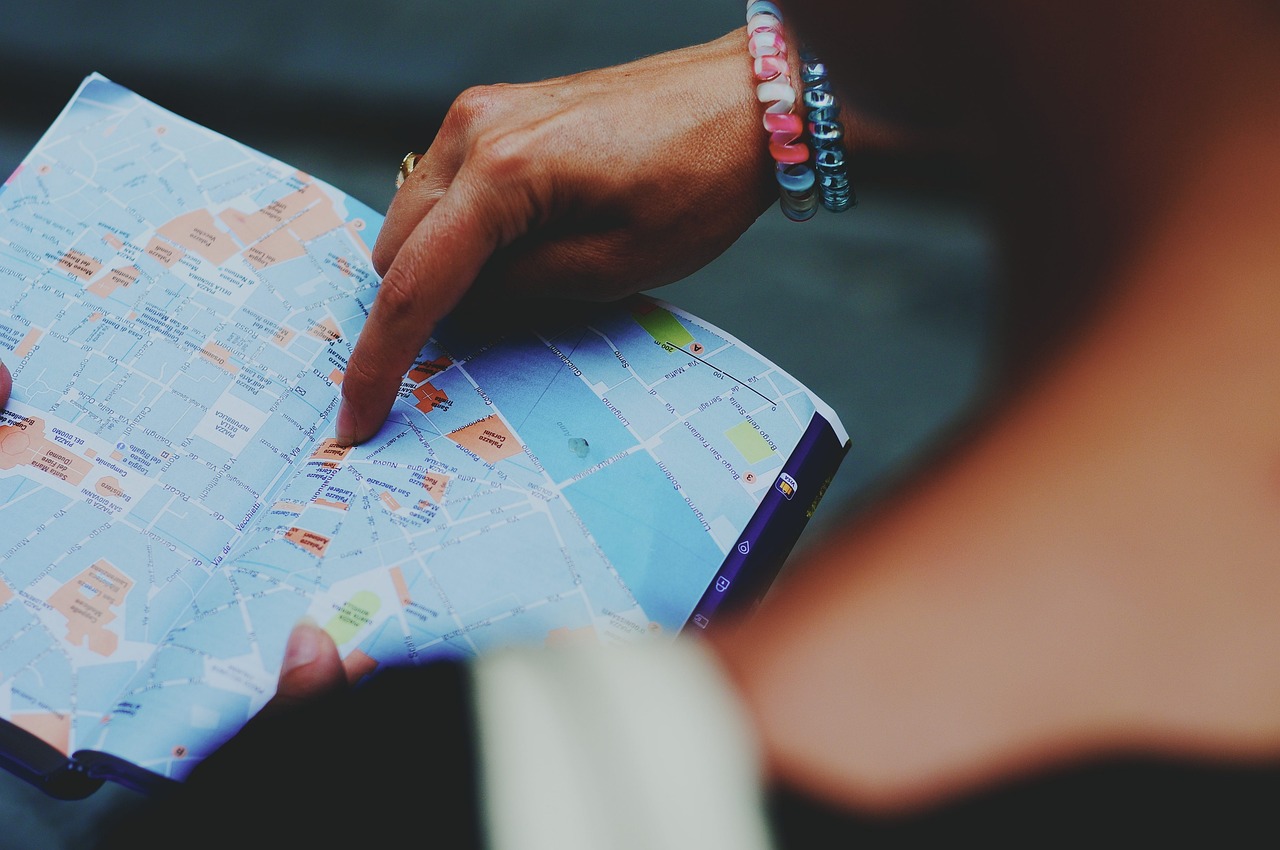
If you get a bit lost or unsure of how to get somewhere, “¿dónde está?” is the simplest way of asking for directions. Here are a few more phrases, locations and other directions in Spanish that will be helpful on your trip:
- ¿Dónde está la estación de ferrocarril? — Where is the railway station?
- ¿Dónde hay un restaurante? — Where is a restaurant?
- Un tren — A train
- La calle… — The street…
- Un banco — A bank
- El baño — The bathroom
- Busco un hotel — I’m looking for a hotel
- Necesito un hotel — I need a hotel
…un cuarto — …a room
…un cuarto con baño — …a room with a bathroom
- ¿Dónde hay una casa de cambio? — Where is the currency exchange?
- ¿Dónde está el banco? — Where is the bank?
- Dinero — Money
Once you have asked a question, someone will answer you in Spanish. Listen for these key words:
- A la derecha — To the right
- A la izquierda — To the left
- Derecho — Straight ahead
- En la esquina — At the corner
- A una cuadra — In one block
…dos cuadras — …two blocks
…tres cuadras — …three blocks
…cuatro cuadras — …four blocks

You’ve finally found your hotel and you’re ready to check in!
Staff at international chains will probably be able to communicate in English with you, but these phrases and questions will come in handy for local hotels, hostels, bed and breakfasts, etc.
These will also be helpful when you need to make adjustments to your reservation or are curious about other hotel amenities.
- Tengo una reserva a nombre de… — I have a reservation under the name of…
- Estadía de tres noches — Three-night stay
- Una habitación para dos personas — A room for two people
- Una habitación con una cama de matrimonio — A room with a double bed As you can see, habitación is a synonym of cuarto . You can use either term when booking a room.
- ¿Dónde está la piscina? — Where is the pool?
- ¿A qué hora es el desayuno? — What time is breakfast?
- ¿Puedo solicitar una salida tardía? — Can I request a late check-out?
- ¿Tiene servicio de habitaciones? — Do you have room service?
- ¿ Cuál es la contraseña de WiFi ? — What is the WiFi password?
- Una cama supletoria — An extra bed
- Vista al mar — Ocean view
- Vista a la ciudad — City view
- Un balcón — A balcony
- La terraza — The rooftop / terrace
- El gimnasio — The gym
- La playa — The beach
- El vestíbulo — The lobby

Probably the most useful travel phrases you will need are the ones you would use in a restaurant. Let’s go over some basic restaurant vocabulary in Spanish :
Ask for anything by using quiero or quisiera — “I want” or “I would like.” And remember to say por favor and gracias!
- Una mesa — A table
- Una mesa para dos — A table for two
…tres — …three
…cuatro — …four
- Un menú / Una carta — A menu
- Sopa — Soup
- Ensalada — Salad
- Hamburguesa — Hamburger
- Con salsa de tomate — With ketchup
…mostaza — …mustard
…tomate — …tomato
…lechuga — …lettuce
- Una entrada — An appetizer
- Un postre — Dessert
- Una bebida — A drink
- Agua — Water
- Vino tinto / Vino blanco — Red wine / White wine
- Cerveza — Beer
- Un café — Coffee
- ¡Señor! / ¡Señorita! — Mister / Miss (when calling a waiter or waitress)
- La cuenta — The check
- Una tarjeta de crédito — A credit card
- Una tarjeta de débito — A debit card
- Pagar en efectivo — Pay in cash
Note that many places in smaller towns still don’t take credit cards , so make sure you have enough cash with you.
You can ask if a place takes credit cards by using the noun with a question. For example, you can pull out your credit card and say: ¿Tarjeta de crédito? They will understand.
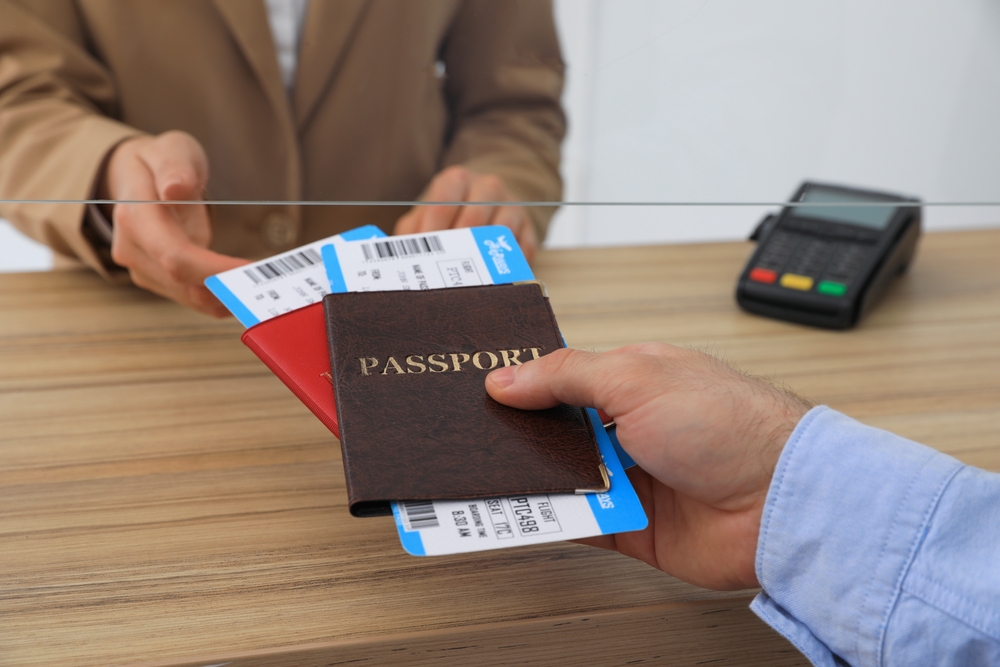
It’s time to soak in some culture ! Whether you want to go see a show, check out an art exhibit, watch a local movie or visit the next town (or country) over, you’ll need to buy some sort of ticket.
We’ll start with some airport-specific vocabulary —bearing in mind that many of these phrases are versatile and can be used in various situations—followed by more general vocabulary.
- Su pasaporte, por favor — Your passport, please
- Quisiera cambiar mi reserva — I would like to change my reservation
- ¿Podría elegir mi asiento? — Could I choose my seat?
- Quisiera cambiar mi asiento — I would like to change my seat
- Este es mi equipaje de mano — This is my carry-on luggage
- ¿Se ha cancelado el vuelo? — Has the flight been canceled?
- ¿Dónde está la terminal internacional? — Where is the international terminal?
- ¿Dónde está la puerta de embarque? — Where is the boarding gate?
- ¿A qué hora es el embarque? — What time is boarding?
Earlier we defined entrada as an “appetizer.” Entrada has multiple meanings related to “start” or “entry,” so you can also use it to say “ticket.”
- ¿Cuánto cuesta una entrada? — How much does a ticket cost?
- Dos boletos de ida y vuelta — Two roundtrip tickets
- ¿ Tiene un pase de un día ? — Do you have a one-day pass?
- ¿A qué hora sale el próximo tren ? — What time does the next train leave?
- ¿De qué plataforma sale? — Which platform does it leave from?
- ¿Qué puerta? — Which gate?
For more specific situations, here are some words and phrases you might need when purchasing tickets:
- El espectáculo — The show / performance
- El teatro — The theater
- La exposición — The exhibit
- El cine — The cinema
- Una película — A movie
- Un vuelo — A flight
- Viaje de ida — One-way trip
- Viaje de ida y vuelta — Return trip / round trip
- El asiento de pasillo — The aisle seat
- El asiento de ventanilla — The window seat
- La primera fila — The first row
La segunda fila — The second row
La tercera fila — The third row
La cuarta fila — The fourth row
Also, as you’ve likely noticed, for anything dealing with money or quantities, you’ll want to be familiar with numbers in Spanish .
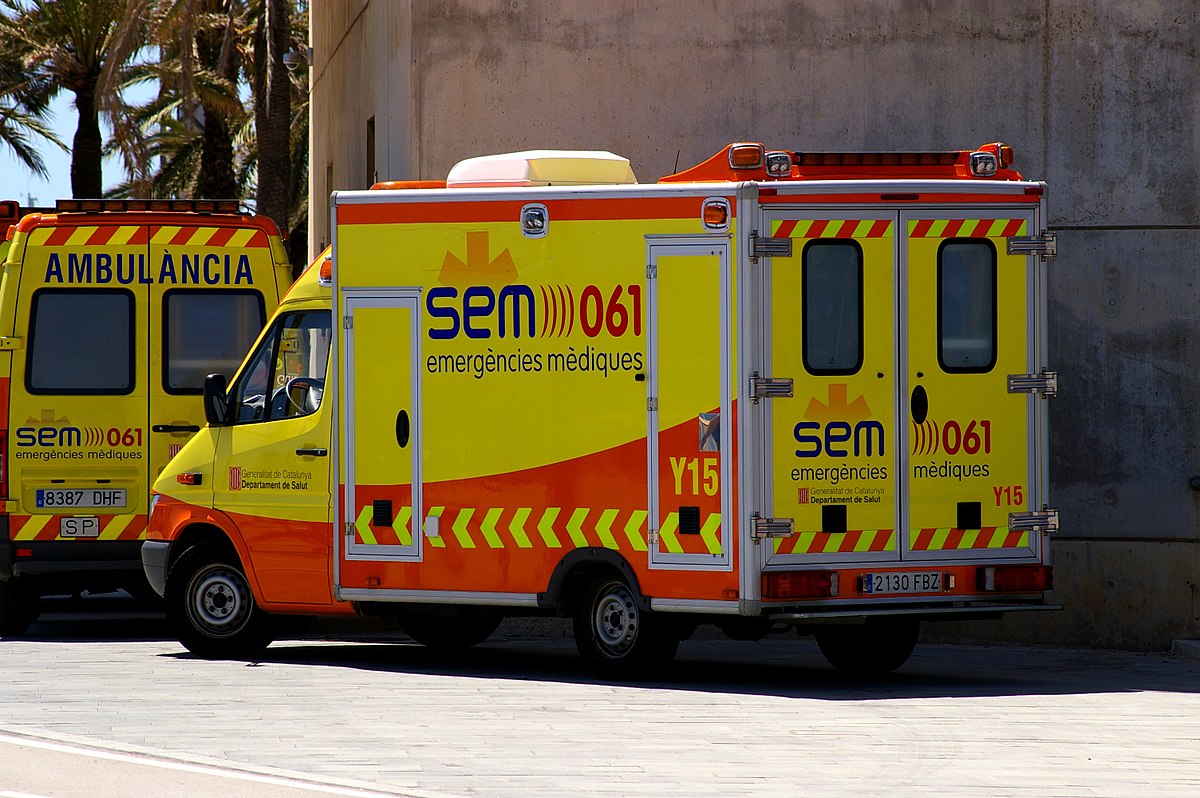
A smart traveler always comes prepared with some emergency over-the-counter meds. After all, you never know what could happen when you’re overseas.
But when those aren’t enough, these are the phrases that will help with your health-related concerns when in a Spanish-speaking country:
- ¿Dónde está la farmacia? — Where is the pharmacy?
- ¿Dónde está el hospital más cercano? — Where is the nearest hospital?
- Seguro de salud internacional — International health insurance
- No me siento bien — I feel sick / I don’t feel well
- ¿El doctor habla inglés? — Does the doctor speak English?
- ¿Necesito una receta? — Do I need a prescription?
- ¿Qué medicina necesito? — What medicine do I need?
- La cita médica — Doctor’s appointment
- La cita de seguimiento — Follow-up appointment
If you need help explaining your symptoms, these terms will help you out. With the exception of the last phrase, start off by saying tengo , followed by any of the below:
- Un resfriado — A cold
- Dolor de garganta — Sore throat
- Tos — Cough
- Fiebre — Fever
- Dolor de cabeza — Headache
- Dolor de estómago — Stomachache
- Dolor de espalda — Backache
- Resaca — Hangover
- Me gotea la nariz — I have a runny nose

Of course, a trip to a Spanish-speaking country wouldn’t be complete without a little ¡fiesta! (carnival; party). If you’re keen to hit the town, here are a few phrases to help you get your groove on.
- ¡Salud! — Cheers!
- ¿Hay algún bar por aquí? — Is there a bar around here?
- ¿Dónde están las discotecas? — Where are the clubs?
- ¿A qué hora abren las discotecas? — What time do the clubs open?
- ¿Me recomienda un lugar para bailar? — Can you recommend me a place to dance?
- ¿Quieres bailar conmigo? — Do you want to dance with me?
- ¡Bailemos! — Let’s dance!
FluentU takes authentic videos—like music videos, movie trailers, news and inspiring talks—and turns them into personalized language learning lessons.
You can try FluentU for free for 2 weeks. Check out the website or download the iOS app or Android app.
P.S. Click here to take advantage of our current sale! (Expires at the end of this month)

Try FluentU for FREE!
Do you feel more prepared for your trip now? Pack these Spanish travel phrases with the rest of your essentials and you’ll be sure to get the most from your vacation!
If you've made it this far that means you probably enjoy learning Spanish with engaging material and will then love FluentU .
Other sites use scripted content. FluentU uses a natural approach that helps you ease into the Spanish language and culture over time. You’ll learn Spanish as it’s actually spoken by real people.
FluentU has a wide variety of videos, as you can see here:

FluentU brings native videos within reach with interactive transcripts. You can tap on any word to look it up instantly. Every definition has examples that have been written to help you understand how the word is used. If you see an interesting word you don’t know, you can add it to a vocab list.

Review a complete interactive transcript under the Dialogue tab, and find words and phrases listed under Vocab .

Learn all the vocabulary in any video with FluentU’s robust learning engine. Swipe left or right to see more examples of the word you’re on.

The best part is that FluentU keeps track of the vocabulary that you’re learning, and gives you extra practice with difficult words. It'll even remind you when it’s time to review what you’ve learned. Every learner has a truly personalized experience, even if they’re learning with the same video.
Start using the FluentU website on your computer or tablet or, better yet, download the FluentU app from the iTunes or Google Play store. Click here to take advantage of our current sale! (Expires at the end of this month.)
Enter your e-mail address to get your free PDF!
We hate SPAM and promise to keep your email address safe


Travel Spanish: 70+ Essential Phrases for Your Trip
Updated on January 28, 2024 by Lou Mac
So you’re planning to visit a Spanish-speaking country (woohoo!). But how much language prep have you done for your trip?
Knowing basic travel Spanish is essential for any trip: for communicating with locals to find the best restaurants, asking for directions, and perhaps most importantly, in any emergency situation.
So, we’ve compiled this list of Spanish words and phrases that will be useful for when you immerse yourself in Hispanic culture.
If you’re unsure about the pronunciation of these phrases, this guide to Spanish pronunciation will help you understand all the basics!
Essential Travel Spanish Basics
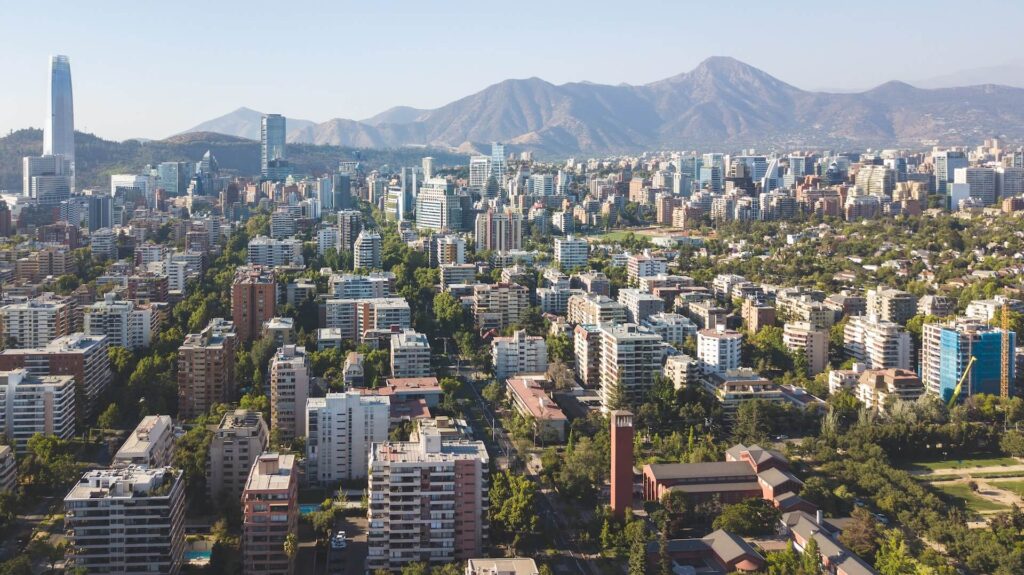
The following words and phrases are worth going over and over until you can say them pretty much automatically, as they will be some of the basic building blocks to your Spanish knowledge.
- Hablo español / No hablo español . — I speak Spanish / I don’t speak Spanish.
- ¿Tiene…? — Do you have…?
- Tengo… no tengo… — I have… I don’t have…
- Entiendo, no entiendo — I understand, I don’t understand
- ¿Entiende? — Do you understand?
- Quiero, no quiero — I want…, I don’t want… E.g. quiero un boleto, un taxi, un hotel — I want a ticket, a taxi, a hotel…
- Me gustaría, no me gustaría… — I would like…, I wouldn’t like… (This one is more polite)
- ¿Dónde está…? — Where is… ?
- ¿Cuánto cuesta? — How much does it cost?
- ¿Qué hora es? — What time is it?
How to Ask for Directions in Spanish

Learning how to ask for directions is perhaps not as essential as it was twenty years ago, before the development of the internet and Google Maps.
However, if you find yourself in a situation where you can’t use your cellphone (which can easily happen!), you should know the basic Spanish phrases and vocabulary for finding your way around.
- ¿Dónde está…? — Where is the…?
- ¿ Cómo llego al centro? — How do I get to the centre/downtown?
- ¿Hay un restaurante bueno por aquí? — Is there a good restaurant around here?
- Busco un hotel/hostal — I’m looking for a hotel/hostal
With the phrases above you can ask for directions to other places, such as the bank, a bathroom etc. Here is some useful vocabulary to substitute into these phrases:
- El baño — the bathroom
- Un tren — a train
- La calle — the street
- Un cajero automático — an ATM
And lastly some practical vocab to help you understand the helpful directions people give you:
- A la derecha — to the right
- A la izquierda — to the left
- Derecho — straight ahead
- Una cuadra — a block
- Sigue… — keep going…
How to Ask for Help in Spanish

While there are many things you must learn if you want to speak Spanish, knowing how to ask for help is key to surviving in a Spanish-speaking country.
A few phrases or words will make things much easier if an emergency occurs or you are in trouble, including the following:
Note: These examples use the “formal” way of speaking to people.
- ¿Puede ayudarme? — Can you help me?
- ¡Ayuda! — Help!
- Necesito ayuda — I need help
- ¡Llame a la policía! — Call the police!
- ¡Llame a la ambulancia! — Call the ambulance!
- Ayúdeme, por favor . — Help me, please
- ¿Podría ayudarme, por favor? — Could you help me, please?
- ¿Podría explicarlo, por favor? — Can you explain it to me, please?
- ¿Cómo se escribe…? — How do you write…?
- ¿Cómo se dice…? — How do you say…?
Spanish for Medical Emergencies

It’s also important to know words in Spanish that can help us deal with a medical emergency.
- No me siento bien — I don’t feel well
- ¿Dónde está el hospital más cercano? — Where is the nearest hospital?
- ¿Puede llamar a la ambulancia? — Can you call the ambulance?
- ¿Dónde está la farmacia? — Where is the drugstore/pharmacy?
- ¿El doctor habla inglés? — Does the doctor speak English?
- ¿Necesito medicinas? — Do I need medication?
- ¿Qué medicina necesito? — What medicine do I need?
- Tengo un seguro de salud internacional — I have international health insurance
Navigating Your Accommodation in Spanish
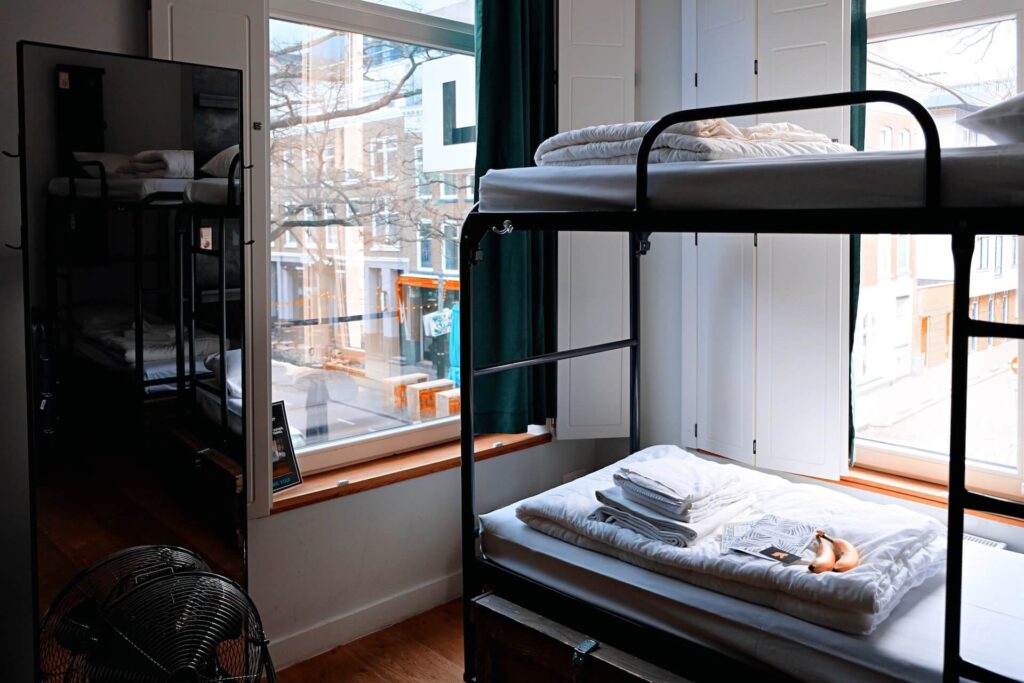
Once you’ve found the perfect place to stay, here’s how to get yourself checked in and comfortable:
- Tengo una reserva a nombre de Harry Potter — I have a reservation under the name Harry Potter
- Necesito un hotel / un cuarto / un cuarto con baño — I need a hotel / a room / a room with a bathroom
- Me gustaría quedarme por dos noches — I would like to stay for two nights
- ¿Tiene una habitación doble? — Do you have a double room?
- ¿Dónde está la piscina / gimnasio? — Where is the pool/gym?
- ¿A qué hora es el desayuno? — What time is breakfast?
- ¿Cuál es la contraseña de WiFi? — What is the WiFi password?
Essential Spanish for Eating Out

The most important travel Spanish phrases to add to your mental toolbox are those surrounding eating out—either because we are hungry (obviously) or we want to experience the wonderful local gastronomy.
This list of expressions and words could save your life (well, your stomach) on your next adventure in a Spanish-speaking country.
In addition to the vocabulary below, a useful resource are these scenario podcast episodes we did about ordering vegetarian food in Spanish , and ordering coffee in Spanish .
To make things easier, we have divided these restaurant-related words and phrases into several categories. Check them out below:
When Arriving or Booking a Table
- Quisiera reservar una mesa — I would like to book a table
- Quisiera reservar una mesa para dos — I would like to book a table for two
- ¿Tiene alguna mesa disponible? — Is there any available table?
- Tengo una mesa reservada a nombre de Hermione Granger — I have booked a table under the name of Hermione Granger
When Ordering
- ¡Camarero / garzón! — Waiter !
- ¿Podría traerme el menú, por favor? — Could you bring me the menu, please?
- ¿Qué me recomienda? — What do you recommend?
- ¿Podría recomendarme un plato local, por favor? — Can you recommend me a local dish, please?
- Para beber, me gustaría… — To drink, I would like…
- Como entrada, me gustaría.. . — As a starter, I would like …
- Como plato principal, me gustaría… — For the main course, I would like…
- De postre, me gustaría… — For dessert, I would like…
During the Meal
- Perdone, ¿podría traerme…? — Excuse me, could you bring me…?
- Perdone, ¿podría traerme más servilletas? — Excuse me, could you bring me some more napkins?
- Perdone, ¿podría traerme otra copa de vino ? Excuse me, could you bring me another glass of wine? (learn this one by heart 🍷)
- La comida está muy rica . — The food is delicious
- La carne está demasiado hecha — The meat is overcooked
- La carne está poco hecha — The meat is undercooked
When Paying and Leaving
- La cuenta, por favor — The bill, please
- Estaba todo muy rico, gracias — Everything was very tasty, thanks
- Quisiera pagar con tarjeta — I’d like to pay by card
- Quisiera pagar en efectivo — I’d like to pay in cash
- Creo que hay un error — I think there’s a mistake
Lastly, if you’re a foodie like me, you might want to know some food recommendations. Click here to learn about the different foods you must try if you’re visiting Chile!
Resources to Learn More Travel Spanish
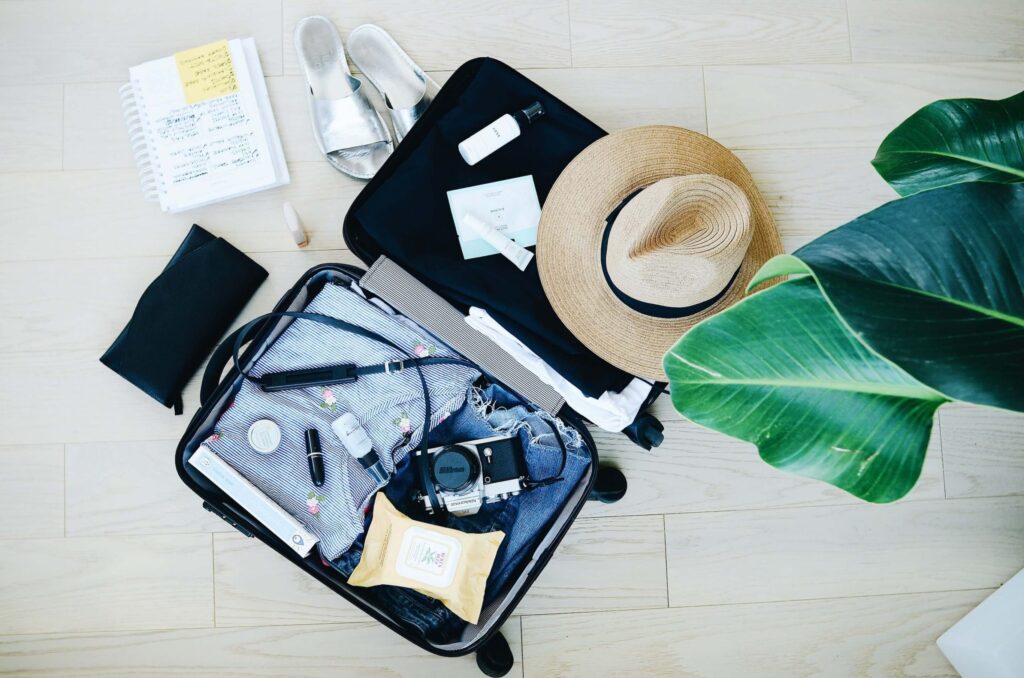
If you’ve decided you want to know a bit more than just the survival Spanish, here are a few resources to kick-start your Spanish journey.
- Seeing in Spanish Podcast. Our own language learning and travel podcast aims at helping you self-learn Spanish to make your travels unforgettable. To start, check out this episode on how to learn Spanish on your own .
- Duolingo. I think it’s safe to assume you know what Duolingo is! While it often gets a bad rap, it’s all about how you use Duolingo which makes the difference!
- YouTube Videos. Videos such as this video on top 20 travel Spanish phrases you should know are a great way to hear how phrases we learnt in this article are actually pronounced.
It’s also worth remembering that Spanish changes depending on what country you’re in, so you might also want to consider learning a specific Spanish dialect.
With these survival Spanish words and phrases, your next trip will be much easier and more memorable.
Now you can move on to getting excited for your adventure!

Spanish for Travelers: Spanish Travel Vocab & Resources
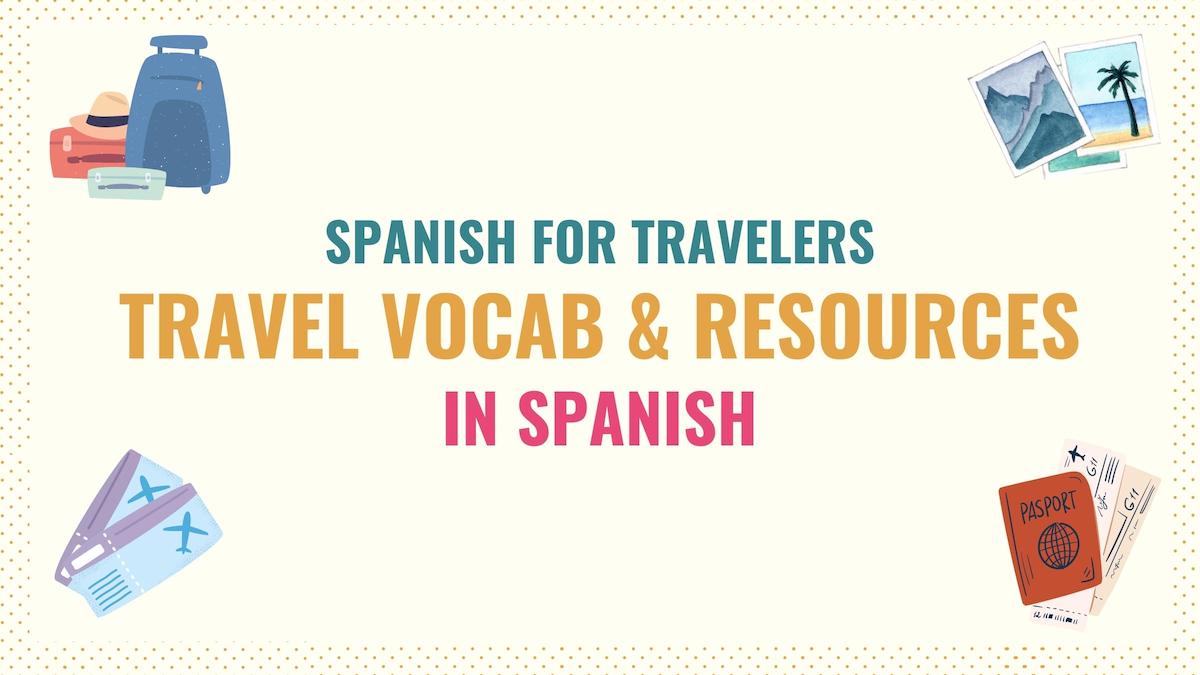
Viajar is the Spanish word for ‘travel’. If you’re planning a trip to a Spanish-speaking country, you should learn some basic expressions and words that can help you get along in different situations.
On this page, I’ve gathered some of our best resources to make your travels easier and more enjoyable. From essential travel phrases to ordering food and drinks, these guides are designed to make your interactions with locals easy and stress free.
Let’s jump right in!
- 91 Top Spanish Travel Phrases & Words for Tourists : Get familiar with these essential Spanish phrases to navigate different situations you may encounter in your trips. From being at the airport to shopping and more. I’ve seen courses where people pay for the exact same information in this guide. Save that for your trip and read this instead!
- How to Ask for & Reserve a Hotel Room in Spanish : Check this guide to learn expressions and vocabulary related to hotel accommodations. Everything travelers need to book a hotel room from the Spanish phrases to use to reserve a room to talking about dates and more.
- The Ultimate Guide on How to Order Food : If you’re traveling to Spain or a Spanish-speaking country in Latin America, you’re likely to try the local food. In this guide, you’ll find the key Spanish phrases, questions and words you need to order dishes at restaurants you visit while you travel.
- A Vegetarian and Vegan’s Guide to Ordering Food : This guide will give you the Spanish vocabulary you need to help you navigate menus and order delicious vegetarian and vegan meals with confidence. It includes the specific words you’ll need to ask if dishes adhere to your diet.
- The Complete Guide on Ordering and Asking for Drinks in Spanish : Enjoy your favorite beverages and connect with locals using this step-by-step guide on ordering and inquiring about drinks in Spanish.
Additional Spanish Resources to Speak When Traveling
The guides listed above are enough to help you communicate during your trips. If you want to take your conversational skills further, you can also learn some common greetings in Spanish . Also, adding some basic nouns and essential verbs to your vocabulary can help you express your ideas more effectively.
¡Buen viaje!
Daniela Sanchez
¡Hola! Soy Daniela Sanchez, I've been studying Spanish professionally as well as teaching it in Mexico and online for over 10 years. I’ve taught Spanish to a wide array of foreigners from many backgrounds. Over the years, I've made it my mission to work hard on refining many challenging to understand grammar topics to make my students' learning experiences easier, faster and more enjoyable. Read More About Me
Recent Posts
Verbs Like Gustar in Spanish: Conjugations + Must-Know List
Gustar and verbs like gustar convey the feelings and emotions that the subject provokes on someone or something. Their key differentiator is that they inverse the sentence order. Unlike most...
Muy vs Mucho: Key Differences Explained (+ Examples)
Muy means ‘very’. It intensifies the qualities described by an adjective or another adverb. Mucho is the equivalent of ‘a lot’ or ‘very much’, and it conveys the intensity or degree of an...
Pin It on Pinterest
101 Common Spanish Phrases for Travel
It’s time to travel! Are you going to a Spanish speaking country? These 101 common Spanish phrases for Travel will help your trip go smoothly, and your journey will be much more enjoyable. If you can memorize these phrases before your trip, that’ll be ideal.
But let’s face it, you are busy. Most likely, you’ll be even busier as your departure date gets closer. But don’t worry, I have created this common Spanish phrases for travel pdf for you! It contains all the travel phrases and words that appear in this post.
Sign up to get your copy of our common Spanish travel phrases pdf for free!
Get Your Free Copy of the Survival Spanish Phrases for Travel!
Signup to receive our freebies and newsletter!
You have successfully joined our subscriber list. Please check your email.
101 Common Travel Phrases in Spanish PDF
Be sure to download it right now so you’ll have it on your cell phone, tablet, or laptop when you are abroad. It’s always a good idea to have it saved on your device, just in case you don’t have access to the Internet when you need it. You can sign up below to get a link to download the basic common Spanish phrases for the travel pdf file sent to you.
As an Amazon Associate, I earn from qualifying purchases. See our disclosure here .
What are the Common Spanish Phrases for Travel?
Here, we’ll cover 101 common Spanish phrases for travel that you will definitely want to know.
First, let’s start with basic greetings and pleasantries, and move on to some of the very common and super useful Spanish verbs. Then we’ll talk about some Spanish travel phrases for getting around and shopping.
Also, you’ll learn common Spanish phrases and words you will need at restaurants or hotels, and tourist activities.
Lastly, we finish up with the important Spanish phrases for emergencies, just in case. So, let’s begin!
What are the Spanish words for travel?
First, what are the words for travel in Spanish? Below are the words that mean travel or a trip.
To travel – Viajar
To go on a trip – Ir de viaje
A trip – un viaje
Basic Spanish Phrases for Travel: Greetings and Pleasantries
When you are traveling to a Spanish-speaking country, learning some basic Spanish phrases goes a long way. Even if you don’t pronounce them correctly or make mistakes, most people would appreciate the time and effort you put into learning their language. So let’s start with some very basic Spanish phrases for travelers.
Hi – Hola
You can use this any time of the day as it means “Hi” or “Hello”, but people usually say this and then say one of the other greeting phrases below depending on the time of the day. So, for example, you might say, “Hola, Buenos días.”
Good morning
Buenos días
This is normally used in the morning hours before 12 noon.
Good afternoon
Buenas tardes
Then you would switch to “ buenas tardes ” in the afternoon until it gets dark outside.
Buenas noches
People would start saying “buenas noches” when it’s dark outside…maybe around 6pm-ish.
Good Bye – Adiós
A typical goodbye in any Spanish-speaking country in the world.
See you later.
Hasta luego.
Even though you may not be seeing each other for a long time or ever like a store clerk, it is common to say “hasta luego ” especially in Spain.
Excuse me (Can I have your attention?) / (Can I pass by?)
Discúlpe / Con permiso
So “ Discúlpe” is used to get someone’s attention. “ Con permiso ” basically means “with your permission.” You would say this when you walk in front of someone or need to pass by people in a crowded place because they are blocking your way. It’s like saying, “Excuse me, I’m passing by you.”
It’s always polite and good etiquette to say “please” in any country, right?
Don’t forget to show your gratitude and appreciation when someone did something nice for you.
No thank you
If you are not interested, you can politely decline by saying, “no gracias.”
What is your name? – ¿ C ó mo se llama usted?
This is a formal version and an informal version is “ ¿C ómo te llamas?” In Mexico or Latin America, it would be better to use the formal version. In Spain, the informal version is pretty common unless you are speaking to someone who is much older than you or a government official, doctor, police officer, etc., you get the idea. A general rule of thumb is if your conversation partner looks about your age or younger, then it’s safe to use the informal version.
My name is ________. – Me llamo ______.
This means literally, “I call myself _______.” You can also say “Soy + your name.”
Nice to meet you. – Mucho gusto (Mexico), Encantado/a (Spain)
In most Latin American countries, “mucho gusto” is the most common way to say “nice to meet you.” In Spain, if you are female, you would say “encantada” ; and if you are male, you would say “encantado.”
How are you? – ¿ C ó mo est á usted?
This is a formal way to ask how a person is. If you are talking to a friend or someone about your age or younger, you can say, “ ¿C ómo est ás?”
I’m good. – Estoy bien.
Just a simple “bien” would work as well. However, to be more polite, you can add “gracias,” so it’ll be “estoy bien, gracias” or “bien, gracias.”
Do you speak English? – ¿Habla inglés?
If you are asking this question to someone, you probably don’t know this person. So it would be appropriate to use this formal form. If you are asking a child or someone who is about your own age or younger, you can use an informal form and say, “ Hablas inglés? “
I don’t speak Spanish. – No hablo espa ñ ol.
Yes / No – Sí / No
I’m sure you’ve heard of these before. Yes!
Traveling soon? Don’t forget to check out this list of 75 Best Travel Accessories to see if you already have them! Many of them are Anti-Theft Products to help protect you and your belongings!
Can you speak slowly? – ¿ Puede hablar m á s despacio?
Natives seem to speak really fast when you first start learning a new language. So you can ask them to speak slowly.
Can you repeat it? – ¿Puede repetirlo?
You can also ask them to repeat what they have just said by saying this phrase.
I understand – Entiendo.
If you understand what they are saying, you can say “entiendo.” If not, you can say the following…
I don’t understand – No entiendo.
Well, if you don’t understand what they are saying, don’t just agree. Make sure you understand what they are saying by asking them to write it down. Once it’s written down, you can use Google to translate it!
Can you write it down, please? – ¿Puede escribirlo?
Yup, ask them to write it down or at least confirm by repeating what was said. You might want to keep a pen in your purse when traveling.
A little – un poco
You may hear other versions like “un poquito” or “un poquit ín” meaning a little tiny bit.
A lot – mucho
Also, you can use “un montón” meaning “A LOT!”
Nothing – Nada
Well, I have nothing to add…ha ha ha, sorry… (by the way, in Spanish, ha ha ha is written “ja ja ja”)
What time is it? – ¿Qu é hora son? (Mexico), ¿ Qu é hora es? (Spain)
For some reason, in Mexico, hora (hour) is used as a plural form, that’s why “son” is used instead of “es.”
Common Spanish Verbs for Travel: Need, Want, and Have
I need ________.
Necesito ________.
I don’t need _____.
No necesito _______.
I want ________.
Quiero_________.
I don’t want _______.
No quiero ________.
Do you have ______?
Tiene ______?
I have _______.
Tengo ________.
I don’t have _______.
No tengo ______.
Spanish Phrases for Transportation and Getting Around
Where is the bus stop? – ¿D ónde est á la parada de autob ús?
If you are looking for a bus station/terminal where many buses meet, you can use “Central de autobuses”, “Terminal de autobuses”, or “Estaci ón de Autobuses.” The last one is more common in Spain.
Do you go to downtown? – ¿Va al centro?
If you are unsure about which bus to take, you can always ask the bus driver if his/her bus goes to where you intend to go before you get on.
How do I get to the Museum of Natural History? – ¿C ómo llego al museo de histor ia natural?
You can use this phrase to ask for directions to some place.
Is it close? – ¿Est á cerca?
This is a bit tricky one because in most Spanish-speaking countries, people often tell you “it’s close,” but that doesn’t really mean it’s close! It could be, but you just never know how a person feels about a distance.
Is it far? – ¿Est á lejos?
If it’s far, you can also ask “ ¿Cu ánto tiempo se tarda en llegar allí?” – How long does it take to get there? to clarify how far it is.
What time does the train leave? – ¿A qu é hora sale el tren?
Whether it’s your train, bus, or flight, you can use this phrase to ask its departure time. The bus is “el autob ús” and the flight is “el vuelo.”
It leaves at 8:30 in the morning. – Sale a las ocho y media de la mañana.
More about the numbers a little bit further down. If it’s in the morning, “ de la mañana” and in the afternoon and early evening, “de la tarde.” And at night, “de la noche” and in the really early morning would be “de la madrugada.”
What time does it arrive? – ¿A qu é hora llega?
So this is referring to the transportation or a third person (he/she/it). What time do we arrive? Would be “ ¿A qu é hora llegamos?”
It arrives at 3 in the afternoon. – Llega a las tres de la tarde.
If you want to say “We arrive” then use “Llegamos.”
Where can I buy tickets? – ¿ D ó nde puedo comprar boletos? (Mexico), ¿ D ó nde puedo comprar billetes?
In Mexico, tickets are called “boletos” ; but in Spain, they are called “billetes.” “Billetes” also meansbills in both countries. For example, “un billete de d ólar” means a dollar bill.
Round trip/one way – Viaje redondo / viaje sencillo (Mexico), ida y vuelta / S ó lo ida (Spain)
I would like 2 tickets. – Me gustar ía dos boletos. (First class, Economy class – premera clase, clase econ ómica )
Again, tickets are “billetes” in Spain. One ticket would be “un boleto” or “un billete.”
I missed my flight. – Perd í mi vuelo.
Literally, it means “I lost my flight.” So, you can swap the noun and say “Perd í mi maleta” – “I lost my suitcase” as well.
Here’s my passport. – Aqu í est á mi pasaporte.
Another similar phrase is “ Aqu í lo tiene,” basically meaning “here you have it” or “here it is.”
I’m here on vacation/on holiday. – Estoy aqu í de vacaciones.
In Spanish, vacation is usually plural “vacaciones.”
I’m going to stay for one week. – Me voy a quedar una semana (two weeks – dos semanas).
Staying only for a few days? Then you can say, “Me voy a quedar unos d í as.” “ Day” in Spanish is “d ía” (singular) and “d ías” (plural) and month in Spanish is “mes” (singular) and “meses” (Plural).
Where is the baggage claim? – ¿ D ónde está el reclamo de equipaje?
There are several different words for baggage claim: la cinta de maletas, la cinta de equipaje, la cinta de recogida de equipaje , etc. “Equipaje” means luggage.
I can’t find my suitcase. – No encuentro mi maleta.
If you can’t find a person, then you would add “a” in front of the person’s name. For instance, “No encuentro a Maria.”
How much does it cost to take me to________? (Taxi) – Cuanto por lleverme a _______?
Ask a cab driver how much it costs to take you to your destination before getting on the cab to avoid any unpleasant surprises. Researching how much a taxi to your destination should cost beforehand can give you a general idea.
Stop here, please. – Pare aqu í, por favor.
Wait a moment, please. – Espere un momento, por favor.
Is it free? (open/available) – ¿Est á libre?
Common Spanish Travel Phrases and Words for Shopping
I need to exchange dollars for pesos. – Necesito cambiar d ólares por pesos.
Banks in other countries tend to close earlier than the ones in the U.S. So if you think you might need to get some cash out, don’t forget to plan ahead.
Is there______? – ¿Hay _____?
This one is very easy but useful at stores, restaurants, and many other places.
What is that? – ¿Qué es eso?
You can point something and ask “ ¿Qué es eso?” If it’s right by you, then “ ¿Qu é es esto?” (What is this?).
Can I see it? – ¿Puedo verlo?
“ ¿Puedo?” means “Can I?” A very useful phrase. Definitely, it’s helpful to memorize this one.
I’m just looking. – Solo estoy mirando.
When you walk into a store and a store clerk asks you if they can help you find something. You can say , “ Solo estoy mirando. Gracias.” if you don’t intend to buy anything. At most department stores, store clerks work on commission, so they tend to be very eager to help you.
Can I try it on? – ¿Me lo puedo probar?
“El probador” means the fitting room.
Do you have size 40? – ¿Tiene talla cuarenta?
Clothing and shoe sizes are quite a bit different in each country, so be sure to check online before you go and get a general idea.
Numbers: 1, 2, 3, 4, 5, 6, 7, 8, 9, 10, 20, 30, 40, 50, 60, 70, 80, 90, 100
– N ú meros: uno, dos, tres, cuatro, cinco, seis, siete, ocho, nueve, diez, veinte, treinta, cuarenta, cincuenta, sesenta, setenta, ochenta, noventa, cien
This quick study guide is packed with useful information and has a section on numbers as well. It is a perfect reference flip chart for beginners.
You can also learn how to pronounce Numbers in Spanish in this post .
t’s too big/small – Es demasiado grande/chico (or chica).
“Grande” means big or large, and “chico(a)” means small (you can also use “peque ño(a)” ). I wouldn’t worry too much about whether the object you are referring to is a feminine or masculine noun at this point. People will understand you even if you don’t match the genders.
“Demasiado” means “too” something (adjective). So you can use it to say so many other things. For instance, “Es demasiado largo” (it’s too long), “Es demasiado corto” (It’s too short.).
How much is it? – ¿Cu ánto cuesta?
You can just point at something and say, “ ¿Cu ánto cuesta?” And if you are buying multiple ítems and want to know how much the total cost is, you can say, “ ¿Cu ánto cuesta en total?” or ¿Cu ánto es?
It’s too expensive. – Es demasiado caro.
Similar to the phrase above. “Caro(a)” means expensive, and “barato(a)” means cheap.
Can you give me a discount? – ¿ Me puede dar un descuento?
In Mexico and Latin America, if you are shopping at a local market, you can almost always get a discount. So it’s worth asking so you don’t end up paying tourist’s prices.
Do you have anything cheaper? – ¿Tiene algo m ás barato?
This is kind of similar to the one above. “Algo” means something or anything, and “m ás” means “more” and makes an adjective comparative when you put it before the adjective. Less is “menos.”
I’ll take it. – Me lo llevo.
If you like it and you’re going to buy it, then you’ll say “me lo llevo.” If you’re buying multiple items, a plural form of “ lo” which is “los” should be used. So you’ll say “me los llevo.” If you want to be super correct, select one of the followings “lo, la, los, or las” to match the gender of the item(s) you are purchasing…but that’s not crucial at all, so no worries.
Do you accept credit card? – ¿ Aceptan tarjeta de cr é dito?
Cash is “efectivo” and debit card is “tarjeta de d ébito” although most U.S. debit cards are not accepted at stores in foreign countries.
Check out these 75 Cool and Useful Travel Accessories You Can’t Leave without!
What time does it open? – ¿A qu é hora cierran?
In mid-to small-sized cities in Spain, many stores close for lunch for a few hours, then reopen after lunch. Their lunch is from about 2 pm to 4 or 5 pm.
What time does it close? – ¿A qu é hora abren?
Banks tend to close earlier than the ones in the U.S., and they often have different (shorter) business hours for Fridays and Summer months as well.
Useful Spanish at a Restaurant or Hotel
While traveling, these Spanish phrases will definitely come in handy. At a bar or café, you can just pick any available table, but I would recommend making a reservation if you are going to a restaurant.
I have a reservation. – Tengo una reservaci ón.
You can use this phrase at a restaurant or at a hotel when you check in.
Is there free wifi? – ¿Hay wifi grat ís?
“El Usuario” is the user name and “la contraseña” is the password.
I lost the key to my room. (at a hotel) – Perd í la llave de mi habitaci ó n.
It doesn’t work. – No funciona.
If something in your hotel room doesn’t work, you can say, “ No funciona + the thing that’s not working. ”
I would like _______. – Me gustar ía _______.
You can also say, “Quisiera______” “Quisiera” is a more polite form of “quiero” – I want.
I would not like_______. – No me gustar ía _______.
Is this spicy? – ¿Esto pica? or “Es picante?”
Mexican salsas can be super spicy, so I always ask before trying them…although they often say, “no, no pica nada!” – “no, it’s not spicy at all!” Spanish food is generally not spicy, though.
Is it sweet or salty? – ¿Est á dulce o salado?
If you are like me and enjoy trying new foods, you’ll need this phrase.
Gluten free – Sin gluten, Libre de gluten
Gluten-free products are not as common in Spain or Latin American countries as they are in the U.S. Or I should say most products are not labeled “gluten-free” as they are in the U.S.
The bill, please. – La cuenta, por favor.
You will need this phrase at restaurants.
Is tip included? – ¿ Est á incluído la propina?
In Spain, tipping is not customary at Tapas bars although appreciated. However, when dining at a restaurant in both Spain and Mexico, 10-15% of the bill is common if the service fee is not included.
Where is the bathroom? – ¿ D ó nde est á el ba ñ o? or “ ¿ D ó nde est án los ba ñ os? (plural)
Another word for the restroom is “ el servicio )” in Spain.
Occupied/busy – Ocupado
For example, “El ba ño est á ocupado.” – The bathroom is occupied.
“Estoy ocupado(a)” – I’m busy.
Vacant – Libre (bathroom), Vacante (hotel rooms)
“Libre” also means available or free.
Essential Spanish Phrases for Tourist Activities
Is it free? (no cost) – ¿Es grat ís?
Can I enter? (is it allowed to enter?) – ¿Se puede entrar?
If you are not sure if it’s okay to enter, it’s good to ask first, especially at religious places or semi-private tourist spots.
Is it safe? – ¿Es Seguro?
Is it dangerous? – ¿Es peligroso?
No smoking – No fumar.
Smoking is prohibited in enclosed public places in at least Spain and Mexico. So, bars, restaurants, nightclubs, etc. are non-smoking.
Do not touch – No tocar.
You’ll often see a sign with this phrase and an image of a hand crossed out at museums, historical buildings, etc.
I want to go to _______. – Quiero ir ______.
You can use this phrase for a taxi driver, a bus driver, someone when you are asking for a direction, etc.
Important Spanish Phrases for Emergencies
Can you help me? – ¿Me puede ayudar?
If you need help with your luggage or you are lost, this phrase will come in handy.
My wallet was stolen. – Me robaron mi caretera.
“Me robaron” + whatever the item that was robbed. Be extra careful of pickpockets, especially in big cities or in crowded places.
I don’t feel well. – No me siento bien.
When you feel better, you can say, “me siento mejor.” “Mejor” means better, and “peor” means worse.
My stomach hurts – Me duele el est ómago.
The basic structure of this sentence is “Me duele” + the part of your body that is hurting. You can also find more phrases and vocabulary about your physical conditions on this post.
I need to go to hospital. – Necesito ir al hospital.
Remember the “H” is silent. So, you would pronounce “hospital” as though it’s “ospital” with an accent on the “a”.
Help! – ¡Socorro!
Hopefully, you won’t need to use this one or any of these phrases in this emergency section while traveling, but it’s better to be prepared. So, don’t forget to memorize this word just in case.
Are You Ready to Use These Spanish Phrases for Travel?
I’m so excited for you that you are going to Spanish-speaking countries soon or planning a trip in the future. Hope you have a super fun adventure wherever and whenever you go! I hope these Spanish travel phrases help your trip be trouble-free and filled with wonderful, lasting memories.
Oh, did you download our free basic Spanish phrases pdf ? You can print it out and tuck it in your backpack pocket or save it on your digital devices. Here’s where you can download it.
Oh, one last thing…
How to say be safe in Spanish?
In Spanish, “Be safe!” can be translated as either one of these four phrases.
¡Que vuelvas sano y salvo! (Hope you return safe and sound)
¡Que regreses sano y salvo! (Hope you return safe and sound)
¡Que te vaya bien en tu viaje! (Hope everything goes well with your trip)
¡Que te salga bien en tu viaje! (Hope everything turns out well for your trip).
As you have noticed that their literal translations are a bit different, but these are the closest phrases in Spanish that there are to “be safe” in English.
Don’t forget to check out this post: How to say Airport in Spanish: Spanish words and phrases you need at the airport.
Have an amazing trip and Happy Spanish-ing!
Interested in Learning Conversational Spanish?
Try these posts and unlock your Spanish superpower!
- 30 Spanish Conversation Starters Every Spanish Learner Should know
- 15 Fun and Easy Spanish Learning Hacks I Used to Become F luent Fast
- Spain vs Mexico: What Are the Differences between Spain Spanish and Mexican Spanish?
- 20 Popular Songs in Spanish: Latin Music for Learning Spanish Fast!
- 101 Survival Spanish Phrases for Travel Every Traveler Needs to Know
- How to Introduce Yourself in Spanish
- Easy Spanish Greetings: How to Greet in Spanish
Pin it for Later!
Click here to see “75 Super Useful Travel Essentials Every Traveler Needs!”
Nice job! You got the basic Spanish phrases for greetings down. Now a little bit longer phrases, but don’t worry, they are not too complicated. Trust me, it’s worth learning these Spanish phrases.
© 2020 Spanish Unlocked
- Conversations
- Food & Drinks
- Privacy Policy
70+ Spanish Phrases for Travel You NEED to Know (PLUS Free Printable)
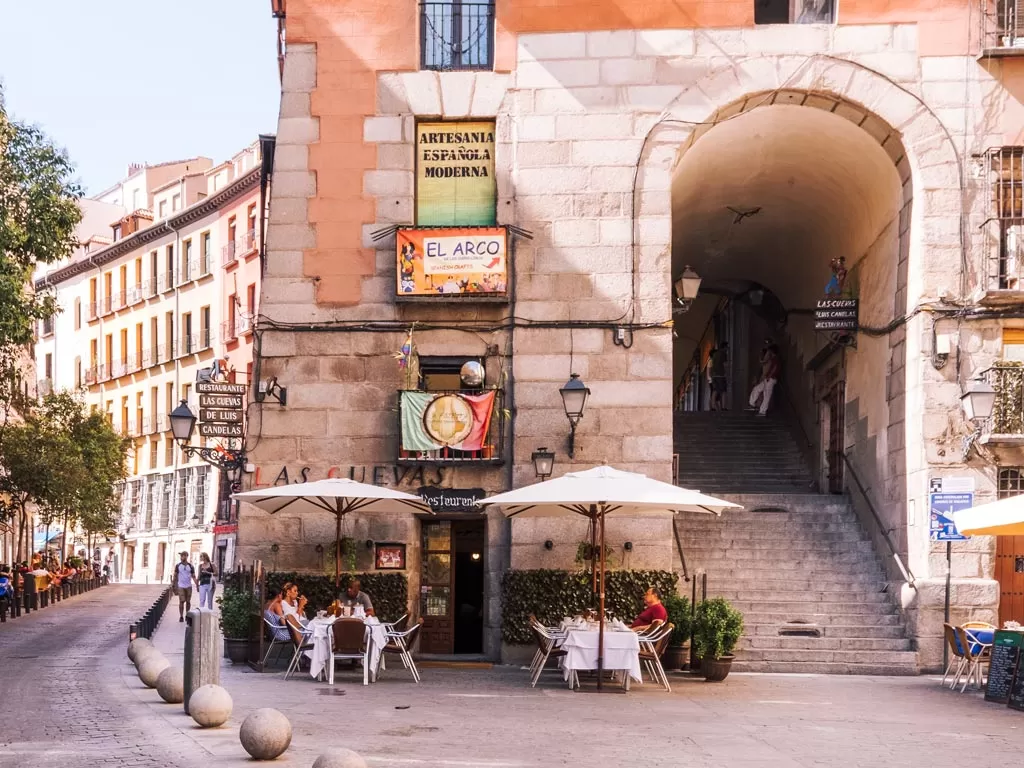
Take your Spanish vacation experience to the next level with these common Spanish phrases for travellers.
Whether you’re heading to Spain or the Americas, Spanish is one of the best and most useful languages to learn. Once you learn a few phrases, can make use of your Spanish skills in over 11 countries around the world.
Why else should you learn Spanish? Well, it makes learning other languages, especially Romance languages like Portuguese , Italian , French and Romanian much easier.
Want to have fun whilst learning European Spanish, Latin American Spanish or Argentinian Spanish? Struggling to find decent Spanish language resources available? I recommend getting uTalk . Available as a desktop site and app, uTalk is awesome for learning key words and phrases in Spanish (either in European , Latin American, or Argentinian Spanish), especially if you want to use it for travel purposes. It’s great for beginners getting started in a language and invaluable for intermediates looking to fill in gaps in their vocabulary and pronunciation.
What I love most about uTalk is that you can jump around their extensive library of topics and choose what you want to learn, when you want, and at your own pace. Because I believe in uTalk so much, I reached out to them and we’ve teamed up to offer you an exclusive 30% OFF reader discount across all of uTalk’s 140 languages! This offer isn’t available anywhere else! Click here to claim your exclusive 30% discount in European Spanish , Latin American Spanish here, and Argentinian Spanish here.
Have a laugh with these hilarious Spanish expressions
Let’s take a quick look at the Spanish language so you’re a bit more clued up on its origin, use, and vocabulary.
I hope you enjoy this post as much as I enjoyed bringing it together. If you have any requests for other languages, let me know in the comments section!
Where is Spanish spoken?
Being the official or national language in Spain, Equatorial Guinea, and 19 countries in the Americas, Spanish is one a great language to have under your belt as you travel.
There are some 418 million speakers in Americas alone. Instituto Cervantes claims that there are around 477 million Spanish speakers with native competence, 572 million who speak Spanish as a first or second language and more than 21 million students who are learning Spanish.
Spanish is one of the six official languages of the United Nations and is an official lang u age of the European Union.
A brief history of Spanish
Originating in the Castile region of Spain, Spanish ( español ) is also known as Castilian ( castellano ).
Spanish evolved from several dialects of Vulgar Latin in Iberia after the collapse of the Western Roman Empire in the 5th century.
Spanish began to spread beyond mainland Europe in the early 16th century when the Spanish Empire established colonies in the Americas, as well as territories in Africa, Oceania and the Philippines.
Ancient Greek contributed substantially to Spanish vocabulary, in addition, up to 75% of modern Spanish is derived from Latin.
What’s not well-known is that Arabic has also left a substantial mark on Spanish vocabulary having been in contact with the language very early on. Around 8% of Spanish vocabulary is of Arabic origin, making it the second most important influence after Latin.
Pronunciation
Spanish spelling is very phonetic with only a few exceptions. This means that if you know how to pronounce the letters of a word, it’s relatively easy to sound out the word itself. A bonus characteristic for new learners.
Accents and Stress
In Spanish, where you place the stress in a word can alter its meaning. Here are some general rules to follow:
- If a word is marked with an accent, then that syllable receives the stress.
- if the word ends in a consonant other than N or S , the stress occurs on the last syllable (eg. hospital = “os-pee-TAL”)>
- if the word ends in a vowel, N or S , the stress occurs on the next to last syllable (eg. muchacho = “mu-CHA-cho”)
- In Spain (Except in some parts of Andalusia, and in the Canary Islands) a English ci/ce or z sound makes a English “TH”. In Latin America, it makes the “S” sound.
Essential Spanish Phrases for Travel with Pronunciation
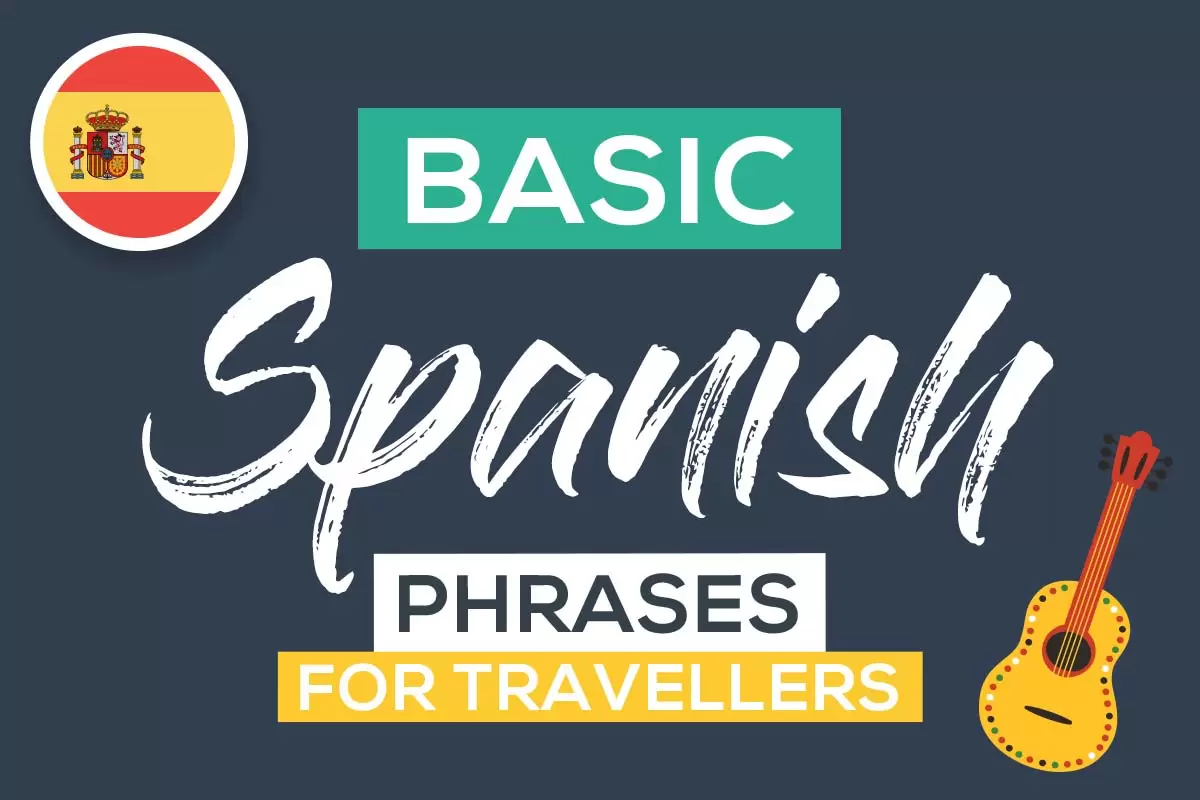
Want the infographic to take with you? Scroll to the bottom of the page.
Greetings Essentials Questions Eating Out Getting Around Numbers Days Emergencies
Learn Spanish with my 80/20 method, with Intrepid Spanish!
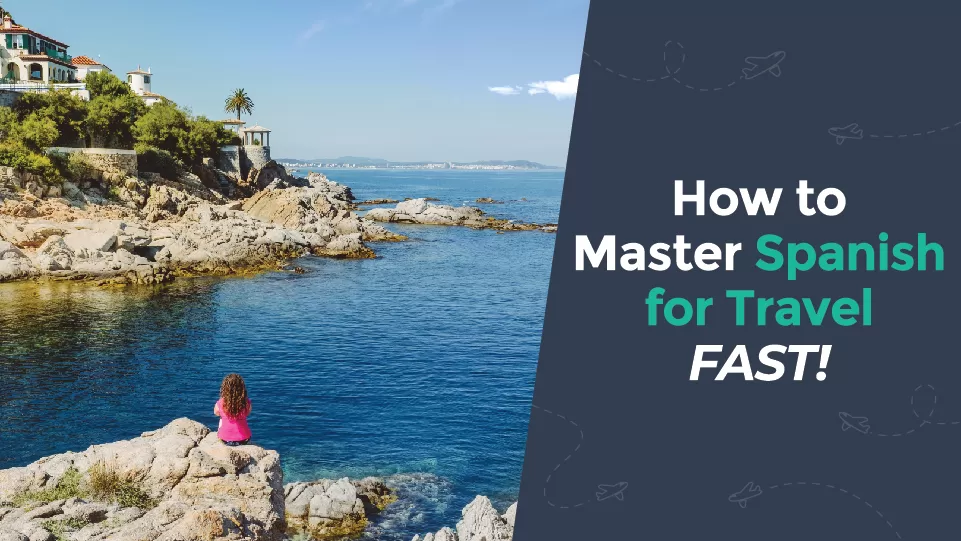
Travelling to Spain or Latin America? Don’t be treated like a tourist! Live your best travel experiences and learn Spanish for less than the cost of eating at a tourist trap restaurant or a taxi driver who has “taken you for a ride”. In addition to my free Spanish travel phrase guide , I’ve made it even easier for you to master the Spanish language so you can create lifelong memories as you mingle with locals , get local tips , avoid tourist traps , and make new friends . Join my popular Spanish course here.
Here’s what my students are saying:

I really enjoyed the Master Italian for Travel FAST course, it certainly exceeded my expectations. The learning methodology is great, and easy to follow and found that I progressed much faster in the last 4 weeks than I ever did on my own or using other language apps. Grazie mille Michele, I can’t wait until I can put my new skills into action! – Roma Small
Click here for instant access!
Like it? Pin it!

Interested in learning Spanish? Don’t miss these!
- 70+ Essential Latin American Spanish Phrases for Travellers
- 7 Top Differences Between Spain Spanish and Latin American Spanish You Didn’t Know
- 17 Embarrassingly Funny False Friends in Spanish to Avoid
- 25 Hilarious Spanish Idioms You Won’t Learn in School
- Is Spanish Hard to Learn? [7 Common Mistakes and Top Grammar Tips]
Heading to Spain?
- 13 Free things to do in Barcelona
- 19 Reasons You’ll Want to Visit Costa Brava Immediately
- 23 Beautiful Must-See Places in Madrid, Spain
- Costa Brava – Get my Ultimate 5-Day Costa Brava Itinerary
- 19 Absolute Best Things to Do in Bilbao, Spain
- 19 Absolute Best Things to do in San Sebástian, Spain’s Basque Country
Want to know more about learning languages? Start here!
- 12 Simple Tips to Improve Your Listening Comprehension in a Foreign Language
- Memrise vs Duolingo: Which Language App is Best For You?
- How to Learn Languages Like Crazy, Even If You Have a Crazy Life [3-Step Method]
- 22 Top Language Learning Resources You Should Use
- 10 Proven Memory Hacks: How to Remember New Vocabulary Faster
- How to Get Fluent: 9 Reasons You’re Not Fluent…YET! [& What To Do Instead]
- How long does it REALLY take to learn a language? [A Practical Guide]
- 18 Unexpected Advantages & Health Benefits of Learning A Foreign Language
- 23 Cool Gift for Language Learners They Will Actually Use and Love
- Mondly Review: 10 Ways Mondly Drastically Improved My Language Learning
- italki Review: Is italki A Language Learner’s Best Friend? [Prices, Tips, Pros & Cons]
- 203 Most Beautiful Untranslatable Words [The Ultimate List: A-Z]
- 6 Language Learning Tips: How to Learn a Language from Home
- What Type of Language Learner Are You? Your 4-Step Personalised Learning Plan
- 44 Best Movies on Disney Plus for Learning Languages
- 13 Ways to Seamlessly Integrate Language Learning into Your Daily Life
- 10 Pro Tips: How to Learn a Language with a Full-Time Job
- 7 Reasons Why You Should Go on a Language Holiday
- Essential Travel Phrases: How to be Travel Fluent in 10 Simple Steps
- How to Learn Your First Foreign Language in 8 Simple Steps: A Beginner’s Guide
- 11 Life-Changing Reasons Why You Should Learn a Language
- 42 beautiful Inspirational Quotes for Language Learners
- Language learning tips: 11 Polyglots Reveal The Secrets of Their Success
- Top 10 Best Ways to Learn a Language Better and Faster
Over to you!
Which of these common Spanish phrases do you find most useful? Which other phrases would you like to know? Let me know using the comments section below or join me on social media to start a conversation.
Thanks for reading and I hope you enjoyed this post.
Like what you see? Subscribe using the form below to have all of my posts delivered directly to your email.
Success! Now check your email to confirm your subscription.
There was an error submitting your subscription. Please try again.
Get my best language and travel tips FREE by email...
Subscribe to my newsletter to receive detailed travel guides, exclusive travel and language learning tips, priority access to giveaways and more!
I will never give away, trade or sell your email address. You can unsubscribe at any time.
Michele creates language learning guides and courses for travel. What separates her from other instructors is her ability to explain complex grammar in a no-nonsense, straightforward manner using her unique 80/20 method. Get her free guide 9 reasons you’re not fluent…YET & how to fix it! Planning a trip? Learn the local language with her 80/20 method for less than the cost of eating at a tourist trap restaurant Start learning today!
Sydney Itinerary: 25 Fun Things to do in Sydney on a Budget
42 awesome inspirational quotes for language learners, leave a comment cancel reply.
Save my name, email, and website in this browser for the next time I comment.
This site uses Akismet to reduce spam. Learn how your comment data is processed .

If you don't know where you are , how do you know where you're going? Find out how well you know Italian grammar today!

74 Common Spanish Travel Phrases

One of the most common answers language learners give when we’re asked why we chose to learn that language is because we like the country or countries where it’s spoken. Therefore, it’s not a surprise that if you’re learning Spanish, you might like to visit Spain. So why not learn Spanish travel words and phrases?
Whether you choose to travel to Spain for a short holiday or for a longer time, here you’ll learn all the vocabulary you need to find your way in Madrid, Barcelona, Seville, or any other city you want to visit. You probably already know that Spanish people aren’t that great at speaking English, especially in small towns, so if you want to avoid misunderstandings, this is the way to go.
Our purpose today is to teach you some common Spanish travel phrases that will help you be understood if you need help while you’re traveling in Spain—or if you want to order food, book a hotel room, get a cab, or take the bus. But even more importantly, we’re going to help you understand the answers you’ll receive!
Surely you don’t want to ask a local how to get to your hotel only to not understand the answer. That would make the whole process of learning the questions quite useless, wouldn’t it? Well, there’s no need to worry, because we’re making sure our guide of Spanish for travelers includes all of the Spanish phrases for travel you’ll need.
Without further ado, let’s delve into our list of useful Spanish words for tourists!
Table of Contents
- Ten Basic Expressions
- Nine Simple Conversation Phrases
- Nine Basic Spanish Phrases for Travel
- Seven Sentences You Might Need When Shopping
- Nine Sentences You Might Need in a Restaurant
- Nine Sentences to Ask for and Give Directions
- Six Expressions You Might Need in Case of an Emergency
- Five Flattery Phrases
- Ten Useful Phrases to Go through Language Problems
- How SpanishPod101.com Can Help You Learn Spanish

1. Ten Basic Expressions

Let’s start from the beginning. It’s practically impossible to have a proper conversation without using any of these basic expressions, so you’re going to need them. If you already know them, don’t worry; you can skip this section! And keep in mind that to hear these Spanish travel phrases with pronunciation, as well as more Spanish words and phrases, you can visit our vocabulary lists on our website.
As most of you might already know, Hola means “Hello.” It’s by far the most commonly used greeting in Spanish and can be used at any time of the day.
If you would like to learn more ways of greeting someone, you can check out our article How to Say Hello in Spanish .
Once again, this is one of the most common Spanish words. It means “Thank you” and it’s obviously a basic word in many conversations. We would like our tourists to be polite, so we hope you use it a lot!
Now you know how to say “Thank you,” but do you know what to say after someone thanks you in Spanish? De nada literally means “Of nothing” and it translates to “You’re welcome.”
In our first list of basic expressions in Spanish, we can’t forget to include words like “Yes” and “ No .” Again, you probably already knew that sí means “yes,” but here it is just in case!
This is clearly one of the easiest travel phrases in Spanish for most of you. No in Spanish means “no.”
6- Lo siento
Lo siento is one of the most common ways of saying “I’m sorry” in Spanish and you can use it the majority of the time when you wish to apologize to someone. But if you would like to know what the most appropriate expression is for different situations, feel free to read our article on How to Say “Sorry” in Spanish .
7- No hablo español
If you don’t feel comfortable enough speaking Spanish yet, it might be useful for you to be able to say “I don’t speak Spanish.” If you want to apologize for not speaking Spanish, remember that you can combine it with the previous expression on the list: Lo siento, no hablo español .
8- Me gusta
Whenever you want to express that you like something, you can say Me gusta . If you want to be specific and say what it is that you like, you can add a verb in its infinitive form, a noun, or a pronoun.
Example: Me gusta bailar. Translation: “I like dancing.”
Example: Me gustan los helados. Translation: “I like ice cream.”
9- No me gusta
If you don’t like something, all you need to do is add no just before me gusta .
Example: No me gusta correr. Translation: “I don’t like running.”
10- Por supuesto
The last expression on this list might not be as important as the rest, but it’s still good to know. Por supuesto means “of course.”
2. Nine Simple Conversation Phrases

Besides the basic expressions we just saw, there are a few sentences you might need to know so that you can have a basic conversation when you meet someone for the first time. These are often included in some of the first lessons when you start learning a language, but they’re always good to review.
You might want to take a look at our Top 10 Sentence Patterns for Beginners in case you’re not too familiar with them yet.
1- ¿Cómo te llamas?
One of the first questions you might ask someone you just met is “What’s your name?” This is one of the key Spanish travel phrases you should know, especially when it comes to forming relationships while in Spain.
2- Me llamo Ana / Soy Ana .
Obviously, if you learn how to ask what someone’s name is, you also need to know how to reply! Two of the most common ways of saying “My name is…” are Me llamo … or Soy … followed by your name. The last one only means “I’m…” but just like in English, it’s still an option.
3- ¿Cuántos años tienes?
This is another common question: “How old are you?” Interestingly, when we talk about our age in Spanish, we use the verb tener , which means “to have.” This means that the literal translation to this question is “How many years do you have?”
4- Tengo 25 (veinticinco) años.
As mentioned above, the literal translation to this answer is “I have 25 years.” Of course, it translates to “I am 25 years old.”
If you’re not yet comfortable with numbers in Spanish, we have you covered: check out our Numbers in Spanish article .
5- ¿De dónde eres?
This question means, “Where are you from?” Because people are normally curious when they hear a foreign accent or language, it tends to be heard quite frequently when someone’s traveling.
6- Soy de Australia / Soy australiano/a.
There are two different ways of replying to the previous question, and they’re very similar to what you would say in English. Soy de Australia means, “I am from Australia,” and Soy australiano (or australiana ) means “I’m Australian.”
To learn more nationalities in Spanish, take a look at our Spanish Vocabulary for Nationalities .
7- ¿Dónde vives?
And finally, here’s our last basic question. ¿Dónde vives? means “Where do you live?”
8- Vivo en Londres
As you might expect, this sentence is the answer to the previous question. Vivo en Londres means “I live in London.” We chose this city because its name is a bit different than it is in English.
Now you might be wondering if all cities have different names in Spanish. Well, luckily, this doesn’t always happen, but it does happen sometimes. Normally, when they’re not that easy to pronounce for Spanish speakers, the names will be changed. Here’s a list of Names of World Cities in Spanish that might help you.
9- ¿Me puedes sacar una foto?
This sentence isn’t as important as the rest, but it’s still really useful to know when you’re traveling. If you travel solo and your parents want to see how you’re doing on your travels, but you’re not a big fan of selfies, you’re going to have to ask someone to take a photo of you.
The way of asking “Could you take a photo of me?” in Spanish is ¿Me puedes sacar una foto?
Of course, if you’re traveling as a couple or even with a group, you might still want to ask a local to take a photo of you. You can ask this question in the plural by saying: ¿Nos puedes sacar una foto?
For a few more useful questions, take a look at our Top 15 Spanish Questions You Should Know for Conversations .
3. Nine Basic Spanish Phrases for Travel

Let’s get to more specific and useful Spanish travel phrases. Regardless of where you’re traveling, you’ll be taking cabs, trains, or buses. This is why we’ve listed a few sentences you might need if you take any of these means of transportation.
In each of these examples, we’ve marked in bold the most important part of the sentence. So, if you need to use any of these essential Spanish travel phrases for transportation, you’ll use the part in bold and change the rest of the sentence whenever you need to.
1- Three Sentences You Will Need When You Take a Cab
- ¿ Dónde puedo coger un taxi? Translation: “ Where can I take a cab?”
- Me puedes llevar a la calle San Juan, ¿por favor? Translation: “ Could you take me to Saint John’s Street, please?”
- Al aeropuerto, por favor. Translation: “ To the airport, please.”
2- Three Sentences You Will Need When You Take a Train
- Dos billetes para ir a Pamplona, por favor. Translation: “ Two tickets to go to Pamplona, please.”
- Un billete de ida y vuelta a Madrid, por favor. Translation: “ One round-trip ticket to Madrid, please.”
- ¿ En qué andén se coge el tren R5? Translation: “ On which platform can I take the R5 train?”
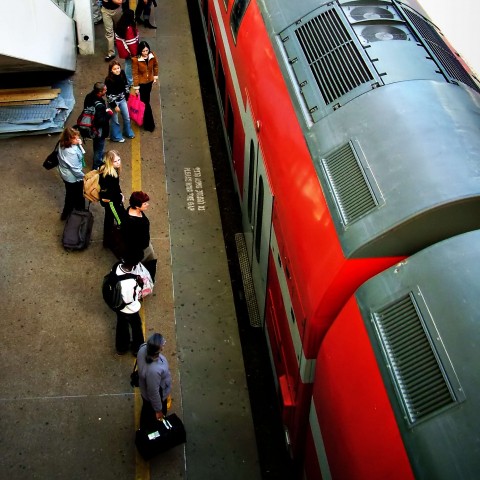
3- Three Sentences You Will Need When You Take a Bus
- ¿ Me puedes avisar cuando lleguemos al Museo del Prado? Translation: “ Could you let me know when we arrive to the Museo del Prado?”
- ¿ Dónde me bajo para visitar la catedral? Translation: “ Where do I get off to visit the cathedral?”
- ¿ Qué autobús tengo que coger para ir a Valencia? Translation: “ What bus do I need to take to get to Valencia?”
4. Seven Sentences You Might Need When Shopping

No matter what kind of trip you’re on, you’ll need to buy something at some point. It could be food, clothes, medicine…who knows. We’ve put together a few sentences you might need in order to buy something in Spain. These may be more advanced Spanish phrases for travel, but you can definitely master these with enough practice!
1- ¿Cuánto cuesta?
When we’re shopping, we sometimes need to ask about the price of a product, more often than not due to misplaced price tags. This is why asking “How much does this cost?” is such an important question to know. Obviously, the answer to this question is even more important. Here’s an example of how a conversation might go:
Example: A: Perdona, ¿cuánto cuesta esta chaqueta? B: Cuesta 35 (treinta y cinco) euros.
Translation: A: “Excuse me, how much does this jacket cost?” B: “It costs 35 euros.”
In case you skipped the simple conversation section in this article, we’ll remind you once more that if you want to know more about numbers in Spanish, you can check out our Numbers in Spanish article .
2- ¿Qué me recomiendas?
This question means, “What’s your recommendation?” and you might need to use it when you’re not sure what to get.
For example, one thing we’re really proud of in Spain is our jamón . You might want to try it when you visit Spain, but when you come to our supermarkets or restaurants and see all the different kinds we have, you might be confused.
In our example, because we’re asking for a specific recommendation, we’ll add a noun—the thing we’re interested in—after qué . This is optional except when what you’re referring to isn’t that obvious.
Example: A: Qué jamón me recomiendas? B: Este es buenísimo y no es muy caro.
Translation: A: “What ham do you recommend?” B: “This one is really good and it’s not too expensive.”

3- Quiero cambiar dólares a euros.
When traveling, you might need to exchange your currency for the local one, which in this case is the Euro. Specifically, the translation of this sentence is, “I want to exchange dollars for euros.”
For more information on talking about money or currency in Spanish, you might find it useful to check this vocabulary list of Words Related to Trade .
4- ¿Cómo puedo conseguir un descuento?
You might not be able to use this one as often as the other sentences on this list, depending on where you are, but it’s still good to know how to ask the question, “How can I get a discount?”
5- ¿Tienes esta camisa en otro color?
In case you see a shirt you like, but you can’t stop thinking that it would look better in a darker color, you might want to know how to ask ¿Tienes esta camisa en otro color? which means “Do you have this shirt in a different color?”
Other similar questions you might need to ask include asking for a different size. Here’s an example:
Example: A: Perdona, ¿tienes estos pantalones en una talla más grande? B: Lo siento, solo tenemos esta talla o una más pequeña.
Translation: A: “Excuse me, do you have these trousers in a bigger size?” B: “I’m sorry, we only have this size or a smaller one.”
6- ¿Se puede pagar con tarjeta?
You’ll never have to ask “Can I pay by card?” in a big supermarket, but it might be helpful if you’re buying something in a small store, or in a local market.

7- ¿Dónde hay un cajero?
In case the answer to the previous question is “No” and you currently don’t have any cash on you, you’re going to need to ask where the nearest ATM is. The way to ask this is ¿Dónde hay un cajero?
If you think you might have trouble understanding the possible answers to this question, keep reading this article!
5. Nine Sentences You Might Need in a Restaurant

When it comes to Spanish travel and tourism vocabulary, we think that restaurant words and phrases just about top the list.
In this section, we’ve included a few sentences you’ll need in a restaurant. However, if we started listing all the vocabulary you would need to order food, we would be here all night long, so this is why we recommend our video All Food and Restaurant Phrases You Need . In this video, Rosa will explain everything you need to know about food in general, and also about Spanish food.
1- Mesa para dos, por favor.
Unless you’re at a fast-food restaurant, normally one of the first things you’ll have to tell the waiter is how many people will be eating, so that they can pick the right table for you. This situation can take place in a few different ways.
For example, the waiter might ask you as soon as you walk in how many people there will be. There are a few ways they can ask you this question, but the one thing we know for sure is that it will include the word cuántos , which means “how many.” He could ask ¿Cuántos son? which means “How many are you?” or ¿Mesa para cuántos? which means “Table for how many?” among others. If you’re asked this question, you can just say the number, or the magic sentence in the title.
There’s a second way this could happen: the waiter might count how many people he sees before asking that question. For example, if he counts four people, he might directly ask: ¿Mesa para cuatro? , which means, “Table for four?” If he gets the number right, you can just reply Sí . If he gets it wrong, you can correct him with the right number.
Finally, the third way this situation could go. You could be faster than the waiter and say Mesa para dos, por favor , which means “Table for two, please.” We previously said this is a magic sentence; let us explain why. If you’re still nervous whenever you need to speak Spanish and you didn’t understand what the waiter said to you, they’ll completely understand if you just say these words. Just like that, you’re in! Now let’s get you ready for what comes right after that.
2- ¿Cuál es el menú del día?
It’s common for Spanish restaurants to have a special menu for each day . Before deciding what you want to order, you can ask them ¿Cuál es el menú del día? which means “What’s the menu of the day?”
If you don’t like the special menu, don’t worry, because they’ll always have more options on the regular menu.
3- Por favor, ¿me tomas nota?
It’s quite likely that the waiter will approach you after you’ve been deciding what to get for a while. But in case you’re getting hungry and the waiter hasn’t asked what you would like to eat yet, when you see him you can ask him Por favor, ¿me tomas nota? which translates to “Can you write down my order, please?”
4- ¿Qué van a tomar?
Once the waiter has approached your table, you’ll be asked what you would like to order. It’s common for waiters to use the formal usted instead of tú , so the sentence we’ve suggested, ¿Qué van a tomar? , uses that form.
Another similar question the waiter might ask you is: ¿Ya han decidido qué van a tomar? which means “Have you decided what you’re going to have?”
Notice that both examples are in the plural. If you were eating by yourself in the restaurant, the waiter would ask ¿Qué va a tomar? instead.

5- Yo tomaré…
Of course, if you’re eating in a restaurant, you need to know how to tell your waiter what you would like to eat. Here’s an example of how to order your food in Spanish.
Example: Yo tomaré las costillas de cerdo con ensalada. Translation: “I will have the pork ribs with salad.”
6- ¡Camarero/camarera!
If you need to call the waiter for any reason, unless you know his or her name, you’ll have to say “Waiter!” or “Waitress!” This is one of the many reasons why you should know how to say it in Spanish. If your server is a girl, you’ll have to say ¡camarera! , and if it’s a man, you’ll say ¡camarero! If you feel like that’s a bit too rude for you, you can also say Perdona , which means “Excuse me.” Here’s an example that we hope you won’t need:
Example: ¡Camarero! ¡Hay un pelo en mi sopa! Translation: “Waiter! There’s a hair in my soup!”
7- ¿Algo más?
This question means, “Anything else?” and might be asked after you’ve ordered your food and the waiter wants to make sure that you’ve finished.
The answer to this question, if you have in fact finished ordering, could be No, eso es todo , which means “No, that is all.” If you still want to order something else, you can of course say Sí , followed by your next order.
8- Tengo alergia a…
For people with allergies, it’s important to be able to let the waiter know about it. The way to say, “I’m allergic to…” is Tengo alergia a …
Example: Tengo alergia a los cacahuetes. Translation: “I’m allergic to peanuts.”
You might also want to ask if a specific dish contains an ingredient in particular.
Example: Perdona, ¿la crema de calabaza lleva lactosa? Translation: “Excuse me, does the pumpkin soup contain lactose?”
To be even safer, you can check Spanish Materials and Resources from Food Allergy Research & Education for some help.
9- La cuenta, ¿por favor?
The last sentence on this list is what you might need to say last, before you leave. As you might have guessed, this is how to ask for the bill. This sentence means “The bill, please?” and even though you could ask using a full sentence instead, this is all you’ll need.
6. Nine Sentences to Ask for and Give Directions
We’re sure you knew this section would come. After all, learning directions are some of the most essential travel phrases in learning Spanish and we don’t want you to get lost when you visit our beautiful country. But if you do, we want to help you find your way.
Here are some sentences you might need if you’re lost or can’t find your destination. Because these sentences have quite simple meanings, we don’t think you’re going to need anything but their translations.
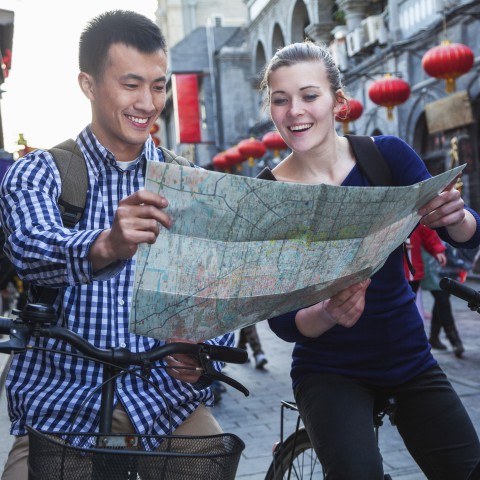
1- Estoy perdido.
Translation: “I’m lost.”
2- ¿Dónde está la estación?
Translation: “Where is the station?”
3- ¿Cómo se va a la Plaza Mayor?
Translation: “How can I get to the Main Square?”
4- ¿Dónde está el baño?
Translation: “Where is the bathroom?”
5- Está aquí mismo
Translation: “It’s right here.”
6- Está detrás de este edificio
Translation: “It’s behind this building.”
7- Ve/gira hacia la derecha
Translation: “Go/turn to the right.”
8- Ve/gira hacia la izquierda
Translation: “Go/turn to the left.”
9- Ve recto
Translation: “Go straight.”
7. Six Expressions You Might Need in Case of an Emergency
We really hope you never need to use any of these expressions, but they’re important and need to be included in this article. Just in case, here are some emergency expressions.
Translation: “Help!”
2- ¡Necesito ayuda!
Translation: “I need help!”
3- Llama a una ambulancia.
Translation: “Call an ambulance.”
4- ¿Hay algún médico?
Translation: “Is there any doctor?”
5- Llama al 112 (cien doce)
Translation: “Call 112 [the emergency number].”
6- He perdido la cartera/pasaporte.
Translation: “I’ve lost my wallet/passport.”
8. Five Flattery Phrases
Whenever you travel to a different country, locals love hearing that you’re having a good time on your trip and that you’re enjoying the country. If you want to criticize something, be careful and gentle, because as they say, you can criticize your own country as much as you want, but if a foreigner does it, they’re wrong. So if anyone asks you, try to focus on the positive side!
Here’s a few basic phrases you could use to express what you like about your trip, as well as a couple more you might need when you meet a local.
1- Me gustan los españoles.
Translation: “I like Spaniards.”
2- Me gusta la comida española.
Translation: “I like Spanish food.”
3- Me encanta España.
Translation: “I love Spain.”
4- Muy amable, gracias.
Translation: “Very kind, thank you.”
5- ¿Tienes Facebook o Instagram?
Translation: “Do you have Facebook or Instagram?”
9. Ten Useful Phrases to Go through Language Problems

Some of the most important Spanish travel phrases may be those that will help you overcome language barriers. So we want to have you covered in case you have trouble understanding someone or don’t feel too confident speaking Spanish. Just calm down and remember that you’re still learning and that we’re here to help you. The next few expressions are some of the most useful Spanish words for tourists, so pay attention.
1- ¿Hablas inglés?
Translation: “Do you speak English?”
2- No te entiendo.
Translation: “I can’t understand you.”

3- No lo sé.
Translation: “I don’t know.”
4- ¿Me lo puedes repetir?
Translation: “Could you repeat that?”
5- ¿Puedes hablar más despacio?
Translation: “Could you speak slower?”
6- No hablo español.
Translation: “I don’t speak Spanish.”
7- ¿Cómo se dice esto en español?
Translation: “How do you say this in Spanish?”
8- ¿Cómo se pronuncia esta palabra?
Translation: “How do you pronounce this word?”
9- Escríbelo, por favor.
Translation: “Write it down, please.”
10- ¿Lo puedes deletrear?
Translation: “Could you spell it?”
10. How SpanishPod101.com Can Help You Learn Spanish
Now that we’ve reached the end, we realize you’re probably thinking that these are too many expressions for you to learn straight away. We’re afraid you’re going to have to do some studying, but hey, we promise it’s going to be totally worth it! When you start learning a language, there’s nothing like the feeling of starting to understand and being understood. And we’re sure you see now that the travel phrases in Spanish language learning are so useful!
At SpanishPod101.com, there’s so much more you can learn, no matter what your level is. And now, with our guide of Spanish phrases for travelers and our Don’t Travel Without Knowing These Top 10 Verbs list , you can go anywhere in Spain. Be sure to check out all of our resources , so that you can master the language and culture while having fun!
Or sign up using Facebook
Got an account? Sign in here

How To Say ‘Thank you’ in Spanish

How to Say “Hello” in Spanish

How to Say I Love You in Spanish – Romantic Word List

Top 4 Ways That Peninsular Spanish And Mexican Spanish Are Different

Advanced Spanish Phrases for Studying and Working

Intermediate Spanish Phrases for Everyday Conversations
How to celebrate april fools’ day in spanish.
- Forum Spotlight
- Scheduled Maintenance
- Memoirs from Xalapa Mexico
- Advanced Spanish
- Spanish Alphabet
- Spanish Grammar
- Spanish Lessons
- Spanish Online
- Spanish Phrases
- Spanish Podcasts
- Spanish Words
- Media Coverage
- Feature Spotlight
- Spanish Holidays
- Spanish Translation
- Success Stories
- Teaching Spanish
- Team SpanishPod101
- Word of the Day
- Immigration, Visas
Copyright © 2024 Innovative Language Learning. All rights reserved. SpanishPod101.com Privacy Policy | Terms of Use . This site is protected by reCAPTCHA and the Google Privacy Policy and Terms of Service apply.

- Books / Audiobooks
- Learning Method
- Spanish Culture
- Spanish Grammar
- Spanish Travel
- Spanish Vocabulary and Expressions
- Study Guide
50 Essential Spanish Phrases for Travelers
0 Comments
January 10, 2018
Follow Us Now
Your bags are packed and everything’s all set. But wait--before you leave for a Spanish-speaking destination, make sure you’re armed and ready with this list of the very basic Spanish travel phrases.
Just a few essential phrases are enough to tide you over during your trip, so make sure to have this list handy or better yet, memorize them! Don’t worry, it’s super easy, and the pronunciation won’t trip you up at all.
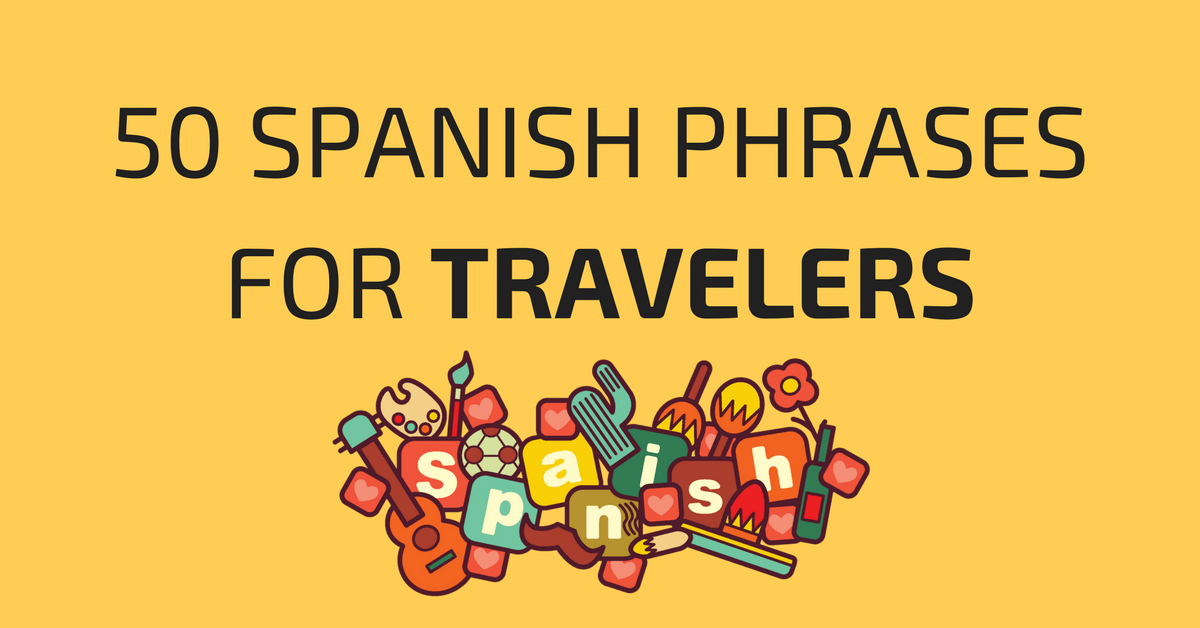
Get this list in PDF format
You can also download this list in a printer-friendly PDF version. Simply click the download button below.
So are you ready?
Here is your list!
Common Spanish Travel Phrases

there you have it---your list of the most common Spanish travel phrases.
You can also read some related articles here:
[Quiz] Do you know these common Spanish phrases?
50 Common Spanish Phrases
For a more complete list of Spanish phrases, grab your copy of the Spanish Phrasebook by My Daily Spanish! It’s got all the phrases you need to survive---and even thrive---in a Spanish-speaking environment.
Make your travel hassle-free with this e-book that covers all possible scenarios while traveling in a Spanish-speaking country. Check it out below!
About the author
Janey is a fan of different languages and studied Spanish, German, Mandarin, and Japanese in college. She has now added French into the mix, though English will always be her first love. She loves reading anything (including product labels).
Session expired
Please log in again. The login page will open in a new tab. After logging in you can close it and return to this page.
- Skip to main content

- ALL OUR SPANISH CLASSES
- Group Classes in Barcelona
- Private Spanish Lessons in Barcelona
- Online Spanish Classes in Barcelona
- Private Group Spanish Classes in Barcelona
- Evening & Weekend Spanish Classes in Barcelona
- Spanish Crash Course for Busy Travellers in Barcelona
- Spanish Classes for Families and Kids in Barcelona
- TEFL Course Certification in Barcelona
- Online TEFL Course Certification
- Spanish School in Buenos Aires
- Spanish School in Santiago de Chile
- Spanish School in Lima
- Spanish School in Cuzco
- Spanish School in Bogota
- Spanish School in Medellin
- Spanish School in Cartagena
- Spanish School in Mexico City DF
- Spanish School in Madrid
- Spanish School in Valencia
- Spanish School in Barcelona
- Spanish School in Toronto
- Spanish School in Montreal
- Homestay Accommodations in Barcelona
- Private Apartment in Barcelona
- Student Residence in Barcelona
- Airport Transfer in Barcelona
- Why Learn Spanish Barcelona
- Our Team in Barcelona
- FIND THE CLASS FOR YOU!
- READY TO GET STARTED?
- REGISTER NOW
- Barcelona, Spain
June 17, 2021 · Learn Spanish , travel
Complete Travel Vocabulary in Spanish
Send on WhatsApp
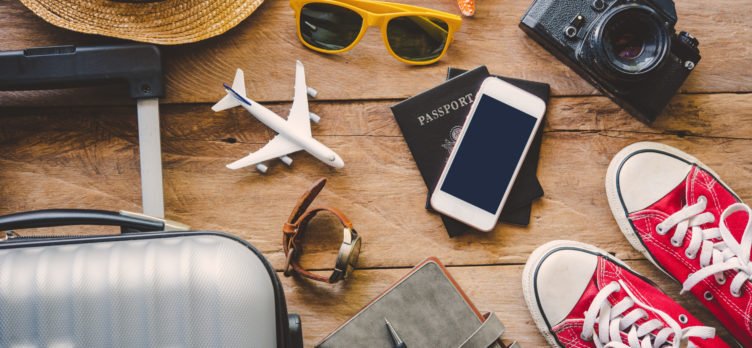
Since we want you to make the most out of your Spanish classes in Barcelona , you could use this new feature as a tool to keep practicing what you are learning in your regular classes at Vamos Academy Barcelona
So, if you are planning to keep travelling to other Spanish-speaking countries like Argentina , Peru , Mexico or Chile , or if your want to improve your communication skills, this new list will provide you with everything you need to know related to travel, customs, planes and tickets! In this travel vocabulary blog! Fasten your seatbelt Dorothy, ’cause Kansas is going bye-bye.
Travel Vocab in Spanish:
- abrocharse (verb) / to fasten
- la aduana (noun) / customs
- el aduanero, la aduanera (noun) / customs agent
- el aeropuerto (noun) / airport
- la agencia de viajes (noun) / travel agency
- el agente de viajes, la agente de viajes (noun) / (travel) agent
- aterrizar (verb) / to land
- el auxiliar de vuelo, la auxiliar de vuelo / flight attendant
- el avión (noun) / airplane, plane
- el barco (noun) / boat, ship
- el boleto (noun) / ticket
- el boleto de ida y vuelta (noun) / round-trip ticket
- el bote (noun) / small boat
- la casa de cambio (noun) / currency exchange
- la casa rodante (noun) / camper
- el cinturón de seguridad (noun) / seatbelt
- manejar (verb) / to drive
- desabrocharse (verb) / to unfasten
- descansar (verb) / to rest, to take a break
- deshacer la valija (verb) / to unpack
- despegar (verb) / to take off
- el equipaje (noun) / baggage, luggage
- la escala (noun) / stopover
- la estación de tren (noun) / train station
- el estacionamiento (noun) / parking, parking lot
- estacionar (verb) / to park
- el tren (noun) / train
- la foto (noun) / photo
- el guía, la guía (noun) / guide
- la guía de papel (noun) / guidebook
- la habitación (noun) / hotel room
- la habitación doble (noun) / double room
- la habitación individual (noun) / single room
- el lago (noun) / lake
- llevar (verb) / to carry, to take
- el lugar de interés (noun) / place of interest
- la valija (noun) / suitcase
- la oficina de turismo (noun) / tourist office
- el pasajero, la pasajera (noun) / passenger
- el pasaporte (noun) / passport
- la pensión (noun) / inexpensive lodging, hostel
- el piloto, la piloto (noun) / pilot
- procedente de (expr.) / arriving from
- la puerta (noun) / gate
- la reserva (noun) / reservation
- el retraso (noun) / delay
- sin escala (adj) / nonstop
- sólo de ida (adj) / one way
- la tarjeta de embarque (noun) / boarding pass
- la terminal de equipaje (noun) / baggage claim
- el transbordador (noun) / ferry
- el tren de pasajeros (noun) / passenger train
- el turista, la turista (noun) / tourist
- las vacaciones (noun) / vacation
- viajar (verb) / to travel
- el viaje (noun) / trip, voyage
- el viajero, la viajera (noun) / traveller
- visitar (verb) / to visit
- el vuelo (noun) / flight
- la vuelta (noun) / return trip
Would you like to take Spanish Classes? We can help you! We have in-person lessons and online Spanish classes
Stay in the Know with Vamos Spanish Academy!
Sign up for our newsletter to receive:
- Find out all the best places to visit in Barcelona
- Keep up your Spanish with useful words and phrases
- Be the first to know about deals and discounts for classes in Spanish and other languages
- First Name *
- Last Name *
- Email This field is for validation purposes and should be left unchanged.
Share this post!
Join the conversation on social:
RELATED POSTS
We have new events and updates every week! Practice your Spanish, learn about Buenos Aires, or prepare for your trip to South America by browsing our blog.
Spanish Perfect Tense
In Spanish, the present perfect tense -also called “pretérito perfecto compuesto”- is used to…
The Best Spanish Vocabulary for the Workplace
So let me guess: you work with Spanish speaking people and need to learn…
Travel with Companion Animals to Spanish Speaking Countries. Vocabulary and Guide
Companion animals are part of the family. We love them, treasure them, take care…
MEET VAMOS SPANISH
Spanish classes offered:.
- Small Group Classes
- Private Classes
- 3-hr Crash Course
- ...and more!
HIGHLY RATED & REVIEWED

TripAdvisor
HALL OF FAME
I took a four-week course at Vamos and was delighted with the experience. The course is conversation-intensive, which was incredibly useful given that speaking tends to be the most difficult skill.
Vamos Spanish Academy offers an outstanding educational experience. I spent a total of 12 exceptional weeks at the school.
I can also recommend highly the home stay feature of the course. I stayed with an Argentinian in the next suburb who only spoke Spanish, but who was very patient with me as I improved.
My Spanish improves by the hour! The staff and academic director do everything in their power to make your stay as comfortable as possible.
This site uses our own & third-party cookies to improve your experience and our services through analytics. By continuing to browse this site you are agreeing to our use of cookies. Visit our privacy policy .
By continuing to browse, you agree to our use of cookies on this site. Visit our privacy policy .
No cookies, please.
Talk About Travel in Spanish
¡Hola! Learn how to talk about travel ! Specifically, learn how to do the following in Spanish:
• talk about travel plans
• talk about the days of the week
Let's start off with the vocab words in these lessons!
Days of the Week in Spanish
In these lessons, you learn the seven days of the week in Spanish!
Capitalization Tip
The days of the week are not capitalized in Spanish.
Hoy es l unes. ( Today is Monday. )
Hoy es L unes.
You also learn the names of the following vehicles in these lessons!
How Do You Travel?
You can combine any vehicle with the preposition en to talk about how you travel . Take a look!
Talking about Time
These lessons also use these useful words for talking about time in Spanish.
Remember that some words that end in a are masculine , such as el día .
In this skill, you learn how to use the verbs viajar ( to travel ), llegar ( to arrive ), and salir ( to leave ) to talk about travel . Let's take a look at the conjugation of these verbs in the present !
Regular -Ar Verbs
Viajar and llegar are both regular -ar verbs in the present tense . To conjugate a regular -ar verb, remove the infinitive ending ( -ar ) and add the ending that matches the subject. You can find these endings in the table below.
Present Tense Endings for -Ar Verbs
Irregular Yo Verbs
Salir is a regular -ir verb except for the yo form, which is irregular.
Conjugation Tip
- The present yo form of salir has a g in it: sal g o
Here are some of the phrases used in these lessons!
Quiz Yourself!
Want more practice with the vocabulary you learned in these lessons? Click here!
Spanish Conversation
Let's put the grammar and vocab from above to the test in the following example of a conversation in Spanish.
Want to learn more about how to talk about travel in Spanish? Check out the following articles!
• Spanish Days of the Week
• Spanish Present Tense Forms
• Plan a Trip to a Spanish-Speaking Country
Making educational experiences better for everyone.
Immersive learning for 25 languages
Marketplace for millions of educator-created resources
Fast, easy, reliable language certification
Fun educational games for kids
Comprehensive K-12 personalized learning
Trusted tutors for 300+ subjects
35,000+ worksheets, games, and lesson plans
Adaptive learning for English vocabulary

IMAGES
VIDEO
COMMENTS
100+ Spanish Travel Vocabulary Words for Latin America. If you plan to visit Latin America on vacation, knowing Spanish travel vocabulary is essential to make your experience safe, smooth, and pleasant. Latin American Spanish is rich and diverse. While there's a lot of (regional vocabulary) in Latin America, many words are considered neutral ...
Spanish-speaking countries are especially polite and greeting people correctly will go a long way towards endearing you to the locals, be they friends, people you meet in shops or on the street. #1 ¡Hola! - Hello. (O-la) #2 ¡Buenos días! - Good morning! ( BWAY-nos DEE-as) #3 ¡Buenas tardes! - Good afternoon/good evening!
4. la maleta (the suitcase, the bag) I think this is one of those funny words every language has. If you use it in the singular, it is translated as "suitcase.". Each individual bag you have is a maleta. However, if you use it in the plural, you can translate it as "luggage" or "baggage.".
Spanish for Visiting the City & Asking for Directions. One of the biggest challenges you may face is communicating with native speakers when visiting the city or a tourist attraction. Here are some of the most common Spanish phrases for travel that you may need in this situation: Con permiso / Permiso - Excuse me.
Other essential Spanish travel vocabulary includes ordering food and drinks at restaurants or coffeshops. "La cuenta, por favor" means "The bill, please" and is a polite way to ask for your check at a restaurant. "Una cerveza, por favor" means "A beer, please" and is a simple way to order a drink. With a few basic phrases under ...
Common Phrases For Everyday Use. Mastering common phrases in basic Spanish can make your travels through Spanish-speaking countries a breeze. Here are some useful expressions to add to your language toolkit: "Quiero" (I want) - Use this phrase when expressing a desire or need, like "Quiero agua" for "I want water."
4. Spanish Dict - although Google Translate is an excellent tool, we suggest this app for traveling through Spanish-speaking countries. 5. El Tenedor (The Fork) - the app has information about over 30,000 restaurants in Spain. You can discover what is around your location, choose the preferred cuisine and book a table.
Memorize these Spanish travel phrases before visiting a Spanish-speaking country for more comfortable, stress-free interactions in Spanish. If you are serious about learning Spanish, then I recommend reading our 119-page Ultimate Guide to Spanish , which includes 10 principles behind learning Spanish fast, strategies to learn vocabulary and ...
12 Spanish travel phrases for the hotel. Busco un hotel . — I'm looking for a hotel. Yo necesito un hotel / un cuarto / un cuarto con baño. — I need a hotel / a room / a room with a bathroom. Una habitación para dos personas. — A room for two people. Yo tengo una reserva a nombre de…. — I have a reservation under the name of….
Un balcón — A balcony. La terraza — The rooftop / terrace. El gimnasio — The gym. La playa — The beach. El vestíbulo — The lobby. 5. Spanish Travel Phrases for the Restaurant. Probably the most useful travel phrases you will need are the ones you would use in a restaurant.
Tarjeta de crédito (tar-heh-tah deh kreh-dee-toh) Cheap. Barato (bah-rah-toh) Expensive. Caro (Kah-roh) These are some of the common Spanish travel vocabulary words that will help you get along on your trip to Spain or Latin America. If you want to learn Spanish via a private Spanish tutor. Here is a recommendation for you.
Here is some useful vocabulary to substitute into these phrases: El baño — the bathroom. Un tren — a train. La calle — the street. Un cajero automático — an ATM. And lastly some practical vocab to help you understand the helpful directions people give you: A la derecha — to the right. A la izquierda — to the left.
Viajar is the Spanish word for 'travel'. If you're planning a trip to a Spanish-speaking country, you should learn some basic expressions and words that can help you get along in different situations. On this page, I've gathered some of our best resources to make your travels easier and more enjoyable.
Hi - Hola. You can use this any time of the day as it means "Hi" or "Hello", but people usually say this and then say one of the other greeting phrases below depending on the time of the day. So, for example, you might say, "Hola, Buenos días.". Good morning. Buenos días. This is normally used in the morning hours before 12 noon.
A brief history of Spanish. Originating in the Castile region of Spain, Spanish (español) is also known as Castilian (castellano). Spanish evolved from several dialects of Vulgar Latin in Iberia after the collapse of the Western Roman Empire in the 5th century. Spanish began to spread beyond mainland Europe in the early 16th century when the ...
7- No hablo español. If you don't feel comfortable enough speaking Spanish yet, it might be useful for you to be able to say "I don't speak Spanish.". If you want to apologize for not speaking Spanish, remember that you can combine it with the previous expression on the list: Lo siento, no hablo español.
For a more complete list of Spanish phrases, grab your copy of the Spanish Phrasebook by My Daily Spanish! It's got all the phrases you need to survive---and even thrive---in a Spanish-speaking environment. Make your travel hassle-free with this e-book that covers all possible scenarios while traveling in a Spanish-speaking country.
Complete Travel Vocabulary in Spanish. Since we want you to make the most out of your Spanish classes in Barcelona, you could use this new feature as a tool to keep practicing what you are learning in your regular classes at Vamos Academy Barcelona. So, if you are planning to keep travelling to other Spanish-speaking countries like Argentina ...
right now. hacer la maleta. to pack one's suitcase/luggage. hacer un viaje. to take a trip. tarde. late. Planes, trains, and automobile vocabulary Learn with flashcards, games, and more — for free.
sin productos animales - without animal products. sin azúcar - without sugar. 6. Spanish for travelers who want to have fun. The final - and probably most important - travel phrases in a Spanish-speaking country are those related to fun. The holiday is not over until you go to a fiesta and drink a few sangrias.
Vocabulary. Let's start off with the vocab words in these lessons! Days of the Week in Spanish. In these lessons, you learn the seven days of the week in Spanish! Spanish ... Want to learn more about how to talk about travel in Spanish? Check out the following articles! • Spanish Days of the Week • Spanish Present Tense Forms